Business Now 2026
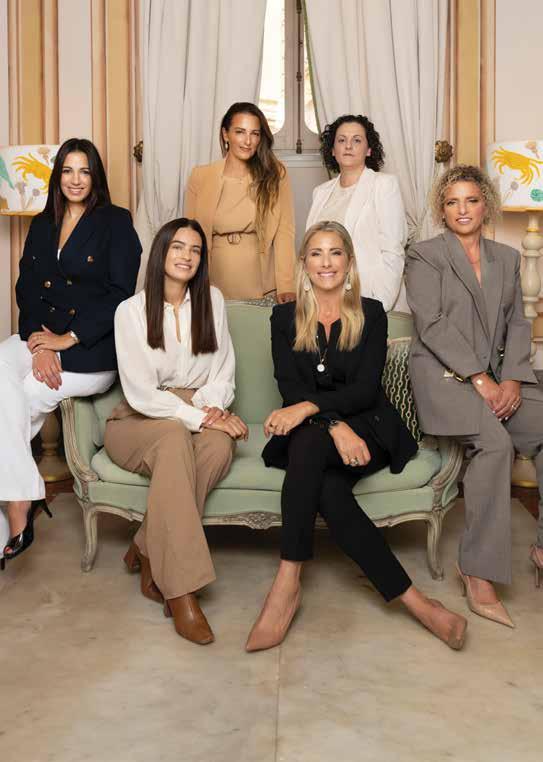



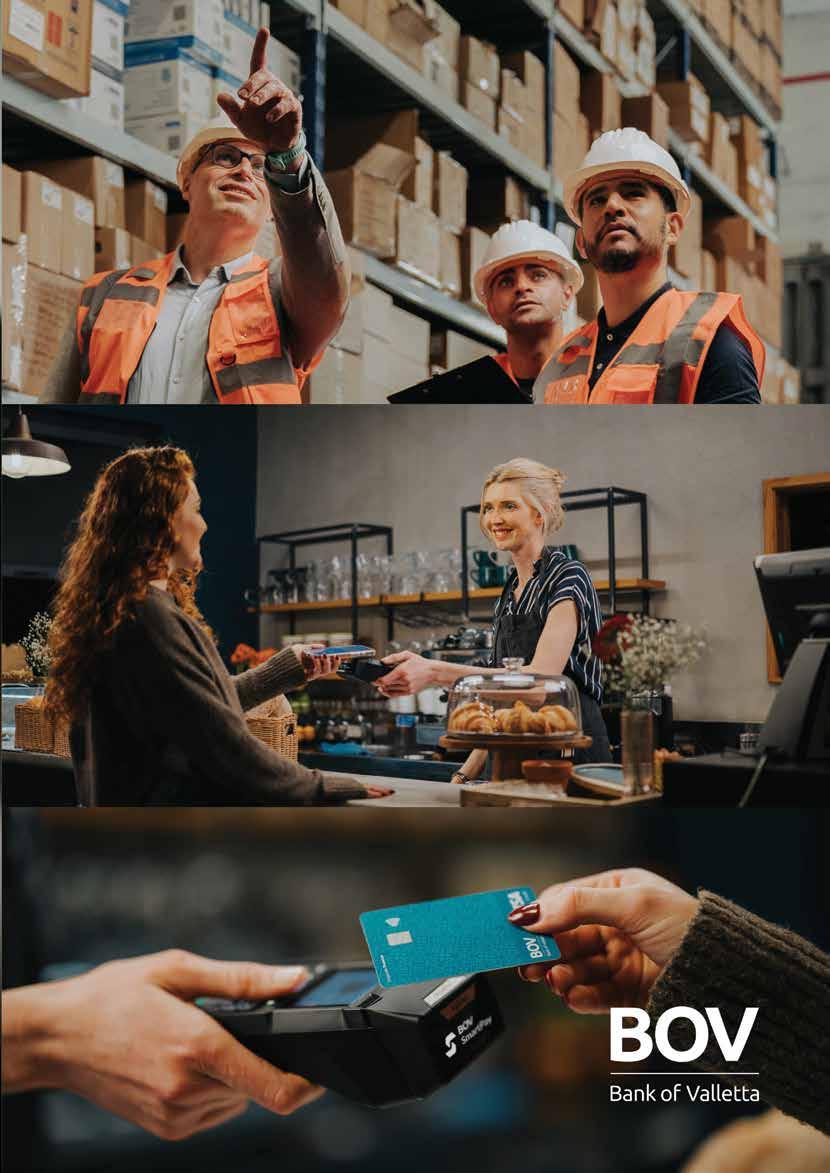



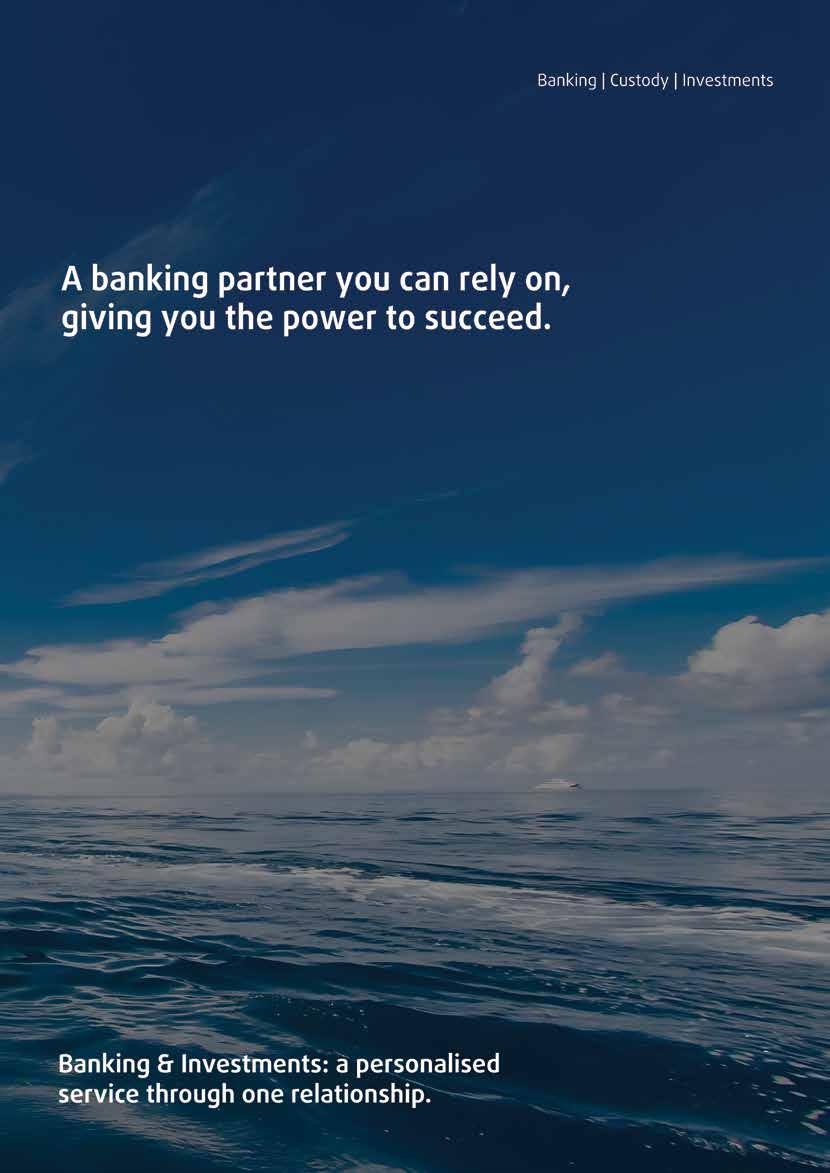

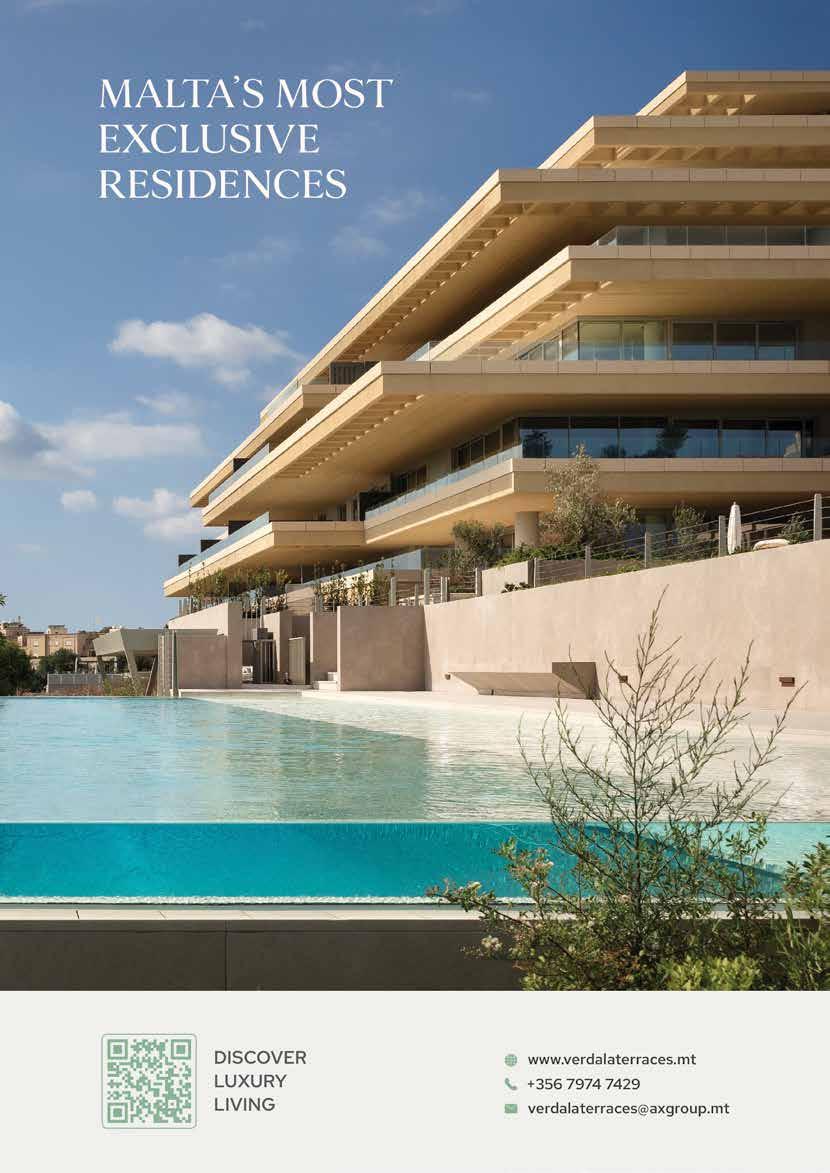



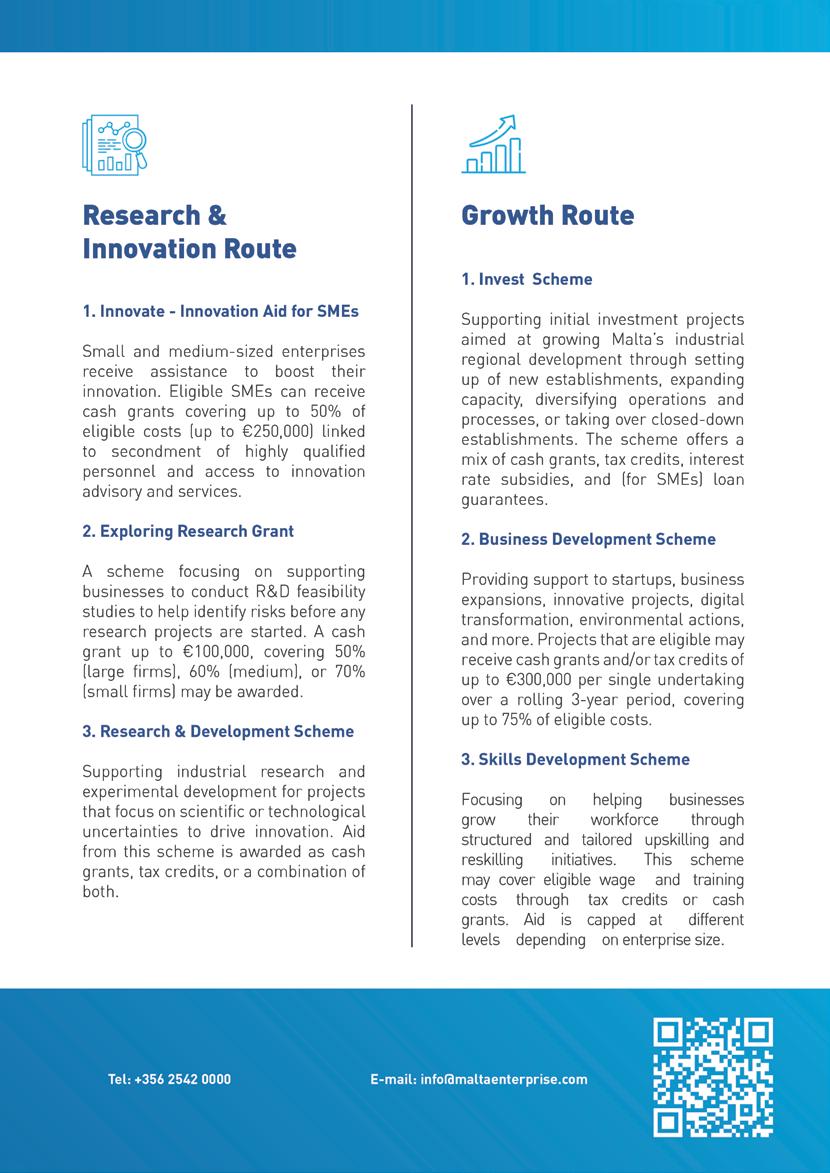

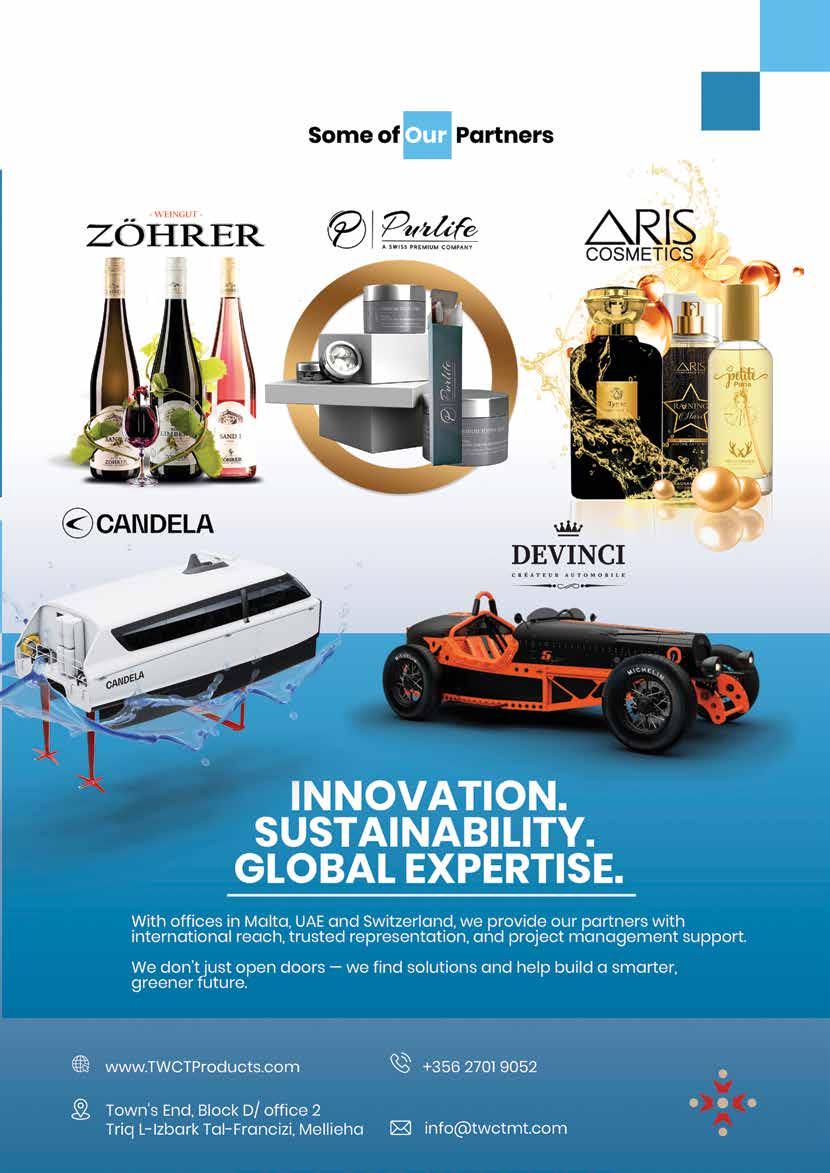

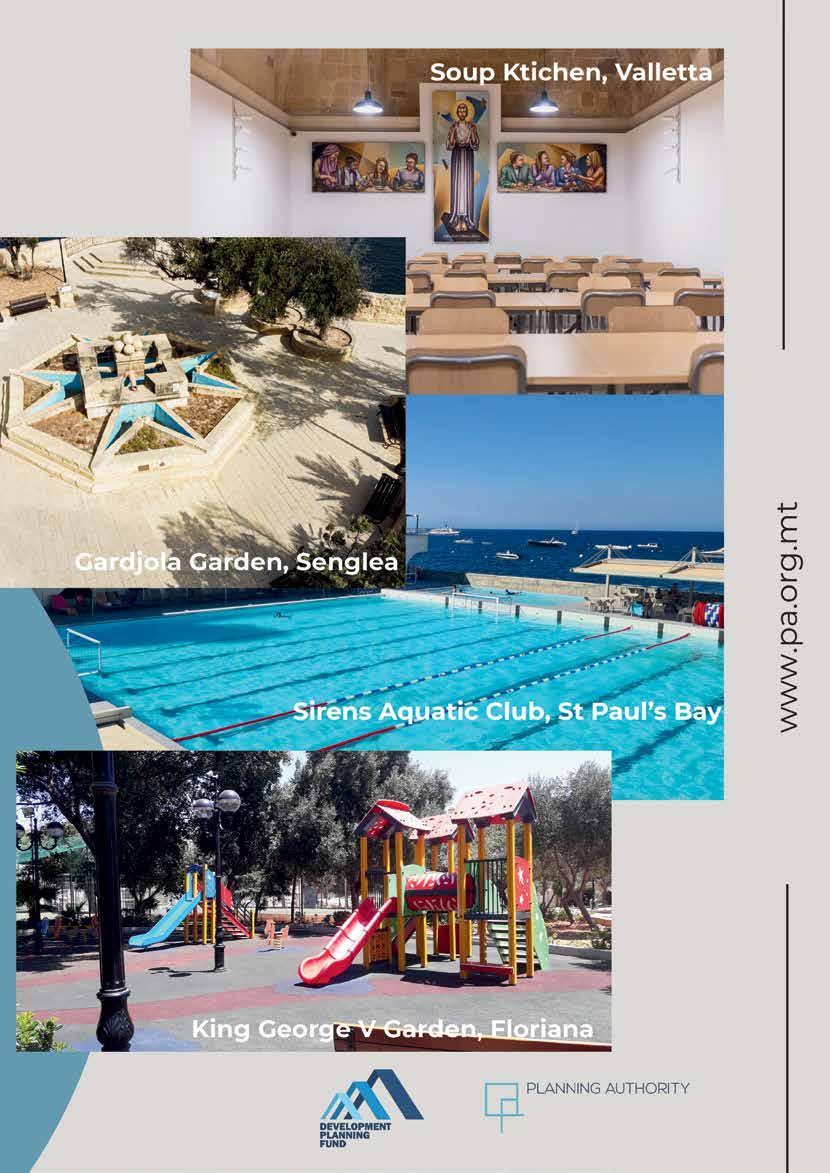




















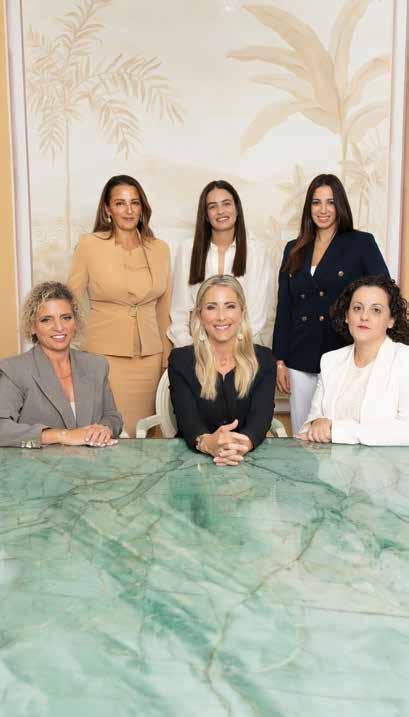
EMPATHY, BALANCE AND RESILIENCE: STORIES AND STRATEGIES FROM MALTA’S FEMALE LEADERS
Sarah Muscat Azzopardi speaks with some of Malta’s leading women in business, exploring their stories and career journeys, their views on strategy and industry trends, and their reflections on gender and leadership.
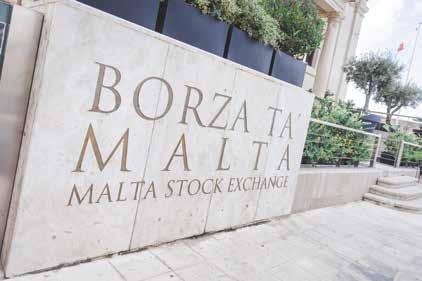
MALTA’S BOND BOOM: WHY MORE COMPANIES ARE TURNING TO THE PUBLIC MARKET
As more companies look beyond traditional financing to source growth capital, Malta is set to see a record figure for bond issues throughout 2025. Ramona Depares delves into how this is becoming an intrinsic part of many organisations’ expansion strategy, and the implications on the market.
36
HOW MALTA’S TOP CHEFS ARE REDEFINING THE ISLAND’S GASTRONOMIC IDENTITY
Leading local chefs talk to Sarah Muscat Azzopardi about hidden local gems, their favourite dining spots and the exceptional native ingredients that are positioning Malta as a premier destination for the discerning palate.
62
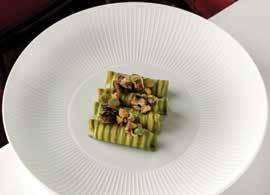
Malta’s Most Beautiful Businesses
CREATING STILLNESS: A LEGACY REIMAGINED AT THE VERDALA WELLNESS HOTEL
Delving into the driving force behind one of Malta’s most ambitious architectural rebirths, Sarah Muscat Azzopardi meets Denise and Claire Xuereb, to discover the monumental task of transforming the iconic Grand Hotel Verdala.

Interview
A SILENT DIALOGUE WITH HISTORY: PREVARTI’S QUEST TO PRESERVE MALTA’S PAST
Sarah Muscat Azzopardi sits down with Prevarti Founder Pierre Bugeja to discover his impressive journey from solo practitioner to leading a state-of-the-art laboratory – as well as the delicate balance of preserving the past while building a business for the future.
88
Interview
WHY GOING UNDERGROUND COULD BE MALTA’S WAY FORWARD
Dean Muscat speaks with architect and structural engineer
Dr Konrad Xuereb about the vision, the research and the roadblocks standing in the way of Malta’s metro future.
120


A LABOUR OF LOVE: THE TIMELESS CRAFT OF SALT HARVESTING AT GOZO’S XWEJNI SALT PANS
Edward Bonello pays a visit to the Cini family, who have been tending to their salt pans for at least five generations, as visitors flock to their iconic cave shop overlooking the vast Mediterranean, to buy their uniquely authentic sea salt.
128
THE MONUMENTAL MUNDANE: HOW MARIAM DE GIORGIO IS REDEFINING DOMESTIC ART
Sam Vassallo speaks to Maltese artist Mariam de Giorgio about her thriving professional practice built on the philosophy that the most resonant stories are found in the everyday.
132

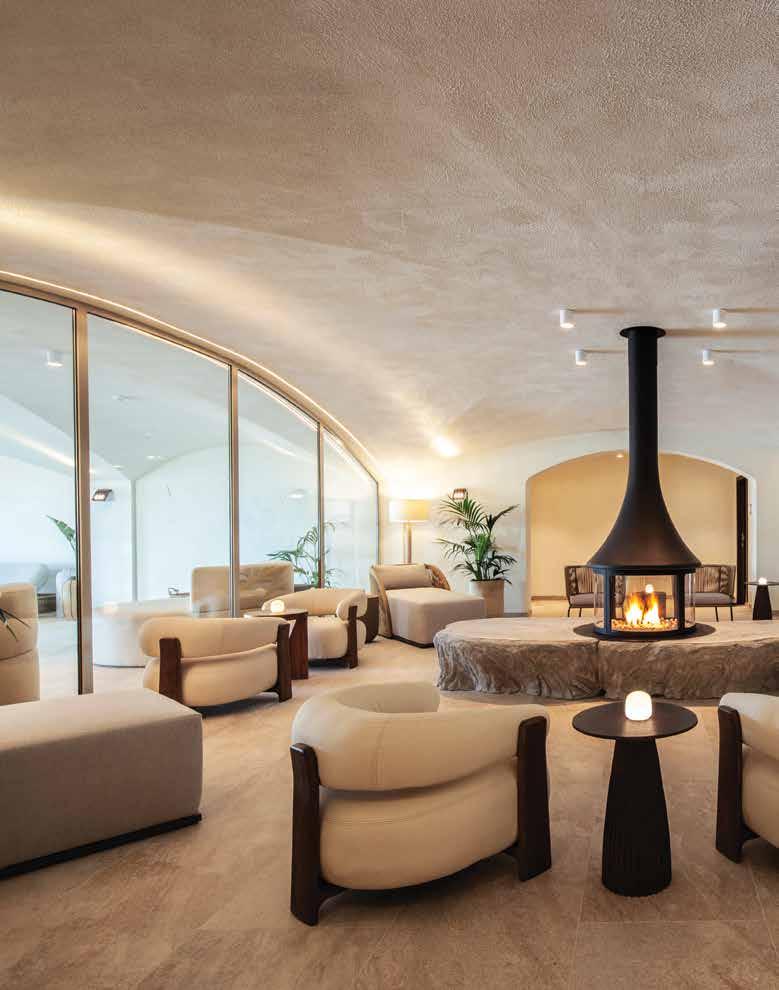
IN THIS EDITION OF BUSINESS NOW, WE DELVE INTO MALTA’S DISTINCTIVE BUSINESS ENVIRONMENT, gathering insights from prominent industry leaders to analyse current trends and forecast what’s next for the local economy.
We begin with our cover story, featuring six leading women in business and leadership. They share their professional journeys, the impact of their roles, and their perspectives on everything from industry trends to achieving a healthy work-life balance.

We also present an in-depth story on how local companies are increasingly turning to the Malta Stock Exchange to secure capital for growth through bond issues, a trend that signals growing investor confidence and a maturing of our capital markets. Further in, we provide some background on what international architect and structural engineer Dr Konrad Xuereb argues: that a long-term vision for a mass transport system is the only way to propel Malta towards a quality-driven future.
Elsewhere, we interview Pierre Bugeja, Founder and Director of Prevarti, who, 20 years ago, merged business with art and conservation to cater to a niche market. Then, our Industry Greats feature highlights the Cini family of Xwejni Salt Pans in Gozo – a decades-old, family business lineage that is uniquely Maltese.
This issue also blends business with leisure, as we explore Malta’s most beautiful businesses, with the new Verdala Wellness five-star hotel opening in Rabat, and leading local chefs discuss their favourite dishes. Finally, our creative exploration culminates in an inspiring chat with artist Mariam de Giorgio.
Enjoy the issue,
Sarah Muscat Azzopardi
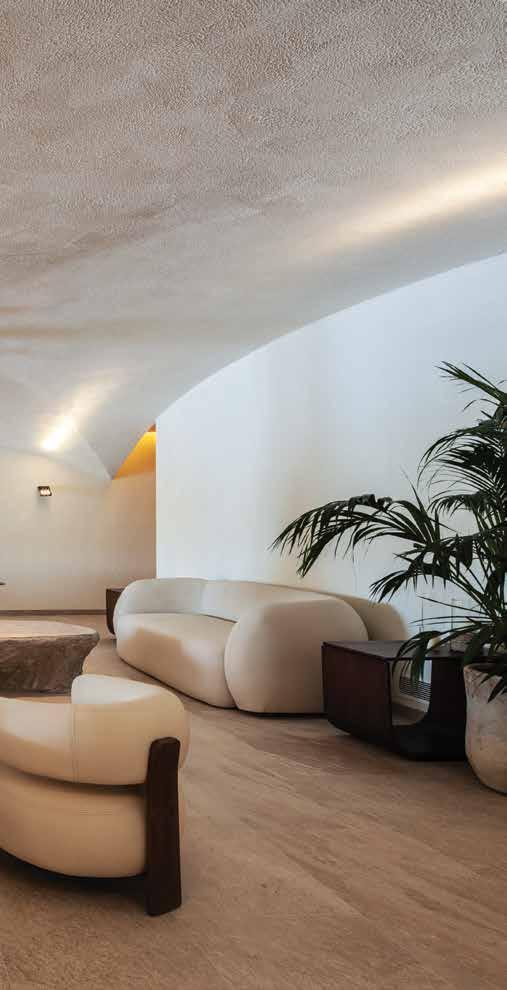
PUBLISHER
Content House
Quad Central, Q2, Level 2, Central Business District, CBD 1040 Tel: 2132 0713 info@contenthouse.mt www.contenthouse.mt
EDITOR
Sarah Muscat Azzopardi
HEAD OF SALES & BUSINESS DEVELOPMENT
Marie Claire Camilleri
OPERATIONS AND CLIENT RELATIONSHIP MANAGER
Sue Ann Pisani
CREATIVE DIRECTOR & DESIGN
Nicholas Cutajar
COVER PHOTO
Bernard Polidano – Shot on location at Palazzo Parisio
FOLLOW US ON
Content House would like to thank all the protagonists, contributors, partners, advertisers, and the creative team that have made this publication a success.
Articles appearing in this publication do not necessarily reflect the views of Content House. All rights reserved. Reproduction in whole or in part without written permission of the publishers is strictly prohibited.
Business Now is the largest business magazine of its kind, published by Content House, one of Malta’s largest media organisations. Business Now Magazine is the sister brand of BusinessNow.mt, Malta’s fastest-growing business news portal. This publication is distributed to leading companies and businesses operating in different sectors including those in the services sector, manufacturing, retail, ICT and software development, importation, shipping and freight, recruitment, accountancy and audit, corporate and legal, communications, new technology, and many more.
Business Now’s exclusive distribution network also reaches leading CEOs and business leaders. The business magazine is also distributed to creative and marketing agencies, Government ministries, departments and entities, embassies and consulates, banks, and architecture firms, as well as to car showrooms, business centres and yacht marinas. Beyond the free distribution network, Business Now is also available at leading newsagents around Malta.


Sarah Muscat Azzopardi speaks with some of Malta’s leading women in business, exploring their stories and career journeys, their views on strategy and industry trends, and their reflections on gender and leadership.
‘I see my leadership, especially as a female leader, as a pivotal force driving this organisational bridge between past and future.’
Natalie Briffa Farrugia is the Chairperson of Vassallo Group, a company with a strong presence in many sectors. Before taking on her current role, Natalie was CEO of CareMalta Group, the largest operator of long-term care services for older persons in Malta. In 2018, she was honoured as Malta Businesswoman of the Year.

“While I spent most of the summers of my youth working in the family business, the defining moments of my career came from working outside of it,” begins Natalie, reflecting on a formative period when she took up voluntary work after graduating, experiencing the professional world without the family comforts she had been accustomed to. “It taught me that validation isn’t simply inherited,” she shares.
Later, her involvement with the European Association of Homes and Services for the Ageing (EAHSA), and the opportunity to chair a non-family structure there further cemented this lesson: “these two distinct realities define who I am today.”
Natalie also credits Vassallo Group’s value-driven definition of success as her guiding light, both within her past career in the care industry and her present work as Chairperson of the group.
“This value-centric approach is the basis of all decision-making
across our sectors. I believe my leadership is distinguished by a focus on wisdom over knowledge,” she continues, describing wisdom as that which is cultivated through time and reflective practice, allowing you to rise above the pressures of the rat race and the illusion of success that can consume the business world.
Having served as the group’s Chairperson for over three years, Natalie’s role positions her as a bridge between a rich founding legacy established by her father and the company’s transition into the future. “Preparing for the future involves grounding ourselves in our non-negotiable founding principles while making the best choices in the present. I see my leadership, especially as a female leader, as a pivotal force driving this organisational bridge between past and future,” she says.
Her ability to take a step back and see the big picture is also aided by her role as a female leader, Natalie believes. “Running a
business makes it easy to focus exclusively on growth, and that focus is necessary. Yet, while we remain ambitious, we must also be patient enough to stop, think and question our decisions. Being a woman gives me an inherently different perspective, a key contribution to the group. I represent diversity and the other side of the coin, which allows us to question and view things from a vital new angle,” she maintains.
Coping with the demands of her role is no mean feat, yet Natalie describes her dedication to personal health, wellness and quality of life as being rooted in a commitment to both the physical and the spiritual. “These qualities are fundamental to who I am. I begin each day by cultivating appreciation and gratitude, which serves as an important psychological foundation for handling the day’s challenges,” she says.
Expressing her admiration for women who successfully balance demanding careers and family life, Natalie continues, “it’s a genuine blessing to witness mothers – including those yearning to embrace motherhood or expecting a child – who remain ambitious and deeply involved in the professional world. Having experienced this balance myself, I’m glad I gave equal importance to both.”
And while there is no ‘perfect career success’ or ‘perfect motherhood’, she maintains, Natalie is adamant that women should not have to choose between the two. “I see mothers excelling in senior roles all around me, successfully evolving their careers without compromise. Motherhood and career can, and should, happen together. It may be difficult, but it is certainly possible. Since the value of life is incomparable, we must not compromise it. We need more women at work, and we need more mothers in leadership.”
‘Wherever I am, I try to challenge both myself and those around me to push boundaries and achieve more.’
Claire Xuereb is Director of Hospitality and Care at AX Group, overseeing a distinguished portfolio of hotels and restaurants. Her efforts have been recognised with the Gold Award for Leader in Quality Tourism and the Bronze Award for Female Entrepreneur of the Year at the Malta Business Awards in 2023.
Looking back on her impressive journey, Claire describes taking over her first hotel – The Victoria Hotel – at the age of 24, as the single most pivotal moment that defined her career path. “At the time I felt I needed more time,” she says candidly, “but that same year, we quadrupled our profits. It was the greatest boost of confidence I could have to start my career.”
Back then, she admits, her biggest professional challenge was being young and female. “There were very few women in leadership roles; I only recall one female General Manager, and all were highly experienced,” Claire reveals, yet while she may have been the youngest in the industry, her real challenge was not so much with the industry itself, but within the organisation: leading a company that had been established long before her, with long-standing managers who were set in their ways.
“It often felt like my word against what was considered the norm. But I have never been satisfied with the norm. Wherever I am, I try to challenge both myself and those around me to push boundaries and achieve more,” she says, showing her characteristic grit.
Building on her strengths, she attributes her success to the ability to seize opportunities, uncover market gaps and create new needs that drive innovation. As AX Group continues to navigate an evolving market, Claire believes that adaptation is essential, “because if you fail to adapt, you inevitably fall behind,” but takes it a step further, arguing, “it is not about chasing specific trends, but about continuously identifying gaps: what is rising, what is declining and how we can position ourselves not only to fill those gaps but to create new opportunities.”
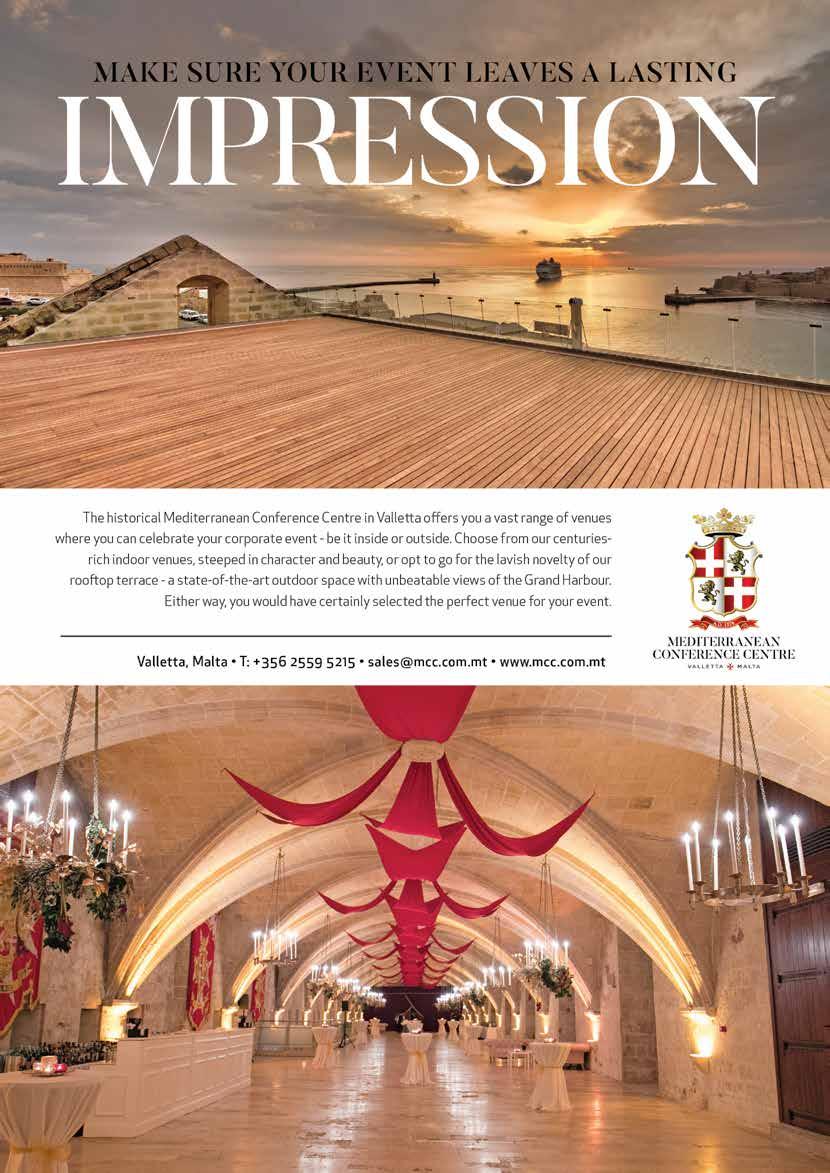
She points to the recently opened Verdala Wellness Hotel in Rabat as a prime example. “It is the first deep wellness hotel in Malta and also the island’s first five-star adultsonly hotel. The project reflects AX Group’s commitment to innovation and strategic foresight. We are proud to pioneer new concepts that add genuine value to the Maltese offering, rather than replicate what already exists.”
Meanwhile, Claire makes no distinction between female or male when it comes to leadership. “A leader is a leader, regardless of gender, colour, race, or any other factor. True leadership is defined by what sets you apart; your vision, your integrity, your ability to inspire and to act,” she affirms. As a female leader, she acknowledges feeling a responsibility to inspire other women, but is quick to set an important caveat: “I also believe it is wrong to expect something simply because you are female. Doing so only diminishes your value. Leadership is not granted; it is earned.”

until it is completed. I am also very diligent with time. When I am working, my focus is strictly on work. When I am with my family, that becomes my absolute priority. The one area that falls last on my list, if I am honest, is time for myself,” she admits, yet recognises the importance of creating time and space for personal well-being.
And while her role in itself is demanding, Claire admits to being equally demanding on herself. “I am the type of person who, if there is something to be done, will not rest
“Ultimately, I feel mentally well and grounded when effort and results are aligned, in both my personal and professional life. Without that alignment, I know I am not at my best.”
‘I believe the world requires more humanity and humility, rather than simply distinguishing between men and women.’
Denise Xuereb is Director of AX Construction, leading numerous restoration and development projects with the aim of enriching Malta’s architectural heritage. She is also Vice President of the Malta Developers’ Association, and advocates for sustainable development in the Building Industry Consultative Council, as well as for innovative and eco-friendly construction practices within international fora.
Reflecting on her journey within the business, Denise looks back on starting out in her career as “seamless” on a personal level, yet professionally, recalls facing the initial challenge of gaining acceptance and proving her worth in a predominantly male industry. “After all, I was a 22-year-old woman, and the owner’s daughter, stepping into the construction world,” she recognises.
Since then, Denise measures her success by the unique impact she has been able to make within the company and the wider industry, revealing that, “the moment I realised that younger girls and women looked up to me as an inspiration was incredibly fulfilling. It aligns perfectly with our company’s core value of determination: the belief that you can achieve anything you set your mind to.”
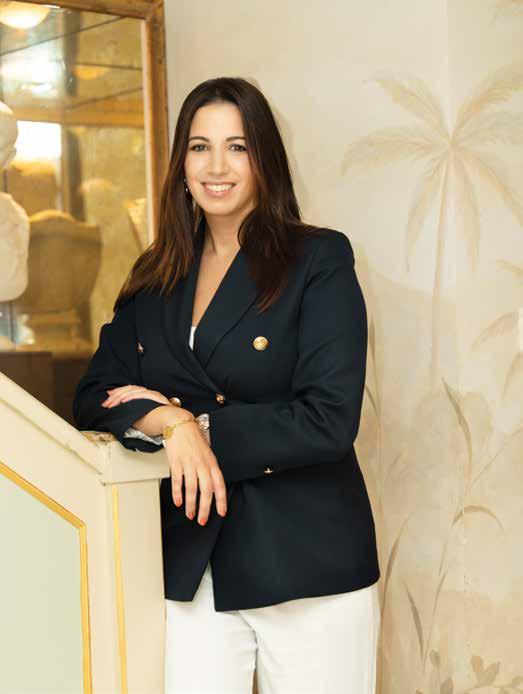
Sharing her thoughts on strategic vision for the company, “being at the forefront of innovation is our hallmark. AX Group consistently leads the industry across various sectors by continually setting higher standards. We are renowned not only for pioneering groundbreaking projects but also for establishing influential brands. Diversification remains a key aspect of our strategy.”
As for being a female leader, Denise believes in actively using her influence to redefine leadership and champion the next generation, be it men or women. “The belief that anything is possible is paramount. Limitations exist only in our minds. I believe the world requires more humanity and humility, rather than simply distinguishing between men and women,” she maintains.
Revealing her non-negotiable practices to maintain focus, resilience and personal well-being amidst the pressures of her demanding role, Denise describes engaging in activities like going to the gym, reading and finding her “sanity space” as key to help her stay grounded. “Additionally, my three children keep me young, busy and a bit crazy, but they also teach me adaptability and resilience. In their eyes, I am their everything, which continually inspires me,” she smiles.
Imparting one piece of hard-won advice to aspiring female entrepreneurs and leaders, Denise asserts: “cultivate a specialised focus, remain humble, work diligently, treat everyone with respect, and always think big.”
‘If you are not prioritising your own wellbeing as a leader, you cannot give the right energy to any area of your life.’
Baroness Justine Pergola is the owner and Director of Business Development at Palazzo Parisio. Together with her mother, the late Baroness Christiane Ramsay Scicluna, she is credited with masterminding the rebirth of the 18th century stately home, which has been in the Scicluna family since 1898, as a highly soughtafter venue and home of fine food and drink.
For Justine, family and business have always been linked. “My family history boasts an entrepreneurial spirit,” she shares, “from my great great grandfather, Giuseppe Scicluna, who designed and renovated the palazzo from hunting lodge to the masterpiece it is today; my great grandfather, John Scicluna, who among other ventures, created one of Malta’s leading exports, CISK lager; to my mother and grandmother, who brought the palazzo gardens and house back to life after they lay closed for several years, and who had the vision to open them to the public and start a restaurant.”


Since then, Justine has transformed Palazzo Parisio from a venue for special occasions into a welcoming destination for everyday enjoyment. Under her guidance, the palace now hosts relaxed evening events, including live music in the gardens featuring some of Malta’s most popular bands, jazz nights and wine pairing evenings. The introduction of familyfriendly events – like the palazzo’s much-loved Halloween transformation into a haunted palace – has made it a lively and inclusive part of Malta’s cultural and social landscape.
Palazzo Parisio has always been an innovative force within the hospitality industry on the island, and Justine prides herself on delivering new and interesting concepts as often as possible. “These have been very well received by the public and I have surrounded myself with a great team that I actively encourage to bring suggestions and ideas to the table, as they can provide valuable input and creativity for new business opportunities –we are all constantly striving for new and exciting experiences,” she smiles.
Interestingly, it has always been a very female-centric team at the palazzo, with all departments across the business boasting strong female team members. “I was raised by formidable, forward-thinking women who, when the opportunity arose, were keen to collaborate with female-led businesses and who were determined to actively develop female talent across
all sectors of our industry,” Justine maintains. And since she has taken over, she has forged relationships with other strong women in the community and enjoys creating new concepts of collaboration.
And while Palazzo Parisio is at the heart of her business, it doesn’t end there. With a number of properties within Tabria Property & Hospitality Management Limited having been vacant for years, Justine has endeavoured to convert these properties into a useful state, developing her own flair for interior design and project management.
Coming from a historically philanthropic family, Justine follows in these footsteps, recently co-hosting a popular charity ball. With Palazzo Parisio as the backdrop, she partnered with Sarah Young to create a Regency Ball where all proceeds were directed to the FIDEM Foundation.
And while business demands can be intense, she believes that self-care is essential. “If you are not prioritising your own well-being as a leader, you cannot give the right energy to any area of your life. I do my best to manage my energy through a variety of different practices – exercise, meditation, eating as cleanly as possible, surrounding myself with positive, proactive colleagues, and spending time with friends. Plus embracing every opportunity for fun and a good laugh of course!”
‘Being a female leader today means leading with empathy, resilience and authenticity – qualities that are increasingly essential in a complex world.’
Nathalie Farrugia serves as the Chief Corporate Relations Officer at Malta Enterprise, the national economic development agency, playing a central role in supporting both local and international enterprises in establishing and expanding their operations in Malta. She is also actively engaged in shaping policy and strategic collaborations that drive innovation, sustainability and long-term economic resilience.
“The most defining moment in my career came when I transitioned from the private to the public sector, taking on the responsibility of bridging Government, business and international partners,” begins Nathalie, describing it as both an opportunity and a challenge, requiring her to step outside her comfort zone, build credibility in complex economic domains and lead with vision rather than title.
“The greatest challenge was overcoming the internal voice of doubt that often accompanies professional growth. Through that experience, I learned that leadership is not about knowing everything, but about asking the right questions, fostering collaboration and empowering others to bring solutions forward,” she shares.
Since then, she’s proud of the impact her role has afforded her in strengthening the relationship between Malta Enterprise and the business community, ensuring that enterprise support translates into real, sustainable opportunities.
“By promoting a culture of engagement and collaboration, I strive to build bridges between the private and public sectors so that, together, we can drive innovation and investment. My hope is to contribute to a lasting culture of cooperation, one where Malta is recognised as a supportive environment for businesses to develop and thrive,” Nathalie says.
One of the most significant trends shaping her strategic vision moving forward is the global shift toward sustainability and purpose-driven
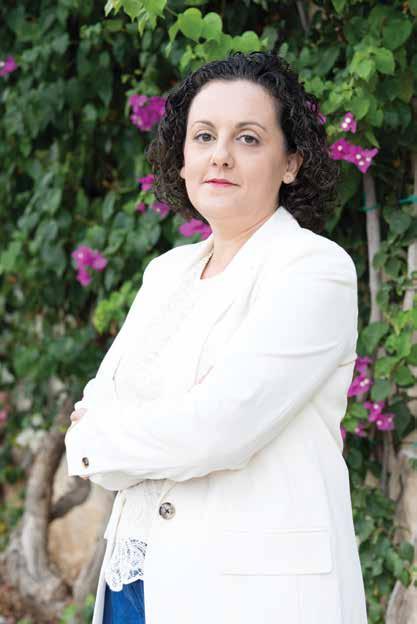

investment, she continues. “At Malta Enterprise, we are positioning Malta as a future-ready hub, where innovation extends beyond technology to how we work, produce and lead responsibly. From green industries and digital transformation to the creative economy, we aim to create the conditions for enterprises to innovate with impact,” she maintains, noting that the goal is not only to adapt to global change, but to anticipate it and guide it with intention.
Sharing her thoughts on being a female leader, Nathalie attests, “I believe true leadership thrives on diversity; of thought, experience and perspective,” arguing that when men and women work together as equals, it leads to balanced decisions and sustainable outcomes.
“Being a female leader today means leading with empathy, resilience and authenticity – qualities that are increasingly essential in a complex world. I see my role as helping to redefine leadership by example: being visible, accessible and intentional in supporting others,” she continues, adding, “I strive to create an environment where every voice is valued, and where collaboration naturally drives stronger leadership at every level.”
That starts with making space for herself. “In today’s fast-paced world, finding time to think can be extremely challenging. Starting the day early and carving out moments of stillness and reflection has become my non-negotiable practice. Listening to music during my commute also helps me set a positive mindset to tackle long and demanding days,” she reveals, noting that these small rituals help keep her grounded, focused and present, allowing her to lead with clarity and balance even amidst pressure.
To aspiring female entrepreneurs and leaders, she advises: “leadership begins with self-belief, even when it is challenging, tiring and requires stepping out of your comfort zone. Surround yourself with people who both challenge and support you, and speak with conviction. Be open to listening and learning, but have the strength to make necessary decisions, even if they are not popular. Above all, remember that consistency and integrity build influence far more powerfully than position or title alone.”
‘If you’re willing to put in the work, take the leap. The opportunities will follow.’
Dr Sarah Cassar, Managing Director of
St
George’s Care,
oversees operations at Casa Antonia and The Imperial – two care homes that are setting new standards for the industry and redefining what it means to live in a retirement home.
“I always knew I wanted to be part of the family business,” says Sarah, who started by studying law, which gave her a strong foundation and the confidence to join the management team at Casa Antonia. “My father has always been a very hands-on entrepreneur, focused first and foremost on providing excellent service rather than chasing the bottom line. His approach deeply inspired and shaped the way I view this sector.”
In the social care sector, success is measured less by numbers and more by the quality of life provided. “We are not simply running businesses – we are managing the day-to-day needs, routines, meals, and activities that define the lives of our residents. For me, the greatest measure of success is their happiness,” Sarah maintains.
Beyond this, she is also proud of keeping the homes open and connected to the wider community. “At The Imperial, for example, we have created a vibrant space where local councils, parishes, NGOs, dance groups, artists, and many others regularly collaborate with us. This has transformed the home into a true community hub,” she reveals.
Moving forward, Sarah admits that one of the most significant challenges she faces is workforce availability, which is closely tied to shifting global politics. “Our industry relies heavily on migrant workers, and every policy change has very real, immediate effects on the ground. Ensuring a stable, well-trained and motivated workforce remains at the centre of our strategy.”
The second major challenge – and opportunity – is technology. “The pace of change is extraordinary: by the time you have trained staff on one system, you are already researching its upgrade. But this is also where the future of care lies,” she affirms, adding, “our vision is to harness technology in a way that enhances, rather than replaces, the human connection that defines our work. This balance between innovation and empathy is where we believe the future of care truly lies.”
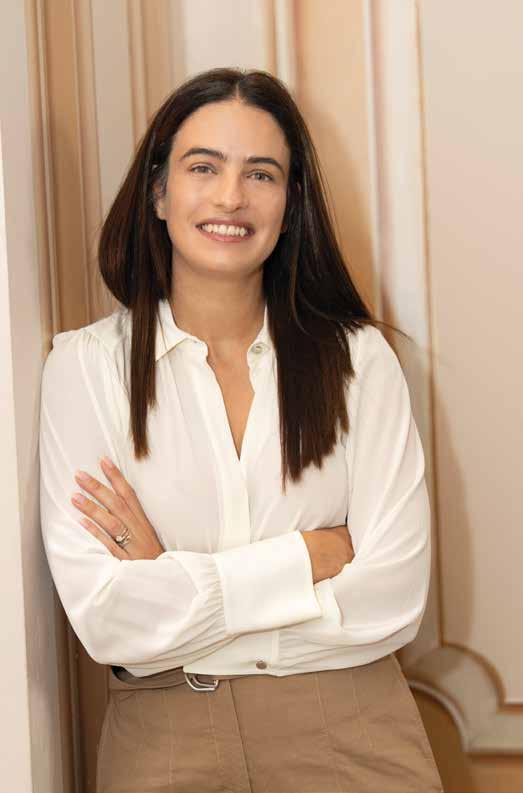
On the subject of gender, Sarah is candid, asserting, “I don’t see my career as being defined by gender – my choices were shaped more by the environment I grew up in and by joining the family business. That said, I do believe being a female leader carries a responsibility to lead by example. Leadership in care is about empathy, collaboration and resilience – qualities that women often bring naturally.”
“I was fortunate to have inspiring female mentors, including Lora Cuscun, a clinical consultant working with us and Elaine Naudi our CFO, who showed me never to let gender define my role or my expectations. I hope to pass that forward by showing younger women that leadership is within their reach,” she continues, admitting that motherhood has been the greatest challenge in balancing leadership and life.
“Society still assumes mothers will shoulder most responsibilities at home, and for women in healthcare roles, this makes full-time work extremely difficult. We need more honest, practical discussions on how to support these women, who are truly the backbone of our communities,” she asserts.
Sarah combats the demands of her role by making time for herself through regular exercise, as well as carving out quality time with family. “No matter how demanding work becomes, my family grounds me and reminds me why I do what I do,” she shares.
Her parting advice to young women is to choose an industry they truly enjoy: “work takes up such a large part of life, and it’s important to be in an environment that challenges and fulfils you. Most importantly, believe in yourself. If you’re willing to put in the work, take the leap. The opportunities will follow.”


As more companies look beyond traditional financing to source growth capital, Malta is set to see a record figure for bond issues throughout 2025. Ramona Depares delves into how this is becoming an intrinsic part of many organisations’ expansion strategy, and the implications on the market.

IN OCTOBER 2025, BANK OF VALLETTA RECEIVED REGULATORY APPROVAL FROM THE MALTA FINANCIAL SERVICES AUTHORITY (MFSA) FOR THE LISTING OF AN UNSECURED EURO MEDIUM-TERM BOND PROGRAMME OF A MAXIMUM AMOUNT OF €325 MILLION. This follows the successful €150 million unsecured subordinated bond issue by BOV a few months earlier, which was the largest corporate issue ever recorded on the local market by the Malta Stock Exchange (MSE). Since then, the local bond market has shown no signs of slowing down. According to the MSE, the bond market has seen steady growth over the past few years, with around 100 local companies having their bonds issued and traded on the local capital market.
The strategy is not exactly new – leading players like Corinthia Group, Virtu Finance and Hili Ventures have long opted for this route, and all have met with considerable success.
But the sharp increase in recent years is undeniable, as even younger companies have started turning to bond offerings to secure growth capital. MSE CEO Simon Zammit attributes the surge to companies seeking diversification in their capital structure.
“The cost of borrowing through a bond issue, when compared to the interest rates offered by commercial banks, can be a significant factor in determining how to finance capital projects. Additionally, the possibility of fixing the interest rate for the entire duration of the bond is particularly beneficial in environments where interest rates are changing,” he says.
“We anticipate this year to be another record for corporate bond issuance, with several companies already preparing new offerings, and the Exchange is expected to play an even more central role in Malta’s economic development.”
Simon Zammit, CEO, Malta Stock Exchange


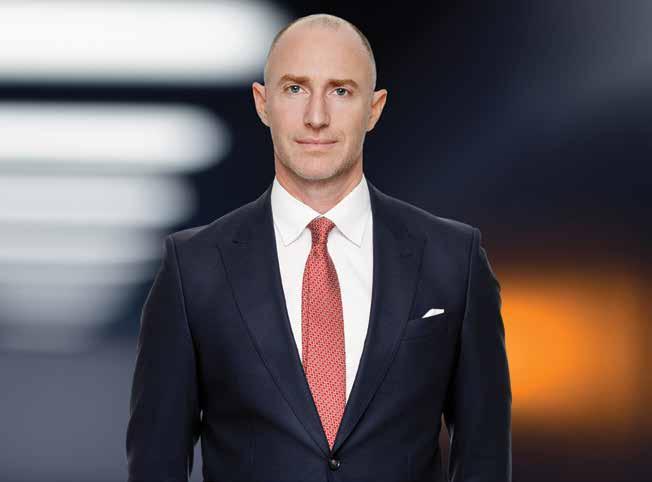
The trend underscores continued confidence in the Exchange and in the bond market as a reliable funding avenue, particularly for companies with long-term growth and diversification goals. This confidence has translated into an increasing appetite for fixed-income instruments on the investors’ side, helping them supplement earnings while putting their savings and investable funds to work.
Nick Calamatta, co-CEO of Calamatta Cuschieri, calculates that between January and December 2025 alone, the local corporate bond market will come close to issuing €1 billion in new bonds.
He believes this reflects a rapidly evolving country that is catching up with more developed economies, underpinned by a strong banking sector holding substantial unallocated capital.
“Year-on-year we’ve seen a record increase in deposits by Maltese residents. Malta ranks tenth highest in the EU in terms of deposits per capita, despite not being anywhere near the richest country in the EU. Technically, on a per capita basis, Malta today has even surpassed neighbouring Italy. The market is now evolving rapidly, and depositors are looking to deploy their money into interest-bearing bonds that support the growth of local corporates,” Mr Calamatta notes.
He believes that the expansion of capital markets is a natural progression and, despite the importance of bank financing as the foremost financing option of most
companies, limiting factors such as concentration risk and stricter regulatory ratios mean that the corporate bond has been pivotal in supporting the economy’s growth.
“I don’t think it would have been possible for the Maltese economy to grow at such speed without the bond market helping as a financing source,” Mr Calamatta says. “Malta ranks favourably in terms of penetration of capital markets in relation to other EU countries. It is a different matter altogether when one considers equity listings. About the latter, I can’t stress enough why this is important for the economy over the medium term.”
Like every investment, a bond issue comes with risks. Mr Calamatta believes that investors, together with their financial advisors, must be cognisant of these risks and invest in the knowledge of the
“Year-on-year we’ve seen a record increase in deposits by Maltese residents. Malta ranks tenth highest in the EU in terms of deposits per capita, despite not being anywhere near the richest country in the EU.”
Nick Calamatta, co-CEO, Calamatta Cuschieri
“Banks
have also been major contributors to the growth in the bond market, echoing increased regulatory requirements and the overall expansion in the level of business of the
Edward Rizzo, Director, Rizzo, Farrugia & Co
various risks as disclosed in the prospectus. Companies that admit listed instruments are required to maintain higher-level governance, which often results in significant effort for companies to raise their game. This investment translates into more stability and longevity for a company.
“Such challenges tend to represent a positive progression for the company. Achieving a listing demonstrates a level of seriousness to shareholders and investors,” he elaborates.
Mr Calamatta’s analysis echoes that of Edward Rizzo, Director at Rizzo, Farrugia & Co, who notes that currently, total bond issuance on the Regulated Main Market has exceeded €3 billion compared to €2 billion in 2021 and €1 billion in 2014.
“Moreover, almost 10 years ago, the MSE launched the Prospects multilateral trading facility (MTF) mainly targeted at smaller companies with lower funding requirements. Currently, there are 17 debt securities on Prospects, totalling circa €73 million,” he states, adding that it is unfortunate that the same growth was not registered in equity issuance.
Still, the market’s predominance towards bonds does not surprise him, particularly in relation to the real estate sector, which he says has grown remarkably, reflecting the high level of construction and property development across the Maltese Islands.
“Banks have also been major contributors to the growth in the bond market, echoing increased regulatory requirements and the overall expansion in the level of business of the larger banks. Given BOV’s dominance across the banking sector, it is no surprise that it is also the largest issuer on the bond market. It is very positive to note that the size of individual bond offerings has also increased remarkably, showing the strong investor appetite for quality issuers. This momentum is expected to be maintained given the recent confirmation by BOV that it intends to issue further bonds up to a total amount of €325 million over the next 12 months. If the bank issues this amount in full, the total exposure by BOV across the bond market would increase to over €735 million,” Mr Rizzo reflects.
He goes on to refer to two new bond offerings that were released earlier in 2025 by Golden Triangle plc and MM Star Malta Finance plc. Both companies are exposed to the real estate sector in specific cities internationally (in Beverly Hills and Edinburgh respectively) but are listed on the Malta Stock Exchange.
larger banks.”
“Such offerings allow those investors, who mainly focus on securities listed domestically, to obtain geographical diversification in their portfolios, since the income-generating properties which they finance are located in important cities overseas,” Mr Rizzo elaborates, adding that the MSE should consider attracting international companies with smaller bond offerings (when compared to those across the larger international markets) that can be absorbed through the Maltese capital market.




BY BERNARD POLIDANO
“This could prove to be an important development for the local capital market and should be viewed positively by the investment community in view of the large concentration of bonds currently listed on the MSE and mainly dependent on the Maltese economy.”
That said, investors appear to be satisfied with the crop of local bond offerings. Corinthia Group is one of the biggest success stories, having been among the earliest organisations to tap into Malta’s bond market. Simon Naudi, Managing Director and CEO of Corinthia Group, recalls how the first bond was issued over 25 years ago to finance part of the cost to acquire a hotel portfolio in Prague.
“We have since been regulars in the market, with multiple bonds in issue across various parts of the group. We have always appreciated the bond market – and the scrutiny and due diligence that accompany new and ongoing issues – as a positive discipline on our business plans and governance, in the best interests of the company. While our business is global, the bond market in Malta has helped Corinthia deepen our roots in our home community. At the last count, some 11,630 investors hold bonds in our group,” he says.
“We have always appreciated the bond market – and the scrutiny and due diligence that accompany new and ongoing issues – as a positive discipline on our business plans and governance, in the best interests of the company.”
Simon Naudi, Managing Director and Group CEO, Corinthia Group
This success has served as inspiration for younger companies like Lidion Bank, QLZH Group and JD Capital – among others – which are using the strategy with equal success. KA Holdings Ltd is another example. Founder and Managing Director Kurt Abela explains how he started the business in 2006 as a sole trader. In 2011 he invested in a business centre in Mriehel, financed entirely through banks. When the opportunity arose to open a second business centre, Mr Abela began exploring the options available on the MSE.
“We decided to pursue it, which enabled us to carry out the project and invest in a block of apartments. The strategy has been successful, and we are now seeking further growth,” he explains.
The bond offering supported KA Holdings Ltd’s steady growth and provided the right opportunity to establish a formal corporate structure.
“Starting out as a sole trader, management had been entirely in-house. Upon deciding on issuing a bond, , KA Finance plc was created as a public limited company, complete with an experienced board, an audit committee and external directors, all actively involved in decision-making. The company has greatly benefited from their expertise. Listing on the MSE accelerated this process; without going public, it would likely have taken longer. I believe that adopting such a structure should be considered best practice even for companies not accessing the bond market, as it fosters good governance,” he notes.
Evidently, being in the public eye can present challenges, particularly in the event of a bond default.
I raise the issue with Mr Abela, but his reply is unequivocal: if a company is well-managed, public scrutiny generally brings more benefits than risks. “A bank loan is largely private, but issuing a bond makes your operations transparent. The advantage of a public listing is that it demonstrates stability and good governance. At KA Finance plc, we consistently maintain the required corporate governance and reporting standards. Public scrutiny only becomes an issue if a company falls behind on its compliance obligations.”
These are words that reflect the approach of the MSE itself. I circle back to Mr Zammit, the Exchange CEO, who confirms that, when a company chooses to pursue a bond issue to support its business model, that decision should be grounded in a strong corporate governance framework.
“Ultimately, the success of a business does not depend solely on the source of financing. We firmly believe that the strong governance required of companies admitted to listing and going public is a key factor in creating long-term value. It provides a solid foundation for growth built on the confidence it inspires among investors and the wider market. It’s not just a regulatory requirement, but a strategic asset.”
The flipside? Like all investments, even bonds carry a risk. In the past months we’ve seen at least three companies reportedly
facing financial struggles, with questions raised as to whether they will be able to honour their bond issues upon maturity. So far, Malta’s market is yet to experience a major bond default. Replying to a parliamentary question on the issue, Finance Minister Clyde Caruana noted that “defaults in capital markets form part of the general risk that investors accept when investing in bonds”.
Currently, the MFSA is the regulator that authorises applications for the regulated market, and it does so based on three criteria: financial strength, corporate governance and transparency. However, as Mr Zammit puts it, there’s also an onus on investors to seek out proper investment advice and ensure that investment portfolios are matched to their financial capacity and suitability.
“Investor education and awareness of capital markets is something the Exchange has been working on for a long time, in collaboration with other stakeholders across the industry. We have seen steady progress in this area. Meanwhile, we anticipate this year to be another record for corporate bond issuance, with several companies already preparing new offerings, and the Exchange is expected to play an even more central role in Malta’s economic development,” he concludes.
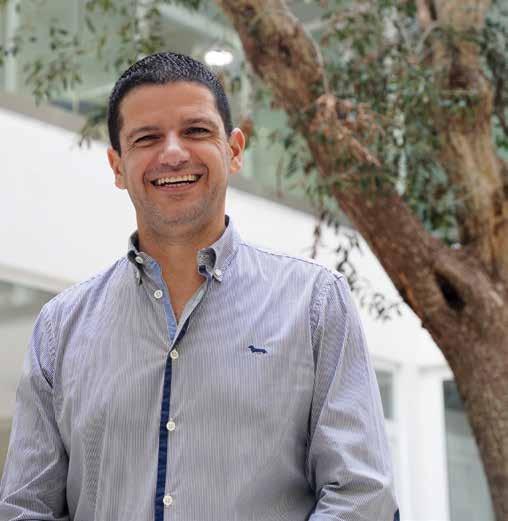
“At KA Finance plc, we consistently maintain the required corporate governance and reporting standards. Public scrutiny only becomes an issue if a company falls behind on its compliance obligations.”
Kurt Abela, Founder and Managing Director, KA Holdings Ltd

As part of an overarching drive to help foster dynamism and growth within the local business community, Malta Enterprise has focused its work on nurturing innovative startups, providing them with incentives to improve their operations, attract talent and penetrate international markets. Here, Rebecca Anastasi speaks to the entity’s Chief Executive Officer, George Gregory, to discover the opportunities opening up in the startup scene.
“OVER THE PAST FIVE YEARS, MALTA ENTERPRISE HAS SUPPORTED MORE THAN 190 STARTUPS ACROSS DIVERSE SECTORS, INCLUDING MEDTECH, FINTECH, ARTIFICIAL INTELLIGENCE (AI), AND GREEN INNOVATION. These are not experimental ideas; they are real companies creating quality jobs, developing tangible products and addressing global challenges,” attests George Gregory, CEO of Malta Enterprise. He makes this point just weeks after the fifth edition of the Startup Festival, which he describes as the “cornerstone of Malta’s innovation calendar”.
“Malta Enterprise’s support to the local and international startup community is driven by a strategic vision that fosters,” he says, “a dynamic, globally competitive environment built on innovation, scalability and international collaboration. Malta has performed strongly in areas such as talent attraction, digital transformation and regulatory innovation. Economic success is measured not only by the number of registered companies, but also by the quality of startups, their growth trajectories, job creation, international market reach, and sector
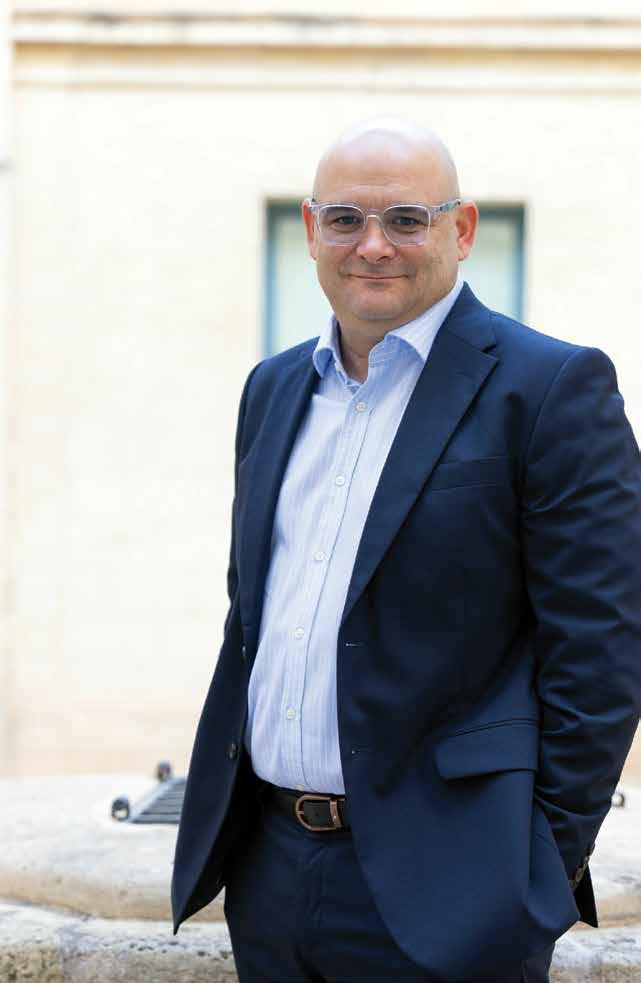

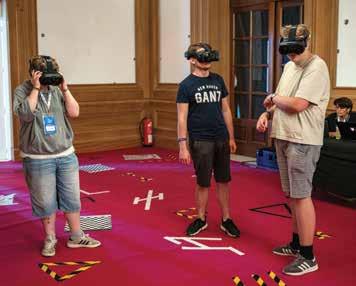
diversity,” Mr Gregory explains, adding that such an approach is aligned with principles set by the 2024 Startup Nations Standard (SNS) Report by the Europe Startup Nations Alliance (ESNA). Over and above, he continues, startups “often reflect the type of economy Malta is building: high-value, innovationdriven and inclusive.”
In order to help bolster such an ecosystem, both encouraging local startups and attracting international innovation to the island’s shores, Malta Enterprise has designed programmes structured with the challenges of startups in mind. “Through initiatives such as the Business Start Scheme and Start-Up Finance Scheme, we provide founderfocused incentives that reduce the financial pressures of early growth. From seed-stage backing to scale-up support, our role is to help startups invest in people, processes and platforms that enable long-term success,” he explains.
Moreover, the Chips Start EU Programme, which is geared towards supporting early-stage
semiconductor startups with educational training, networking opportunities and equipment, has also been welcomed enthusiastically by those in the field.
“We are already experiencing success that we must continue building on. The first cohort of the Chips Start EU Programme, for example, has received over 40 applications from promising startups. This demonstrates both the attractiveness of Malta as an innovation hub and the growing confidence of startups in our ecosystem. It aligns with Malta’s long-term vision to nurture high-impact startups that contribute to economic resilience and global competitiveness,” the CEO continues.
Moving on to how Malta Enterprise attracts international startup founders and venture capital firms, Mr Gregory shares that the entity “is actively micro-targeting startups that can add real value, particularly those working on innovative technologies and services aligned with Malta’s Vision 2050 Strategy. We are continuously refining our incentive offering; for example, we are currently
Malta Enterprise’s support to the local and international startup community is driven by a strategic vision that fosters a dynamic, globally competitive environment built on innovation, scalability and international collaboration.
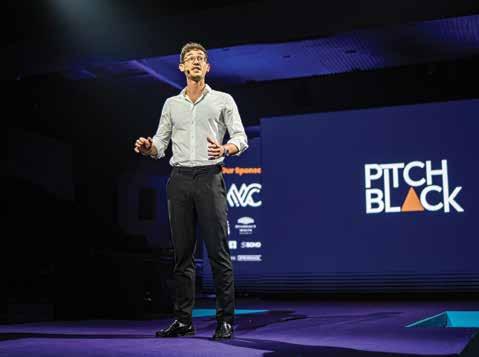
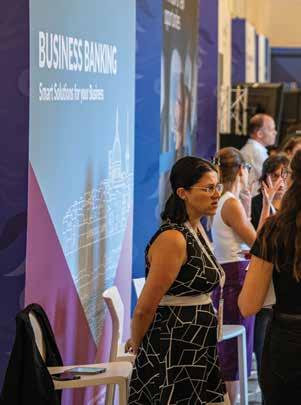
“Malta Enterprise is actively micro-targeting startups that can add real value, particularly those working on innovative technologies and services aligned with Malta’s Vision 2050 Strategy.”
revamping the Employee Stock Option Plans to provide founders and their teams with stronger tools and a more competitive business environment.”
Furthermore, “over recent months, we have intensified international outreach, hosting delegations from global venture networks and showcasing Malta at leading startup events. This is already generating growing interest in using Malta as a strategic entry point into Europe,” the CEO states.
Crucially, high-profile events such as the EU Startups Summit have contributed toward placing Malta on the “global startup map”. Indeed, over the past two years, the summit “has welcomed more than 4,000 participants; 80 per cent of them foreign entrepreneurs and investors, who not only came here to network but who also tangibly explored the advantages of setting up and scaling from Malta.”
The Startup Festival has also been vital in this regard. “What began as a national initiative has evolved into a high-impact platform that unites founders, investors and innovators while strengthening Malta’s entrepreneurial community,” the CEO states.
The 2025 edition, he explains, was “where both local and international entrepreneurs discovered Malta as a base to start and scale their ventures. A highlight of this year’s festival was the Pitch Black competition, which attracted over 90
applications from local and international startups, including companies that may not yet have a presence in Malta but are actively exploring it. We measured success not only through attendance but also by the quality of networking sessions, investor-startup matchmaking and the momentum generated for further collaboration. The festival once again proved itself as a catalyst for connections and opportunities that extend far beyond the two-day event.”
The festival, the CEO continues, is positioned to act “as a launchpad for long-term collaboration and ecosystem development.” This is due to “the visibility and connections made during the festival” that “are intentionally carried forward through follow-up engagement with startups, investors and other stakeholders.” Indeed, “after the event, Malta Enterprise continues to actively engage with participants to provide guidance on funding opportunities, mentorship and partnership development, ensuring that the connections formed translate into concrete, ongoing support,” Mr Gregory says.
Moreover, the annual festival “also serves as a vital source of feedback from entrepreneurs, allowing us to identify emerging challenges, gaps and opportunities within the ecosystem. Insights gathered during the festival directly inform updates and improvements to our support schemes, helping to ensure that our programmes remain relevant, effective and aligned with the evolving needs of startups.”


These necessities include talent attraction and retention. “Access to talent is a challenge faced by startups everywhere, and Malta is no exception. At Malta Enterprise, we are addressing this through a dual approach: strengthening the local pipeline while making it easier to attract international expertise. Locally, we are working closely with universities and training academies to upskill graduates and encourage more young people to see entrepreneurship and innovation as viable career paths. At the same time, we are facilitating the relocation of high-skilled professionals, while introducing incentives that make Malta an attractive destination for global talent. This combination ensures that startups in Malta can build diverse, high-performing teams capable of competing internationally,” Mr Gregory attests.
Global technological and environmental trends may also prove to be challenging for smaller and less established companies. Indeed, the CEO admits that “the global economy is being reshaped by two powerful forces: the rapid adoption of AI and the transition to sustainable business models.” In this regard, Malta Enterprise is “encouraging projects that integrate AI, digitalisation and green technologies. At the festival itself, these themes took centre stage, with dedicated panels highlighting AI-driven startups and innovators,” the CEO says.
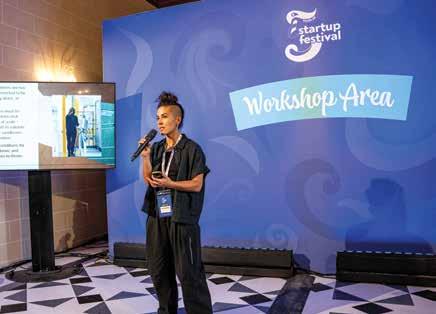
Moving beyond the startup phase of business development, Malta Enterprise has also established initiatives to support companies as they transition to scale-ups – that is as they move past the initial phases and seek to expand even internationally.
“We continue to collaborate with both public and private partners to ease the financial and structural challenges of this growth phase. A key example is the Malta Venture Capital Fund, created to unlock equity investment and strengthen our venture ecosystem by co-investing alongside private investors in highpotential startups,” Mr Gregory states.
In parallel, he continues, Malta Enterprise is also preparing to launch the Malta Startup Framework. “This will be the first legal framework of its kind designed specifically for startups and their investors. It will provide long-term certainty and further establish Malta as a serious destination for scale-ups. Importantly, we are already seeing results: one Malta-based startup has successfully scaled from its local base to list on the NASDAQ and expand into Africa, demonstrating the global potential of companies nurtured within our ecosystem,” he confirms.
Looking ahead to the next few years, the legacy Malta Enterprise is driven to create is “a self-sustaining startup ecosystem that transforms Malta’s economy into one that is more innovative, resilient and globally connected. Our ambition is for Malta to be recognised not only as a place where businesses can start, but as a base where they can scale internationally and succeed. By supporting startups that generate high-value jobs, develop breakthrough technologies and open new markets, Malta Enterprise is laying the foundation for long-term prosperity. Ultimately, we want the companies nurtured here to become global success stories that inspire the next generation of entrepreneurs. At the same time, we remain firmly aligned with Malta’s Vision 2050, ensuring that growth is sustainable, resilient and inclusive for the future economy,” the CEO concludes.
“Our ambition is for Malta to be recognised not only as a place where businesses can start, but as a base where they can scale internationally and succeed.”

TradeMalta’s new website, launched earlier in 2025, offers a one-stop-shop and knowledge hub designed to redefine how it communicates with and supports businesses expanding globally.
LAUNCHED A REVAMPED WEBSITE DESIGNED TO FACILITATE THE WAY IT COMMUNICATES WITH LOCAL COMPANIES, whilst empowering them to expand internationally. The new platform now serves as a one-stop-shop and knowledge hub, designed to provide everything businesses need to grow beyond Malta’s shores – all under one digital roof.
Josianne Vella, Senior Manager for Trade Information Services, explains that since the launch, TradeMalta has seen positive feedback from Maltese businesses, with exporters particularly pleased with the clear and intuitive navigation offered by the new site.
“We have now structured our platform under three main sections: Financial Assistance, Market Data and Export Support. These categories make it easier for users to find funding opportunities, practical export resources and market research tools. Many have also appreciated the more streamlined process for applying for grants, along with the centralised hub for trade intelligence, which saves time and effort when seeking information about new markets or support services,” Ms Vella states, adding that user feedback continues to play a key role in shaping improvements.
In fact, the team has taken user feedback on board, such as the addition of more export-related guidance and trade information tools, which have already resulted in some initial updates. The latter include the addition of a direct link to TradeMalta’s new Exporters Directory and the EU Sanctions Helpdesk.
“This feedback-driven approach will remain central to the platform’s next development phase,” Ms Vella says.
To ensure the website remains relevant in a rapidly evolving trade environment, TradeMalta has also introduced a continuous improvement framework which involves regular content reviews, monitoring of global trade developments and the identification of new data sources and market intelligence tools through strategic partnerships.
“We have instituted an active feedback loop with exporters so as to ensure that new content and features directly address their emerging needs. For example, upcoming updates will include an export toolkit covering timely topics such as sustainability standards, e-commerce and trade developments. The goal is to keep exporters informed and equipped to compete globally,” she elaborates.
“TradeMalta’s strategy has evolved toward a sectorspecific and personalised approach, and its online services are being developed to reflect this shift.”


Meanwhile, more elements are set to be gradually rolled out in the coming year, with a range of new digital tools and interactive features currently being developed. These are designed to make the website ever more interactive and useful for exporters.
“We’re planning on improving access to market information that highlights opportunities by region and sector. Also in the works is a self-assessment tool to help companies evaluate their export readiness and identify the most suitable support programmes. We will also be adding an export toolkit featuring guides, templates and practical resources to help new exporters build effective international strategies. These additions are all designed to make the website not just a source of information, but an interactive workspace for Maltese exporters,” Ms Vella continues.
Several Maltese SMEs have already reported tangible benefits from the new platform. Many have successfully
applied for export support grants through the simplified process, while others have used the market research tools to identify new opportunities.
“The website also features success stories and interviews with local companies sharing valuable insights and inspiring other businesses to take their first steps into international markets. In fact, TradeMalta’s ongoing improvement strategy will be giving particular attention to emerging sectors and trends driving the future of trade,” Ms Vella continues.
Updates will focus on providing current market insights, resources that cater for emerging needs and scenarios, and sector-specific assistance for businesses. TradeMalta’s information services are also expected to place a strong spotlight on helping Malta-based businesses build export capability and maturity in response to emerging trade scenarios.



“Website analytics and engagement data are providing valuable insights into what Maltese exporters are searching for.”
“TradeMalta’s strategy has evolved toward a sector-specific and personalised approach, and its online services are being developed to reflect this shift. In this way, we aim to ensure that current economic and industry developments are integrated into its overall trade promotion strategy.”
Beyond the new digital platform, the businessfocused entity continues to play a hands-on role in helping businesses build long-term international relationships.
“We ensure that Maltese exporters are not just entering markets but building partnerships that endure, and we do this through targeted trade missions, B2B matchmaking, international fairs, and collaborations with foreign trade promotion agencies. The website complements this by serving as a digital resource, connecting online trade information with real-world trade opportunities.”
In fact, the organisation’s main goal is to help local businesses integrate into global value chains, strengthen value-added export initiatives and ensure long-term internationalisation success.
Going beyond offering user-friendly digital services, the new platform is proving to be pivotal in terms of using data and insights to understand exporters’ needs.
“Website analytics and engagement data are providing valuable insights into what Maltese exporters are searching for. This information includes the most active sectors, the types of assistance in highest demand and where knowledge gaps exist,” she adds.
To increase this edge, TradeMalta is also collaborating with SEO service providers to improve online visibility and to ensure that businesses are able to quickly find the information most relevant to them.
“These insights allow TradeMalta to continuously refine its online services, prioritise key markets and training topics, and develop data-driven outreach initiatives aligned with the real needs of Maltese exporters,” Ms Vella states.
Now, as TradeMalta celebrates its 10th anniversary, the organisation’s focus is firmly placed on strengthening Malta’s next-generation export ecosystem. The entity’s long-term priorities focus on enhancing export readiness and internationalisation capabilities among SMEs, while expanding sector-specific export programmes, particularly in high-growth areas and emerging markets. The goal is to continue consolidating the data and intelligence infrastructure to better inform both exporters and policymaking.
“We strongly feel that the next decade will be about scaling impact and reach, and we’ll see an evolution from enabling experienced exporters to supporting potential businesses, while boosting Malta’s overall global competitiveness across diverse sectors,” Ms Vella maintains, concluding that TradeMalta encourages all Malta-based businesses interested in exporting to explore the website and subscribe to the mailing list to stay updated on new services, funding opportunities and tools designed to empower Malta-based businesses to expand internationally.
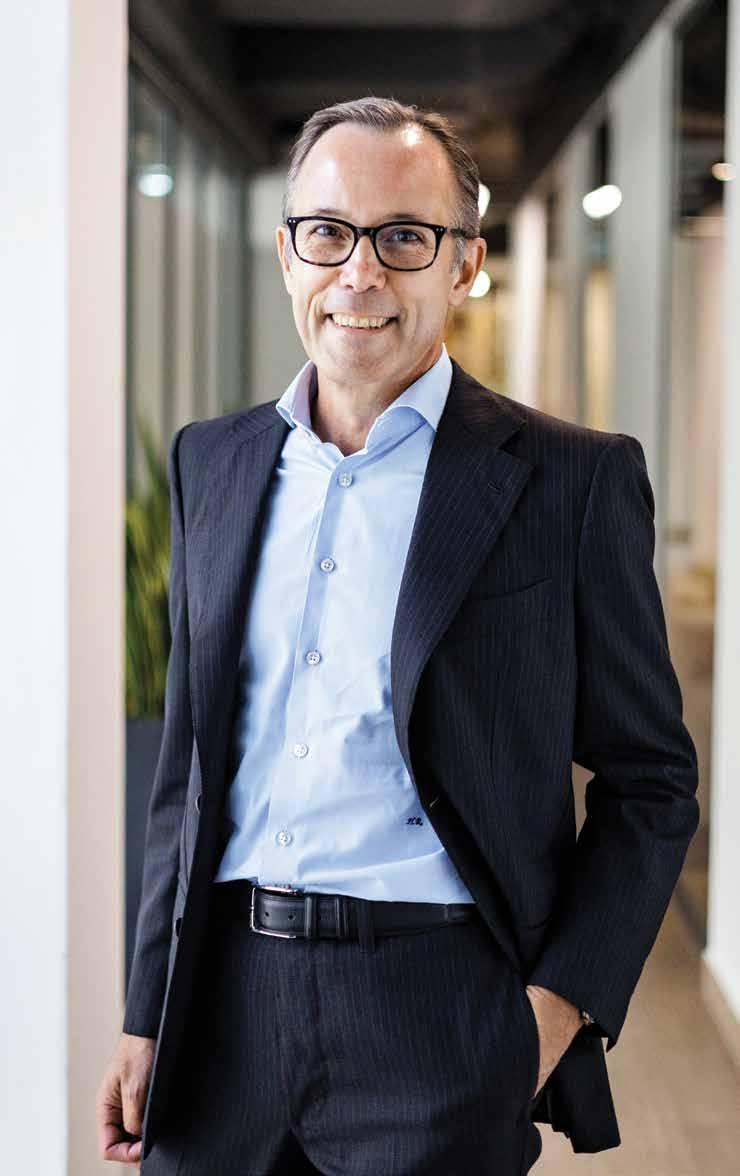
Buoyed by its in-house intuitive AI, Melita has its sights set on pioneering a future where customer interaction is seamless, efficient and consistently positive –cementing its identity as a global technology leader. Melita CEO Harald Roesch talks to Sarah Muscat Azzopardi about the commitment to excellence that is the driving force behind the company’s technological evolution.
FOR OVER 30 YEARS, MELITA HAS BEEN
A HOUSEHOLD NAME IN MALTA. A stalwart of the nation’s technological infrastructure – from pioneering cable television to rolling out nationwide fibre and 5G networks – its legacy is one of connection and communication. But in today’s fast-paced world of digital transformation, resting on one’s laurels is not an option, and this year, the company is undertaking its most significant strategic pivot yet.
With the launch of AI Solutions, the traditional Telco is boldly transforming into an innovative, technology-driven TechCo, leveraging its own powerful AI to redefine customer service for businesses worldwide. This evolution, explains CEO Harald Roesch, is not an overnight reinvention but a calculated next step, built on a foundation of international ambition.
The journey began several years ago, when Melita looked beyond Malta’s shores with the launch of its international Internet of Things (IoT) division in 2019 – a step that enabled the company to provide the specialised connectivity required for smart devices (such as connected vehicles, industrial
sensors and payment terminals) to communicate seamlessly across the globe.
“That proved to be a success, with around 95 per cent of our revenues in this segment now generated abroad. With AI, the idea is to build up a second international business line that is more software-driven,” Mr Roesch states.
This new venture rests on a platform born of necessity. Faced with ever-rising customer service expectations, Melita developed its own sophisticated AI solution in-house. Having refined its capabilities within its own operations, the company is now offering this proven technology to other businesses, giving them a unique competitive edge in a market saturated with generic, off-theshelf products.
Careful to distinguish their AI from the simplistic chatbots of old, the team at Melita refer to it as a ‘virtual agent’, a term that better captures its intelligence and capability. “It is not a fully off-theshelf solution,” Mr Roesch clarifies. “It’s an approach that enables us to deliver, in a very short timeframe, answers to personalised questions.”
“It is not a fully off-the-shelf solution. It’s an approach that enables us to deliver, in a very short timeframe, answers to personalised questions.”
The load on the human team is lighter, with latest data from the Malta Communications Authority (MCA) showing Melita answers 95 per cent of calls within two minutes, compared to competitors’ average of 72 per cent, resulting in far less stress for both customers and the team. Internally, this has created a very positive attitude from our customer care team towards the AI.”
He illustrates the difference with a practical example that gets to the heart of customer frustration. “If you have an off-theshelf solution and a customer calls, saying ‘My internet is down, what should I do?’, a generic platform would likely suggest trying this and that from a list of frequently asked questions,” he explains. “Instead, our platform first authenticates the customer and reviews their connection details, performing multiple technical checks in the background. The AI then uses this data to guide the customer – for instance, it might detect a modem issue and suggest restarting it, or if a technician visit is required, it will automatically schedule that visit.”
Moreover, it isn’t a single monolithic AI that’s at work, but a coordinated team. The CEO explains that the internal name ‘Billy’ is the public-facing persona for a suite of specialised virtual agents, including ‘Toby’ for technical issues and others for sales, all orchestrated to provide the right expertise at the right moment.
This deep level of integration is central to the core value proposition. For a business considering the platform, Mr Roesch’s pitch is compelling, focusing on a rapid, low-risk, success-based partnership rather than a simple product sale. “The key advantage we offer is speed – setup takes roughly six weeks to go live,” he notes. “It’s a light lift for our enterprise clients, requiring only a designated project manager and minimal IT support.”
Crucially, Melita eschews the heavy upfront investment model that often creates a barrier to entry for new technology. “We do not require a significant initial investment,” Mr Roesch states plainly. “The service is success-based. We’re not in the business of selling a platform and then leaving it to the customer to be successful. We guarantee the success of it.”
Acknowledging the common fear that AI signifies the displacement of the human workforce, Mr Roesch argues that Melita’s model actually does the opposite – creating a

more positive and efficient environment for customer service agents by elevating their role. By automating routine queries, the AI liberates human agents to focus on the more complex, high-value interactions where their expertise is most needed.
The results internally have been striking. “The load on the human team is lighter, with latest data from the Malta Communications Authority (MCA) showing Melita answers 95 per cent of calls within two minutes, compared to competitors’ average of 72 per cent, resulting in far less stress for both customers and the team. Internally, this has created a very positive attitude from our customer care team towards the AI,” Mr Roesch smiles. This improved working environment has had a tangible impact on staff retention, a notorious challenge in high-pressure customer service roles.

Remarkably, this transformation requires no complex reskilling. Asked about reskilling of their workforce and fostering collaboration between employees and their new AI assistants, the CEO asserts that the system is designed to be seamless. “The human workforce does not need to change anything in their behaviour,” he says. “It’s completely transparent and really just improves their life.”
I go on to ask about the leadership principles behind Melita’s technological evolution, and the innovation driving this new venture, to which the CEO replies with characteristic humility, pointing to a company culture that values internal talent. “I think we are lucky to have innovative people among our colleagues,” he says. “The only leadership principle is to listen to what they tell you, and then to
implement it. The development of AI Solutions was done completely in-house by our team.”
Looking ahead, the roadmap for Melita’s AI is focused on deepening its capabilities in customer service and sales automation across various industries, rather than diversifying too quickly. For Mr Roesch, who has overseen a massive technological evolution since taking the helm in 2016, the mission is both personal and professional.
“For me, this is the key to delivering consistently great customer service,” he states with conviction. “As CEO, I suffer when we’re not offering a good level of customer service, and I can tell you that for a year and a half now, I haven’t been suffering,” he concludes, good naturedly.
“We built a bank around a community”

Sparkasse Chief Executive Officer and Managing Director Paul Mifsud reflects on the bank’s 25th anniversary, and how it has prioritised building relationships with its clients, with Edward Bonello
PHOTO BY BERNARD POLIDANO
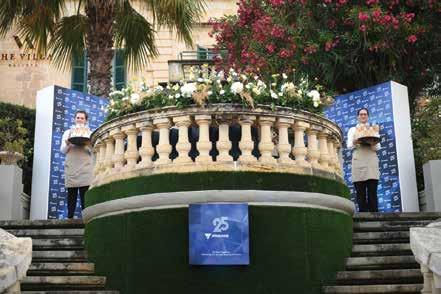
THE PAST 25 YEARS HAVE BROUGHT ABOUT A WHIRLWIND OF UNPRECEDENTED EVENTS, BOTH LOCALLY AND INTERNATIONALLY. With EU membership, international economic crises, a global pandemic and close-by military conflicts, the economic landscape has shifted constantly and completely since the year 2000, yet through it all, one Malta-based bank has remained a steadfast partner to local businesses.
“For us at the bank, especially those who have been with us throughout the whole journey, this 25th anniversary isn’t just a professional milestone. It is also a moment for reflection and pride,” Sparkasse Chief Executive Officer and Managing Director Paul Mifsud declares.
“25 years ago, we opened our doors, with a small team and a big dream. Today, not only have we grown in terms of number of team members, client
portfolio and scope of operation, but we realised that dream of establishing a bank grounded in shared values – service and competence. With no small amount of satisfaction, we can say that we have built a solid Sparkasse community based on trust, experiences, and why not, even friendships: a bank that is built around a community,” Mr Mifsud says.
He is quick to qualify that while the bank has indeed grown in size and significance, its values have remained unchanged.
“Throughout the past years we managed to weather economic cycles and regulatory upheavals, because we always managed to instil a solid value proposition of service and dedication in our teams. Each day, our experienced professionals show up, they listen to what our clients need and are motivated to make the impossible possible.”
“This 25th anniversary isn’t just a professional milestone It is also a moment for reflection and pride.”
“Each day, our experienced professionals show up, they listen to what our clients need and are motivated to make the impossible possible.”
Today, Sparkasse stands as a trusted institution within Malta’s financial services ecosystem – a partner for individuals, corporates, and, notably, for regulated entities operating in one of Europe’s most agile and opportunityrich jurisdictions.
The bank’s history has also been closely tied to Malta’s economic evolution. Mr Mifsud reflects on how EU accession in 2004 and the adoption of the euro in 2008 transformed the local financial landscape. “Malta’s EU membership gave businesses, including banks, a brand new playground to operate in. Joining the European single market brought immense opportunity for businesses, but also challenges to adapt to, and grow within a faster, more dynamic environment. Naturally at Sparkasse, we took this challenge head on, building a reputable structure that provided all the necessary support to businesses throughout their exciting journey.” The vast experience
garnered has allowed Sparkasse to carve itself a specific niche in the market, dedicated to regulated entities.
“It’s our bread and butter,” Mr Mifsud notes. “Servicing funds, portfolio managers and MiCA-regulated clients is a core focus for Sparkasse, and not something we do because we are obliged by some regulation. There is a true passion for this line of work, and at the bank we are proud and lucky to note that we have significant competence to support this prospect. Our teams are savvy about the requirements of the regulated entities they serve. Every action and advice is well researched, and experience has shown us that we have a reliable success rate of constructive outcomes to be proud of.”
As Malta’s economy has diversified into digital technologies, iGaming and fintech, Sparkasse has made it a point to keep up with the shifting scenario and evolve accordingly, while

remaining faithful to its core values. “At Sparkasse we make it a point not to simply jump on trends because something is trending at a particular time. While we remain open to new ideas and exploring new markets, we are dedicated to staying true to our model, which has provided comfort and peace of mind to our clients over the years,” Mr Mifsud continues.
Technology has brought both opportunity and risk. Sparkasse has embraced digital tools where they add efficiency, but never at the expense of the personal experience. “We believe that technology should remain a tool in the hands of humans, and it should never replace the relationships we have built with our client base. Banking is very much built on the relationships that are created between banker and client, which in our view, can never be replaced by an automated algorithm or AI. Investment in automation and cuttingedge tech has helped us to remain efficient, and to provide the best service to our customers in an everevolving tech-driven society, however we are adamant that this doesn’t replace the communication that takes place on a human level,” the CEO states.
This delicate balance between tech and human touch came particularly to the fore during the COVID-19 pandemic, which disrupted businesses and economies worldwide for the better part of two years. “Thanks to our IT teams, we could maintain full contact with our clients and the bank continued operating remotely. At a time of uncertainty, we pivoted overnight. We knew that digital banking was the way of the future – the pandemic was the rather abrupt catalyst that proved it,” Mr Mifsud reflects.
Looking ahead, Sparkasse’s future strategy rests on three pillars: sustainable growth, digital leadership and international relevance. The CEO sees challenges as well as opportunity in all three.
“Sustainable growth is the name of the game for any business that wants to succeed into the future. We are committed to aligning our operations and investment policies with long-term growth in mind, adding value for both our customers and our employees.”
In terms of digital leadership, Mr Mifsud reveals how in the future, the bank intends to continue investing in its arsenal of tech tools. “The next few years will continue to be characterised by investment in automation, data analytics and faster transactions, together with the growth of the digital asset space. We aim to capitalise on these challenges and opportunities,” he adds.
Finally, international relevance remains a central goal for Sparkasse. “Malta’s international appeal as an EU
BY

“While we remain open to new ideas and exploring new markets, we are dedicated to staying true to our model, which has provided comfort and peace of mind to our clients over the years.”
member state brings remarkable opportunities to the sector, and our aim remains to be a bank that is seen to support this effort while protecting standards and reputation.”
Ultimately, Sparkasse’s success is very much the result of a dedicated group of people who share a common goal, Mr Mifsud continues. “On a daily basis, the bank continues to invest in talent, not just to maintain service levels, but to future-proof the institution. People remain as central to our operation as the products we offer. Training, mentoring and team building are key to everything we do. In fact, my message to staff and clients as we celebrate our silver jubilee is to understand where you wish to go and enjoy the ride, because life is a journey,” Mr Mifsud concludes.

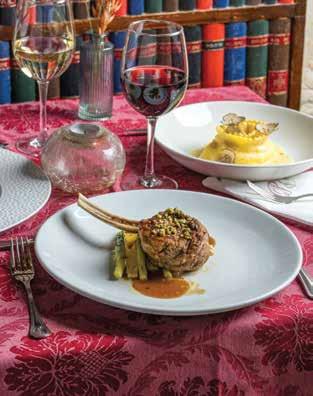
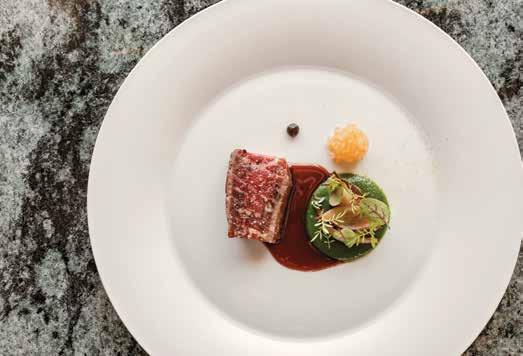

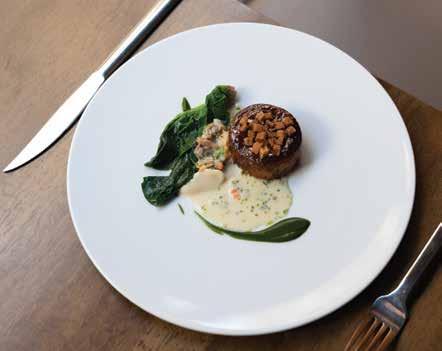
A cadre of visionary chefs is elevating Maltese cuisine to new heights, blending deep-rooted traditions with a progressive culinary mindset. They talk to Sarah Muscat Azzopardi about the island’s rich gastronomic heritage, its hidden local gems, their favourite dining spots and the exceptional native ingredients that are positioning Malta as a premier destination for the discerning palate.

PHOTO BY BRIAN GRECH

‘The Maltese ‘slice’ is tradition, it’s nostalgic’
Michelin Star Chef Victor Borg, Executive Chef at Under Grain, Valletta
“Malta enjoys a strategic position – right in the middle of the Mediterranean Sea – giving us the opportunity to be influenced by all the countries around us, such as Greece, Spain, Italy, the South of France, and Morocco,” begins award-winning chef Victor Borg, shining a light on the diverse cultures that have shaped his approach to cuisine.
“At Under Grain, one can find wild fish on the menu, sustainably caught from our Mediterranean Sea,” he explains, highlighting a personal dish that he feels represents Maltese culinary heritage. “Its accompanying beetroot, cherry tomatoes and

raspberries are all sourced from local farmers, and the twist is that we finish it on a Japanese yakitori-style barbecue grill – a nod to how we Maltese love a good barbecue by the beach,” he adds.
Moreover, Malta has access to an array of exceptional Mediterranean ingredients which chef Borg enjoys incorporating into his dishes depending on the season. “In spring, for example, I love to showcase the abundance of peas, broad beans, artichokes, and Gozo asparagus in my dishes,” he reveals.
Beyond his own restaurant, chef Borg highlights several culinary gems that showcase authentic Maltese flavours and techniques. He mentions San Remo in Mosta, noting their traditional preparations of snails and rabbit in garlic as exemplary of local culinary heritage.
For a taste of classic desserts, he recommends a ‘Maltese slice’ from Tony’s, the traditional ice cream truck at White Rocks in Baħar iċ-Ċagħaq.
“Tony’s serves the classic ‘slice’”, he says, “a uniquely Maltese ice cream made with vanilla, candied fruit, walnuts, and sponge soaked in Martini, all cut into a slab and served between two biscuits. It’s tradition, it’s nostalgic,” he smiles.
‘Marsaxlokk fish market is one of the most authentic, living representations of the
archipelago’
Nikolai Abela, Head Chef at Michelinrecommended Grotto Tavern, Rabat
Chef Nikolai Borg describes the island’s rich history as a hodgepodge of influences which all come together in its cuisine. “This can be seen through the spices, seafood, use of citrus, olive oil, and herbs such as mint and dill,” he maintains, yet instead of replicating these influences, he enjoys reinterpreting them in a way that still captures their essence on his menu.
“The ‘Burmarrad Organic Cauliflower’ is a perfect example of this –where koji and miso are used to elevate a local ingredient. Different food cultures are also reflected in the dish through our own tradition of fermenting and preserving. The bużbieża (fennel) liquor brings it back to its origins, while verjus adds a brightness reminiscent of other cuisines,” the chef says.
Still, the dish that best represents Maltese culinary heritage at Grotto Tavern, according to chef Abela, is ‘Ħaruf ta’ Misraħ II-Fidwa’ – locally
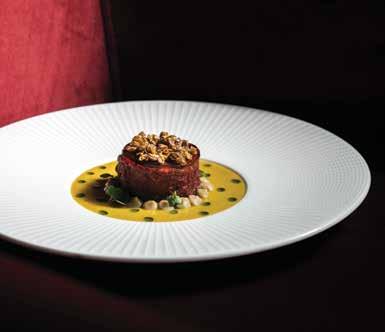
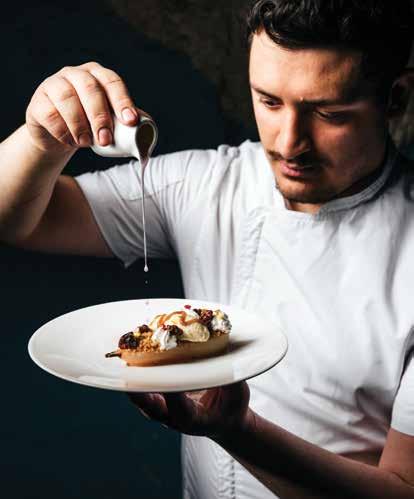
sourced lamb paired with aubergine, za’atar, molasses, and lentils. “Lamb has long been a staple of traditional Maltese feasts and countryside meals, reflecting the island’s agricultural roots and other Mediterranean influences.”
And while Malta’s climate provides an abundance of exceptional ingredients, chef Abela highlights products by local brand Delectat as truly exciting. “They produce exceptional artisanal goat and sheep cheeses, sourcing milk from local farmers within the vicinity of their dairy, ensuring the freshest possible ingredients,” he reveals, explaining that, by employing advanced techniques like probiotic fermentation, they eliminate the need for chemical preservatives, resulting in a distinctive and natural flavour profile.
Beyond Grotto Tavern, chef Abela finds it difficult to name a personal favourite eatery, given the “array of fantastic dining spots in in Malta”. If pressed, he highlights Michelin-Starred Noni, in Valletta. “This restaurant truly embodies the essence of Maltese cuisine with a modern twist. Their signature dish, Ta’ Gużman Organic Potatoes, is a must-try,” he says.
As for a hidden gem, the young chef recommends a visit to Marsaxlokk fish market, held every Sunday morning in the picturesque fishing village.
“This market is one of the most authentic, living representations of the Maltese archipelago, and is not only a draw for tourists but is also where locals shop for their Sunday lunch.” Here, he says, you can find seasonal seafood as well as stalls stretching well beyond just fish – including spices, preserves, lacework, local honey, and souvenirs. “You can immerse yourself in the atmosphere by watching fishermen mending nets, hearing vendors shouting out prices and admiring the brightly painted luzzijiet bobbing in the harbour, each with their signature eye of Horus. After the market closes, you can enjoy a meal at the various coastal restaurants specialising in seafood. My personal favourite is Tartarun.”

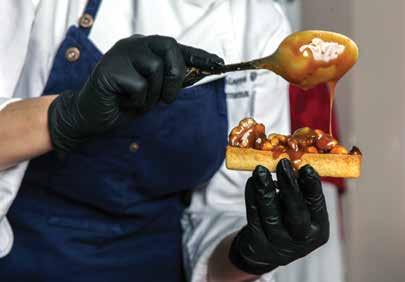
‘The intense sweetness and vibrant flavour of
tomatoes is truly unmatched’
“Malta’s rich tapestry of Mediterranean, Arabic, Sicilian, and British influences has taught me to blend bold flavours with subtlety and balance. It has given me the freedom to be creative while deeply respecting tradition – combining spices, herbs and slow-cooking techniques with a light, modern touch,” explains chef and restaurateur Ramona Preca.
Among the dishes that best represents Maltese culinary heritage at Palazzo Preca is one that celebrates Malta’s local goat cheese. “We enhance its flavours with a touch of our home-made local tomato chutney, adding a sweet and tangy element that complements the cheese beautifully. Additionally, we sometimes prepare fresh home-made pasta with rabbit – another Maltese favourite – finished with a delicate pecorino cream for a rich and comforting twist on classic flavours,” the chef describes.
Another local ingredient the chef enjoys working with is Maltese tomatoes. “Their intense sweetness and vibrant flavour are truly unmatched. We use them at their peak in summer to create fresh sauces, jams and garnishes, allowing their natural beauty to shine through,” she reveals. “I also love using globe artichokes, which are a seasonal treasure – perfect for hearty, rustic dishes. And of course, local strawberries – they are incredibly fragrant and sweet, and
we often showcase them simply, to highlight their pure, sunkissed flavour.”
Beyond her own restaurant, which she runs alongside her sister, Roberta, the chef recommends visiting Ta’ Nenu in Valletta for a truly authentic taste of Maltese cuisine: “their traditional ftira and slow-cooked rabbit dishes beautifully capture the spirit of our island.”
In Gozo, meanwhile, she adds, “Ta’ Rikardu in Victoria holds a special place in our hearts. We used to frequent it often when we were young, as our father was deeply in love with Gozo. Their hand-made Gozitan cheeselets (ġbejniet) and traditional hearty dishes are rich in rustic, genuine flavours that instantly transport you to the heart of the island.”
There are also a few hidden gems that highlight Malta’s culinary and agricultural heritage, including the Ta’ Qali Farmers’ Market, “where visitors can find the freshest local produce, artisanal honey and traditional sweets – a real showcase of Malta’s agricultural bounty,” she maintains.
“Marsaxlokk, particularly on a Sunday morning when the market is active, offers fresh fish straight from the boats and reflects authentic Maltese food traditions,” chef Preca adds.


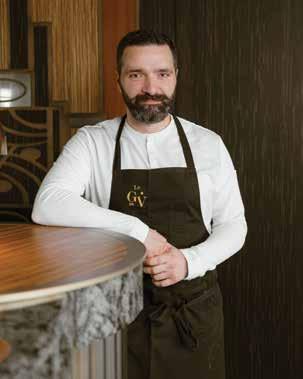
‘We are lucky to be close to diverse cuisines and able to use excellent products from mainland Italy, Sicily, North Africa and Greece’
Executive Chef Andrew Borg and Pastry Chef David Tanti at Michelin-Starred Le GV Restaurant, Sliema
“In Malta, we are lucky to be very close to diverse cuisines and able to use excellent products from mainland Italy, like truffles, mangoes from Sicily and spices from North Africa,” begins chef David Tanti. Chef Andrew Borg adds, “we are significantly influenced by our neighbouring countries. The use of spices from North Africa is prominent, as well as influences from Sicily and Greece.”
At Le GV, chef Tanti points out the sourdough ftira (flatbread) as the dish that best represents Maltese culinary heritage, explaining, “I am shaping it in a way to make it lighter and crispier while it is baking. It is excellent for spreading the olive oil butter and pork fat that we serve it with.”
For Borg, it’s a John Dory cooked on the barbecue and served with a ragout of octopus and green asparagus from Gozo. “These are the finest ingredients at their best. While this is not a traditional Maltese dish, the experience of eating it is truly delightful,” he maintains.
As for local ingredients they’re excited about, Tanti highlights local strawberries. “When in season, we use strawberries from Mġarr, which we vacuum-pack and steam to release their juice – it is very clear in colour, and delicious,” he maintains. Chef Borg, meanwhile, loves tomatoes, particularly in the summertime. “We use tomatoes throughout the menu – we dry,
ferment, pickle, make sorbets, grill them, and create sauces. I think they are the most versatile ingredient we have,” he explains.
Beyond their own restaurants, the chefs highlight elements of Maltese cuisine they particularly appreciate. For Tanti, pastizzi are a classic example, though he admits, “I think I prefer qassatat to pastizzi!” Borg mentions Verbena in Mġarr as a place where he particularly enjoys the chef’s approach: “I like to leave my order up to the chef,” he explains.


‘I’m deeply inspired by the sea and everything it offers – dentex, amberjack and red prawns, just to name a few’
Hiram Cassar, Head Chef at Michelin-Starred Fernandõ Gastrotheque, Sliema
“Malta is at the heart of the Mediterranean – and so is my cooking. I draw on its mix of cultures to blend tradition with creativity, using local fish, lamb and seasonal produce to tell a story that’s both rooted and always evolving,” begins chef Hiram Cassar, pointing to the confit of local lamb from Ta’ Żeppi Farm on the restaurant’s current tasting menu as a dish that particularly represents Maltese culinary heritage.
“The lamb is slow-cooked for 12 hours, then carefully deboned and rolled into a delicate ballotine. It is glazed with a reduction of its own jus and served with fresh clams and seasonal vegetables – a contrasting yet remarkably harmonious pairing,” he maintains.
His personal favourite local ingredient, however, is fish. “I’m deeply inspired by the sea and everything it offers – dentex, amberjack and red prawns, just to name a few. Whether baked, roasted, grilled, braised, aged, cured, poached, or served raw, each preparation reveals a different expression of the sea’s bounty,” the chef reveals.
It is no surprise, therefore, that one of his favourite local restaurants is Tartarun in Marsaxlokk. “Go for the local fish and their famous prawn carpaccio,” he advises, noting the restaurant’s commitment to seasonal Maltese ingredients.
He also emphasises the quality of Michelin-starred restaurants in Malta. “An extraordinary effort is made to put local produce at the forefront,” he says, highlighting how fine dining showcases the best of Maltese culinary heritage.
Additionally, he mentions Ta’ Betta Wine Estate, “a wonderful place to enjoy artisanal wines while experiencing the serene countryside and panoramic views,” underscoring the island’s tradition of local wine production.
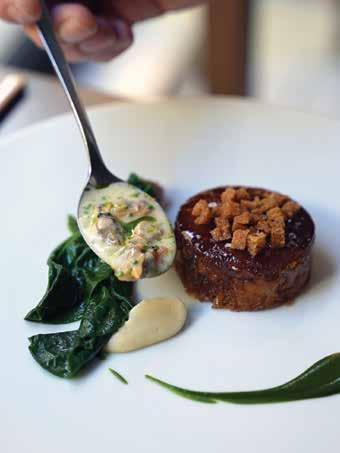


In a fast-moving world where digital innovation, global tax developments and climate change are rewriting the rules of business, accountancy professionals have become key players in economic resilience. In Malta, the Malta Institute of Accountants (MIA) is at the forefront of this shift, evolving from a guardian of professional standards into a driving force of national competitiveness. At the helm is Maria Cauchi Delia, its Chief Executive Officer, who describes accountants as “the bedrock of trust in Malta’s economy”.

“We need to showcase Malta not only as a place of professional opportunity, but also as a place where people can build their lives.”
FOR
INSTITUTE’S MISSION IS
“Our role is not only to support accountants, but to help strengthen the very foundations of Malta’s competitiveness.”
The institute’s remit is deliberately broad, covering technical guidance, professional education, ethical standards, and national and EU-level policy input. Rather than viewing these as separate responsibilities, Ms Cauchi Delia insists they must be fully integrated.
“Everything we deliver must be practical, relevant and forward-looking,” she says, noting how EUlevel policy trends inform technical guidance while training programmes combine market realities with ethical imperatives. This integration, she explains, ensures that value creation ties all the institute’s functions together.
Collaboration is a cornerstone of the MIA’s work. Its partnerships and ongoing exchanges with the Malta Financial Services Authority, the Financial Intelligence Analysis Unit, the Malta Business Registry, the Malta Tax and Customs Administration, Malta Enterprise, the Malta Gaming Authority, and other authorities ensure that Malta’s business environment remains robust yet workable.
“Our feedback helps shape policies to be locally and internationally aligned while proportionate for smaller jurisdictions like Malta,” she explains, adding, “by serving as a bridge between authorities and our members, we ensure that regulation is not just technically sound, but also practical for businesses.”
The CEO is adamant that competitiveness must be treated as a national priority, stating that it is a theme the institute pushed strongly at its 2025 Biennial Conference and again through the proposals put forward for Budget 2026.
“True progress requires regulators, Government, business and education to work together. Malta cannot afford fragmented policymaking or slow implementation if it is to keep pace with global change,” she warns.
Over the past few years, the institute has significantly strengthened its international role. “It is imperative that we have comprehensive visibility of global developments to enable us to undertake the necessary discussions locally, provide our input at European and international fora, and adapt effectively,” Ms Cauchi Delia explains, noting, “this gives us the ability not only to react, but in some cases to secure a first-mover advantage.”
This proactive stance is particularly important as Malta faces sweeping reforms in sustainability and taxation. The EU’s Corporate Sustainability Reporting Directive and the European Sustainability Reporting Standards will elevate sustainability disclosures to the same level as financial statements, pushing companies to embed environmental, social and governance considerations into their operations.
For Malta, with its SME-dominated economy, this presents both risk and opportunity. “We are guiding our members and working closely with local authorities to ensure that implementation is practical and proportionate,” Ms Cauchi Delia says.
“True progress requires regulators, Government, business and education to work together. Malta cannot afford fragmented policymaking or slow implementation if it is to keep pace with global change.”
“Our priority is to make sustainability a strategic pillar, not just a compliance exercise.”
On taxation, the stakes are equally high. Malta’s open, service-based economy is sensitive to global changes, from Pillar II reforms to developments in key trading partners like the United States. Here, too, the MIA has stepped in with technical expertise and a holistic perspective.
“Our role is to provide guidance that is not only technically sound, but strategically coherent, aligned with broader priorities like investment, digitalisation and sustainable growth,” she explains. Through evidence-based feedback, conferences and working groups, the institute is preparing members for both the technical and strategic implications of change.
The MIA’s work in these areas builds on the lessons of Malta’s greylisting, which its CEO describes as a turning point, even for the institute. “That period demonstrated that the institute is not only a professional body, but a guardian of economic stability,” she reflects, adding, “we continue to apply that same spirit of vigilance and proactivity to the reforms that lie ahead.”
Yet, while regulation is vital, competitiveness ultimately depends on people. “The boldest and most necessary step is to invest decisively in talent. Without a skilled and adaptable workforce, Malta will not be able to sustain competitiveness in an era of global change,” she warns.
For the institute, this has meant expanding professional development to equip accountants with future-facing skills in AI, digital finance, sustainability, and ethical leadership. Its Continuous Professional Education portfolio and conferences have been redesigned to embed
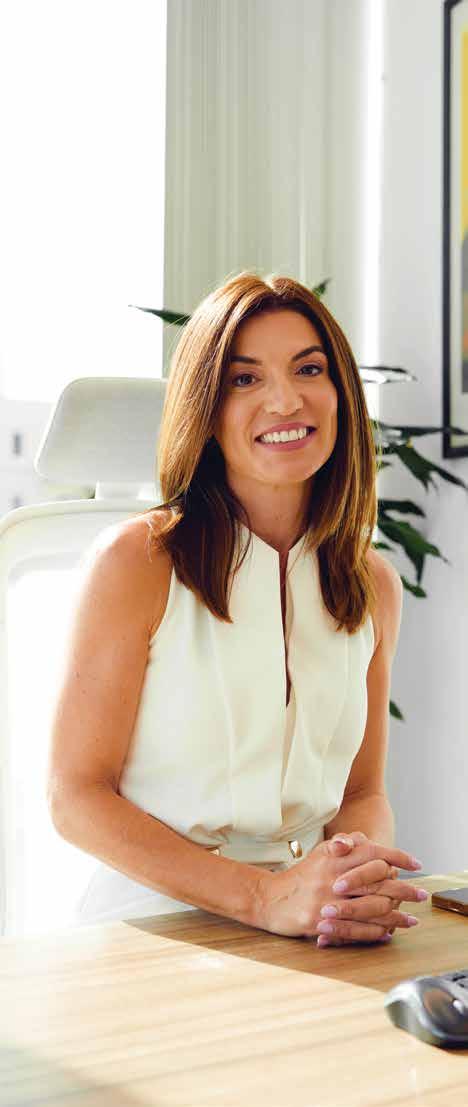

adaptability, resilience and strategic thinking. The message is clear: Malta’s accountants must be future-ready.
At the same time, the institute is challenging outdated stereotypes to attract new generations to the profession. Its #AccountsForYou campaign, rolled out in schools, career fairs and on social media, seeks to reframe accountancy as a dynamic, impactful career. Partnerships with ACCA, University of Malta, MCAST, and other educational institutions ensure education stays relevant to industry demand, but Ms Cauchi Delia stresses that retention is just as important as attraction.
“We need to showcase Malta not only as a place of professional opportunity, but also as a place where people can build their lives,” she says. That means better incentives, competitive compensation, clear career progression, and quality of life advantages. It also requires removing administrative bottlenecks and improving integration of foreign professionals.
“This challenge demands systemic change, and we are determined to keep it front and centre of the national debate. Administrative bottlenecks must be removed, foreign talent must be better integrated, and local education must remain world-class and adapted to evolving needs. This requires coordinated action at policy and industry levels,” she maintains.
The institute has also carried out a professional engagement survey to better understand the realities facing members. Ms Cauchi Delia explains that to a large extent, “the findings confirmed what the institute had already been hearing and experiencing first hand, but
the detailed data allows us to move beyond anecdotal feedback.”
As the role of accountants evolves, so too does their influence. Increasingly, professionals are moving into strategic positions, whether as CFOs, COOs, CEOs or as advisors on risk, ESG and digital transformation. The MIA is equipping its members to embrace this shift.
“Accountants bring the ability to analyse and interpret data, manage risk, understand governance, and provide assurance – all qualities that organisations need to thrive in uncertain times,” she notes. Their presence is particularly vital in emerging niches like ESG finance, digital services and family offices. “Without the profession, Malta cannot credibly compete in these sectors,” the CEO affirms.
Looking ahead, Ms Cauchi Delia is optimistic about what the institute can achieve.
“We want to see a stronger investment in talent, seamless integration of sustainability and digital skills, and greater influence on both national and EU policy,” she says.
The challenges are significant, from responding proactively to fast-changing tax reforms to keeping pace with technology. Yet she is confident that the institute’s proactive and collaborative approach will ensure success.
“Ultimately, our work matters because it underpins the credibility of Malta’s business environment and sits at the heart of the country’s economic ambitions,” she concludes. “When the profession is strong, businesses thrive, investors trust the jurisdiction and the wider economy benefits.”
”We want to see a stronger investment in talent, seamless integration of sustainability and digital skills, and greater influence on both national and EU policy.”
‘This is not a
As The Convenience Shop Group celebrates its 100th store and launches its bold new ‘My’ identity, CEO David Tabone speaks with Lyndsey Grima about how Malta’s largest convenience retailer is reshaping its shopping experience.
THE RETAIL SCENE IN MALTA IS EVOLVING RAPIDLY, WITH THE CONVENIENCE SHOP GROUP AT THE CENTRE OF THIS TRANSFORMATION. What started 16 years ago as a single store has grown into a well-known brand, with 100 locations across Malta and Gozo. This milestone is more than just the number of stores; it represents a pivotal opportunity to reshape the group’s identity, clarify its vision and respond to evolving customer needs.
This year, the group officially launches its new brand identity under the name ‘My.’ The aim is to provide personalisation, innovation and trust, while staying connected to the local communities it serves.
David Tabone, CEO of The Convenience Shop Group, views the rebrand as a natural step and an important move forward. “Reaching our 100th
shop is a proud moment and a strong turning point for us,” he says. “Our customers and their needs have changed, and we want to show that we are changing with them.”
The aim of the new ‘My’ brand architecture is to consolidate the company’s diverse outlets under a single corporate umbrella. The identity is built on a strong, modern green; a colour that is widely identified with trust and continuity. Within this framework, two core retail brands have emerged: MyConvenience and MySupermarket.
While MyConvenience retains its familiar bright yellow – a visual cue long associated with speed, efficiency and accessibility – MySupermarket introduces a lighter, more casual green, designed to convey comfort and ease. Whether customers are popping in for a quick purchase or planning a full grocery shop, this two-tiered approach provides immediate clarity.


“We chose this colour system for more than its aesthetics,” Mr Tabone explains. “It reflects a fresh, modern personality for us and makes the shopping journey more intuitive.’’
While the visual identity marks a striking change, the transformation goes beyond. The group has invested heavily in innovation, both digital and physical, to strengthen the customer experience. “Our new identity represents ongoing investment in people, formats and technology,” notes Mr Tabone. “Customers can now expect digital solutions, smarter store layouts and an overall enhanced experience, in-store as well as online.”
At the heart of this strategy is the My app, which combines shopping, loyalty and rewards into one easy-to-use digital platform. Through the app, customers can order online for quick delivery, manage their MyRewards account and view personalised offers. The rewards are generous and engaging: users earn points with every purchase; they get more points for larger orders and double points for regular visits. Most importantly, the points can be immediately redeemed as cash vouchers at both MyConvenience and MySupermarket locations.
“What makes our platform unique in Malta is its simplicity and personalisation,” Mr Tabone says. “It’s not about gimmicks, but about creating tangible value for our customers in a fun, straightforward way.”
One of the challenges of introducing new digital tools is ensuring inclusivity for customers who may not be comfortable with apps. The group has addressed this by offering alternative ways to access rewards, as well as training staff to support less tech-savvy customers.
Yet for all its investments in technology, The Convenience Shop remains firmly focused on people. “Retail is ultimately about human connection,” Mr Tabone affirms. “Technology should make life easier, but it can never replace the smile at the till or the friendly word with a regular customer.”
“Our role is to support and reflect the communities we serve. By celebrating what makes each place unique, we connect with people in ways that are meaningful to them.”
To this end, the company has invested in training programmes to ensure staff are equipped to deliver the high standards the new identity demands. Personal interaction remains central to the group’s service philosophy, with digital tools serving to enhance, not replace, the human experience.
The journey to rebranding was not without its challenges, the CEO acknowledges, with one of the biggest hurdles being aligning the company’s diverse, organically grown operations into a cohesive whole. “Over 16 years, we expanded rapidly and in different directions,” explains Mr Tabone. “Our challenge was to unify this growth under one clear brand, while remaining true to the needs of today’s communities and anticipating those of tomorrow.”
Market research was essential in shaping the rebrand. By listening to customer feedback, the group designed an identity and strategy that reflect real consumer expectations. Strong project management and


a clear execution plan helped overcome logistical hurdles, ensuring the transition was smooth and timely.
In addition to innovation, a key priority for the group is sustainability – for The Convenience Shop, the CEO maintains, growth and responsibility go hand in hand. The group is investing in energy-efficient store designs, upgrading equipment to reduce electricity use, and cutting packaging waste when possible. Responsible sourcing throughout the supply chain is also a key part of its strategy.
“These measures aren’t afterthoughts – they are built into our expansion plans,” stresses Mr Tabone. “Our goal is that every new shop and every innovation strengthen not only our business, but also our contribution to a more sustainable Malta.”
The company’s commitment to social responsibility goes beyond environmental measures. Through partnerships with NGOs and community initiatives, The Convenience Shop has long supported important causes across Malta and Gozo. The rebrand provides a more organised way to expand these efforts, ensuring that the group’s success continues to benefit society.
Another defining characteristic of The Convenience Shop’s growth has been its close relationship with local communities. Each outlet is seen not just as a store, but as part of the neighbourhood fabric. The rebrand builds on this legacy, introducing creative projects inspired by Malta’s cultural heritage.
“We feel we are part of Malta’s daily life,” says Mr Tabone. “Our role is to support and reflect the communities we serve. By celebrating what makes
each place unique, we connect with people in ways that are meaningful to them.”
In many ways, Malta is moving in step with European retail trends: digitalisation, demand for convenience, and hybrid models combining online and offline shopping. However, according to the CEO, Malta’s small scale and strong sense of community give it a unique edge.
“Malta offers an opportunity to test and adopt innovations quickly,” Mr Tabone explains. “It allows us to blend global trends with a very local touch. Our rebrand positions us to bridge both worlds.”
The company sees online grocery and hybrid models not as optional, but as essential to the future of retail. Click-and-collect, home delivery, and digital-first shopping experiences are already being integrated into the group’s strategy, supported by the infrastructure of the My app and loyalty ecosystem.
For Mr Tabone, the most exciting part of this new chapter is the chance to elevate a household brand to its full potential. “This is not a finish line but rather the start of a new journey,” he reflects. “The future of retail is dynamic, and Malta is more than ready for bold ideas. Knowing that we are shaping that future is both humbling and energising.”
The vision for the next decade is clear: to remain Malta’s foremost community-minded retail group, trusted for its innovation, inclusivity and social responsibility. “We want to keep leading, keep innovating and keep giving back,” Mr Tabone concludes. “The new identity is just the first step in a much bigger journey.”
“The future of retail is dynamic, and Malta is more than ready for bold ideas. Knowing that we are shaping that future is both humbling and energising.”

“When people feel supported and valued, they bring their best ideas forward”
Head of People and Culture Dorianne Campbell explains to Edward Bonello how CLA Malta goes the extra mile to create a healthy environment that treats employees as the organisation’s most valued assets.
“IN A LANDSCAPE WHERE BUSINESSES ARE CONSTANTLY COMPETING TO ATTRACT
AND RETAIN THE BEST TEAM MEMBERS that give them an edge, a strong culture that treats people as one of the organisation’s most important assets is no longer optional – it is a differentiator,” says Dorianne Campbell, Head of People and Culture at CLA Malta. “In fact, today we refer to our efforts as ‘People and Culture’ because what we do places the individual – and the culture they bring with them – at the centre of our company.”
With 17 years’ experience in the field, including time in large-scale manufacturing companies addressing a wide range of needs, Dorianne brings with her the conviction that genuine appreciation for team members fuels both innovation and performance. At CLA Malta – which delivers tailored business consulting and specialist support, acting as a strategic core partner for its clients –this approach aligns closely with the firm’s mission. Through services spanning audit, tax advisory, business advisory, and global mobility solutions, the firm’s success depends on the people who bring these to life.
“Without the people who run departments, meet clients and strike deals, no organisation can operate or succeed,” she continues. “Every individual brings unique characteristics, beliefs, values, and personality. Given that we often spend more hours at work than with our loved ones, it is crucial that we feel appreciated, seen and listened to in the workplace.”
This philosophy has become particularly relevant at CLA Malta, where the team has grown rapidly to 140 professionals in a very short period. Its workforce represents a tapestry of nationalities and backgrounds, working side by side in a truly international environment.
Integration, Dorianne notes, cannot be imposed. “People naturally interact with those they feel most comfortable with, but our role is to create the conditions where everyone feels part of the team. That sense of belonging makes a real difference.”
“A healthy work culture doesn’t just retain employees; it transforms them into advocates for their company. When people feel supported and
“Without the people who run departments, meet clients and strike deals, no organisation can operate or succeed.”
“A healthy work culture doesn’t just retain employees; it transforms them into advocates for their company.”
valued, they are more likely to bring their best ideas forward and speak positively about their organisation in the market.”
While perks such as study leave, flexible hours and remote working are welcome, they are only part of the equation. At CLA Malta, culture is cultivated through leadership that actively encourages inclusion, collaboration and open dialogue. Employees are empowered to think creatively, take ownership and help shape the future of the firm. In this way, culture becomes embedded in daily practice, not just written into policies.
Employer branding, Dorianne stresses, is another critical element. Platforms such as LinkedIn have made every employee a brand ambassador. “Authenticity is key,” she says. “The external image must reflect the real lived employee experience. When people feel proud of their jobs, they truly become the organisation’s most valuable assets.” CSR initiatives, social activities and a commitment to listening all strengthen this bond, creating a workplace where pride naturally translates into reputation.
CLA’s recent move into new offices further reinforces this culture. “The new offices, apart from being visually attractive, were designed with employees in mind – featuring open layouts, breakout areas and full digital connectivity that encourage spontaneous conversation and collaboration. More than aesthetics, the space is a physical expression of our values of openness, well-being and balance. In a hybrid era, offices must be more than desks and chairs – they must
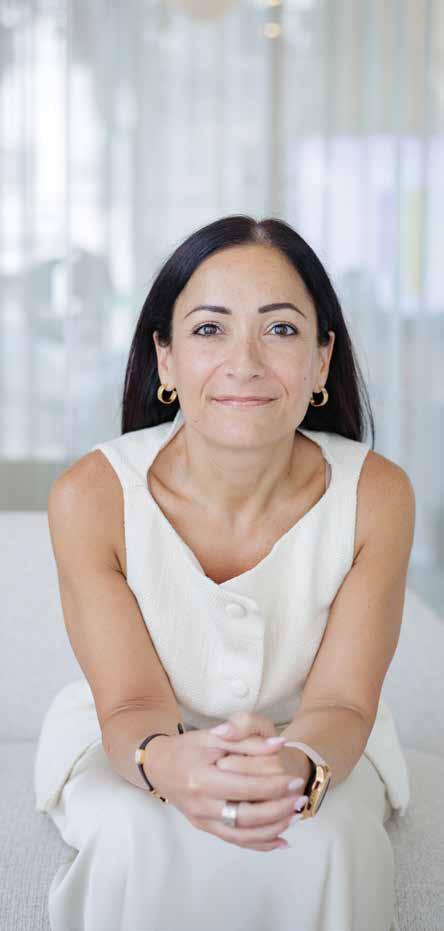

function as hubs for innovation and connection,” Dorianne continues.
Still, Dorianne is clear that true belonging takes time, and building teams is a long-term project. “Trust is not built overnight. It requires consistency, open communication and concrete action on feedback. Employees need to see that their voices lead to real change. That is what builds belonging.”
In keeping with her philosophy, Dorianne regularly walks through different departments, listening directly to staff and sensing the atmosphere in each unit. “As the company grows, it’s vital that no one feels left behind or reduced to a number. The satisfaction I get when an issue is resolved, and an employee feels heard is incomparable.”
The diversity of CLA Malta’s workforce reflects the shifts shaping today’s workplace. Younger employees increasingly seek purpose-driven roles, while more experienced colleagues often value stability. Yet, as Dorianne points out, the core needs are universal: communication, growth,
flexibility, and balance. “Bridging differences in communication styles or approaches to technology requires respect and adaptability,” she maintains. But when grounded in a shared mission, those differences become strengths.”
For Dorianne, the challenges ahead are clear. “Organisations must grow and innovate, but employees can suffer change fatigue if the pace feels overwhelming. That is where People and Culture becomes a crucial bridge, aligning business strategy with personal and professional growth.”
By connecting ambition to capacity, CLA Malta ensures that its people remain engaged, motivated and aligned with the company’s long-term vision. “Employee expectations are evolving quickly, with increasing emphasis on well-being, flexibility and personalisation. At CLA Malta, surveys, dialogue and data-driven insights help us anticipate these needs. Ultimately, cultural transformation is not about chasing trends – it is about creating an environment where people feel they belong, contribute meaningfully and grow.”
“Trust is not built overnight. It requires consistency, open communication and concrete action on feedback. Employees need to see that their voices lead to real change. That is what builds belonging.”
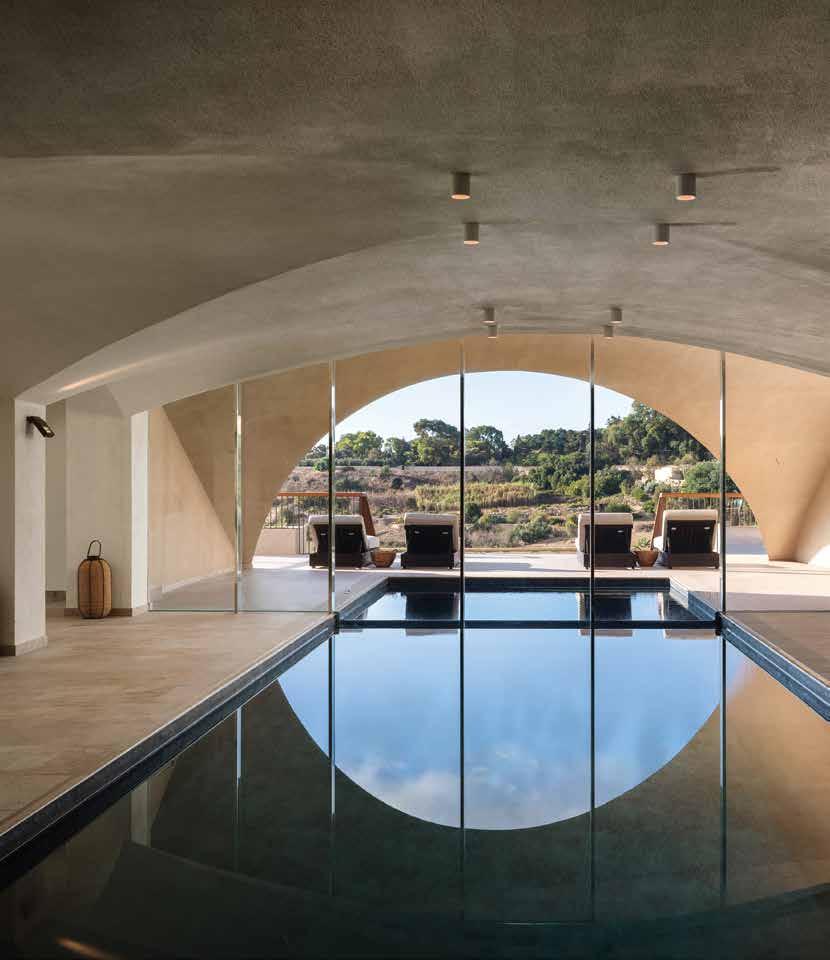


Delving into the driving force behind one of Malta’s most ambitious architectural rebirths, Sarah Muscat Azzopardi meets the sister-duo behind the new Verdala Wellness Hotel: Denise Xuereb, who led the development of the landmark project, and Claire Xuereb, who conceived its unique wellness concept, to explore the transformation of the iconic Grand Hotel Verdala –balancing a celebrated history with a forward-thinking vision for holistic well-being and understated luxury.
THE GRAND HOTEL VERDALA, WHICH FIRST OPENED IN 1971, HOLDS A DISTINCT PLACE IN MALTA’S COLLECTIVE MEMORY. A landmark of 1970s glamour and ambition, it dominated the Rabat skyline for decades before closing its doors in 1997. To reimagine such an icon is to walk a fine line between preservation and progress – a challenge embraced by the next generation of the Xuereb family, the driving force behind AX Group.
Bringing such a nuanced vision to life was a multi-layered process that demanded architectural sensitivity and design integrity at every stage. The architectural envelope, designed by C&K Architects, reimagines the hotel as a sculpted retreat emerging from the natural ridge. This was complemented by the work of Dubai-based interior design studio LW, who curated the internal spaces.
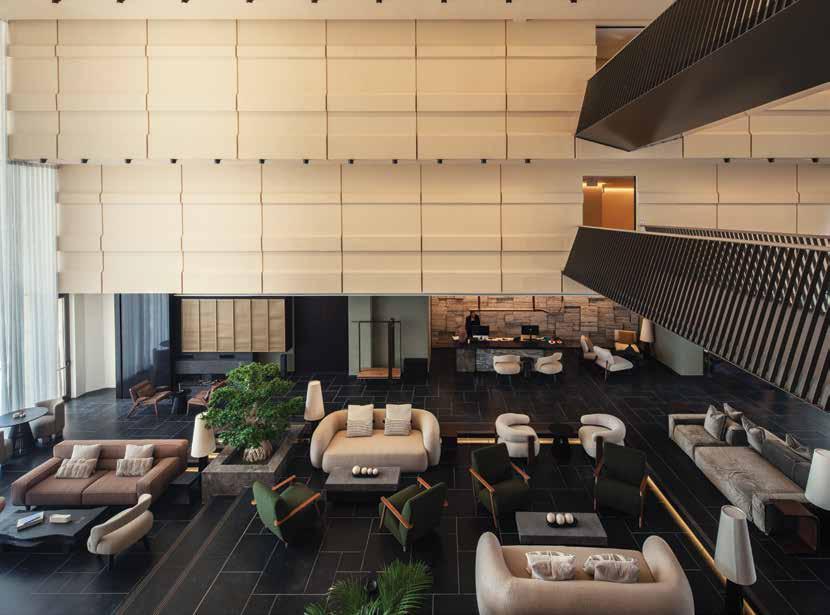
Then, it was AX Group’s Development and Construction team, led by Denise Xuereb, that carried the ambitious project through from the initial permit stages to completion, while Claire, as Director of Hospitality and Care, created the innovative concept and operational philosophy behind it; a first of its kind on the island. Together, their symbiotic approach has resulted in something truly remarkable – a five-star destination that not only pays homage to its celebrated history but sets an entirely new benchmark for luxury and well-being on the island.
“Wellness was not added as a feature; it was designed into the fabric of the building. Every void, courtyard and terrace encourages stillness and reflection, turning the architecture itself into a restorative experience.”
Denise Xuereb
The project began not with a sketch, but with a deep consideration of the past. The original hotel, as Denise explains, was a product of its time. “When redeveloping the Grand Hotel Verdala, our goal was to honour its legacy without repeating its form,” she begins. “The original structure was a powerful monolithic block – a hallmark of its time, but one that dominated its surroundings and obstructed views of the valley. Our challenge was to reinterpret that architectural boldness in a way that celebrates openness, balance and connection – principles that lie at the core of wellness.”
The solution was as radical as it was respectful. Instead of a single, imposing structure, the new design breaks the mass apart. “By splitting the original mass into a series of terraced, layered volumes, we re-established a dialogue with the landscape,” Denise notes. This approach had multiple benefits, softening the hotel’s visual impact and restoring sightlines for the surrounding community. More profoundly, it tethered the building to its environment. “It now mirrors the natural rock strata of the cliffs, using depth and light, to create a structure that mimics part of the terrain rather than imposes upon it,” she states.
This deep connection to nature is central to the Verdala ethos. It is not merely a hotel with a spa attached – rather, it is a space where restorative principles are embedded in the very foundations. “Wellness was not added as a feature; it was designed into the fabric of the building,” Denise says with conviction. “Natural light, cross-ventilation, visual connection to the landscape, and the use of organic materials were all deliberate design tools to promote a sense of calm and equilibrium. Every void, courtyard and terrace

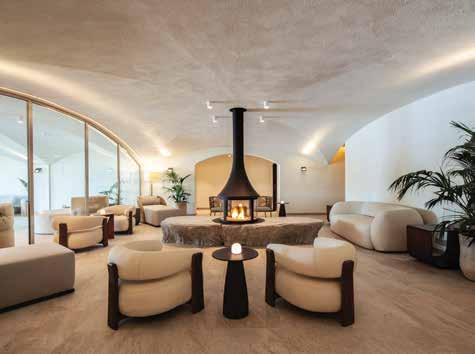
“Luxury is very subjective, but in my opinion, it is space in today’s world, and we offer that mental and physical space for you to achieve the balance you need in your life — the space to breathe, reflect and recharge.”
Claire Xuereb
encourages stillness and reflection, turning the architecture itself into a restorative experience.”
Asked to name a single design detail she is most proud of, Denise points to what she calls the ‘carved valley corridor’ – this, she explains, is “a continuous spatial opening that runs from the main arrival, through the lobby, and extends visually toward the valley beyond.” Certainly, it is more than a simple passageway, she affirms, noting, “it acts as the spine of the hotel, aligning light, views and movement throughout the building. It transforms what was once a solid, enclosed structure into one that feels open, layered and connected to its surroundings.”
While Denise shaped the building, Claire curated the experience within it, guided by a clear and holistic vision. “Our five pillars, namely Nutrition, Movement, Rest and Recovery, Emotional Wellbeing, and Community and Connection are not abstract ideals but principles that manifest physically throughout the hotel,” Claire explains.
At its core, Verdala Wellness Hotel is not prescriptive or performance-driven; it’s about achieving an inner balance that allows one to feel centred, calm, and inspired. Every space, service, and sensory detail has been created to gently guide guests toward a better state of being.
“Community and Connection is a very important pillar to us, and the design of the public spaces has been created to encourage the community to come together,” she says, highlighting the

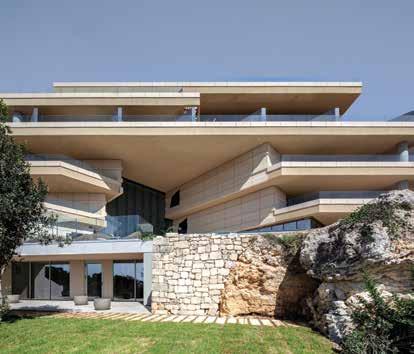
inclusion of “communal tables and seating areas, fireplaces for rituals to happen, and many areas which are enjoyed together, encouraging togetherness.” From the food and beverage offering, which balances nutritious, ingredient-driven menus with indulgent, flavourful options, to the state-of-the-art movement lab and treatment rooms, every aspect is designed to support these pillars.
The same approach extends to the hotel’s material palette. In an age of glossy, high-tech luxury, the Verdala embraces a more tactile and authentic approach, favouring earthy tones and natural textures like granite, marble and raw wood. The deliberate use of natural materials reflects the hotel’s aim of “nourishing the soul rather than vanity.” Claire elaborates, “the choice of raw materials used throughout all our spaces, including the rooms, is consistent and intentional. Natural elements: in colour, pattern and texture, were selected to set the tone and create an environment that resonates with you while you are there.”
The aesthetic draws inspiration from Japanese philosophy.
“The tone we adopted follows the Wabi-Sabi philosophy, which celebrates understated elegance and the beauty of simplicity,” Claire reveals. This, she believes, is the hotel’s greatest differentiator. “It’s what truly sets the Verdala apart from anything else. It captures the essence of our concept, where the focus is on the feeling we create for our guests rather than on aesthetics alone.”
Ultimately, Claire states that the new Verdala is about redefining what luxury means in a fast-paced world. It is less about opulence


“The tone we adopted follows the Wabi-Sabi philosophy, which celebrates understated elegance and the beauty of simplicity. This is what truly sets the Verdala apart.”
Claire Xuereb
and more about an invaluable, intangible feeling. She describes it as a “sense of quiet luxury… it is not about spectacle, but about how the environment makes you feel – centred, present and at ease.”
Offering a poignant modern definition of true luxury, Claire continues, “luxury is very subjective, but in my opinion, it is space in today’s world, and we offer that mental and physical space for you to achieve the balance you need in your life – the space to breathe, reflect and recharge.”
The philosophy finds powerful expression in the hotel’s emblem. “Another aspect that I am very proud of is the depth given to the spaces, which reflects the depth of the V that represents the Verdala,” Claire shares. This is not just a branding exercise but a core tenet of the guest journey. “The experience of depth is everpresent. This was not by chance; it is a deliberate reflection of what the V stands for. The V is deep, and as you move towards its centre, you reach the core – your own core. That is our goal: to connect with the inner self, where happiness truly lies.”
Through this combined vision, a landmark of the past has been reborn as a beacon for the future. The new Verdala Wellness Hotel introduces a pioneering concept to Malta: a destination where wellness is embraced as a complete way of life. Conceived and built entirely around the pursuit of balance, Verdala integrates wellbeing into every facet of the guest experience; from architecture that breathes with natural light to dining that nourishes both body and mind. It is a place where design, nature, and purpose come together in harmony, creating an environment that redefines what it means to experience true well-being.


For two decades, Pierre Bugeja, Founder and Director of Prevarti, has been at the forefront of art conservation in Malta. As Prevarti celebrates its 20th anniversary, Sarah Muscat Azzopardi sits down with Pierre to discover his impressive journey from solo practitioner in a small workshop to leading a state-of-the-art laboratory – as well as the delicate balance of preserving the past while building a business for the future.

STEPPING INTO THE VAST, LIGHT-FILLED SPACE OF THE PREVARTI LABORATORY IN MOSTA IS TO ENTER A WORLD WHERE CENTURIES CO-EXIST. The air here hums not with the noise of industry, but with the quiet, focused energy of meticulous craft. Enormous canvases, some telling epic biblical tales, lean against custombuilt easels, dwarfing the figures who work on them. A gilded statue stands sentinel on a workbench, awaiting its turn, while nearby, a restorer delicately touches a fine brush to the surface of a Renaissanceera portrait.
“The art is priceless. If you make a mistake on a painting from the 17th century, you can’t go back. There’s a huge element of trust.”
Guiding me through this hive of activity is Founder Pierre Bugeja, his passion palpable as he moves through the space. He pauses at each station, sharing the history of a darkened canvas or explaining the complex science behind cleaning a polychrome sculpture.
To be shown around by Pierre is to witness a master in his element, a man whose life’s work is a silent dialogue with history. It is a rare and inspiring glimpse into a world where science, history and artistry converge – a world he has built from the ground up. This year marks a significant milestone for the company, celebrating 20 years since Pierre took a leap of faith into a field that, at the time, had no clear path in Malta.
“I didn’t always know my path was related to art,” Pierre begins, reflecting on his journey. He started out, surprisingly, in industrial electronics – a world away from the priceless artefacts he handles today. Yet, art was in his blood. “I come from a family of sculptors and even a restorer, though I didn’t know it at the time,” he confides.
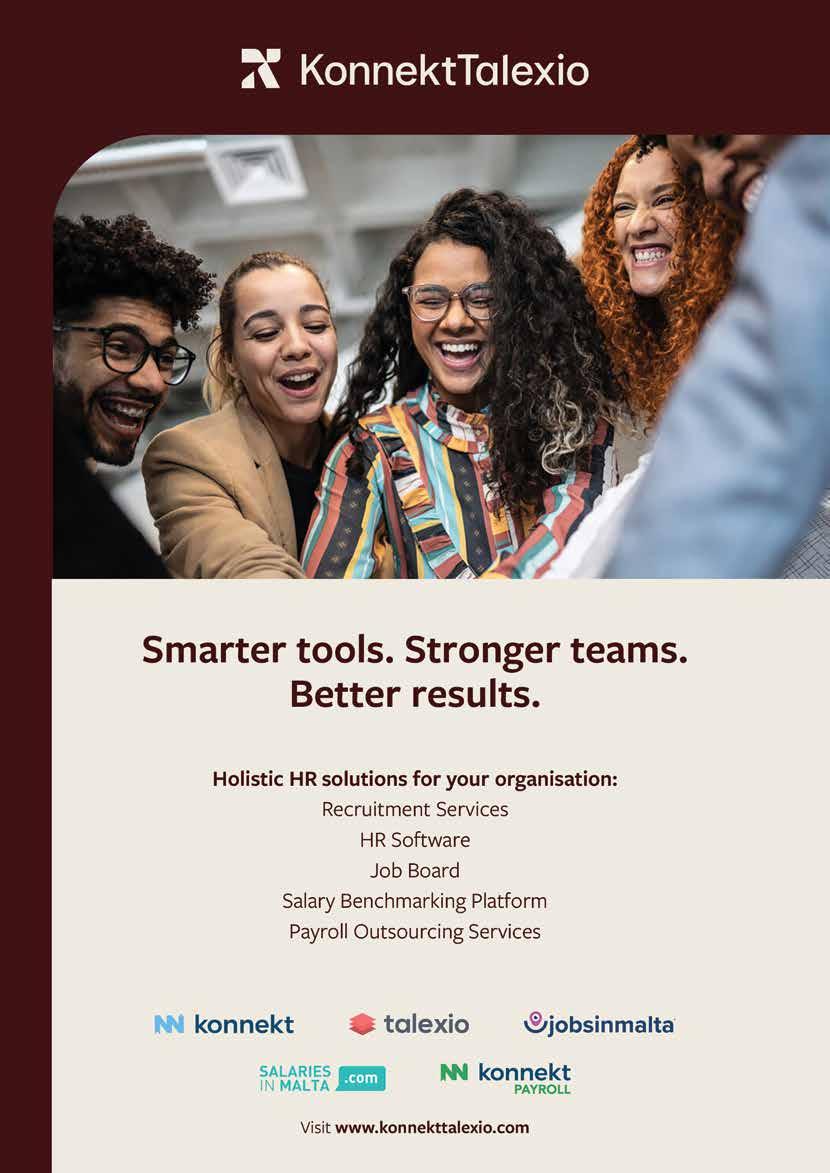


This philosophy ensures that projects are never rushed. Time is a crucial ingredient in the restoration process – a concept that has to be carefully communicated to clients. It’s a business model built on reverence and a long-term vision rather than speed, and it is this dedicated approach that has guided Prevarti’s specialisation in paintings, polychrome sculptures and paper artefacts over the years. “If I don’t feel that I understand the subject well, I don’t go into it. I prefer to stay small and maintain that personal feel with each piece,” Pierre maintains.
A last-minute decision to enrol in a new restoration course which was being held at Villa Bighi, abandoning his electronics studies, proved to be a pivotal moment. “It was a blessing in a way,” Pierre smiles. “I loved it from the beginning, especially the practical aspect.”
But after graduating as one of Malta’s first qualified restorers, the reality of the market was stark. “At that time, it was difficult to make a living from art, let alone restoration, which was something new on the island,” he recalls. With no clear employment opportunities, Pierre registered as a self-employed practitioner, knocking on the doors of parishes and seeking work. It was then that a part-time job with a frame maker provided an unexpected catalyst.
The owner, recognising Pierre’s talent and passion, suggested he promote the restoration side of the business. “That was the beginning for me, and I’m very grateful to him,” Pierre recalls. From that small start, through word of mouth and a reputation for meticulous work, Prevarti began to grow, evolving into the leading laboratory it is today.
Yet running a business in such a specialised field presents a unique challenge: balancing the commercial realities with a profound, art-first philosophy. For Pierre, this is a constant, delicate act. “It’s always a struggle,” he admits. “You need experience to find that fine line between doing the right thing for the art and, at the same time, catering to the financial aspect.” Likening the responsibility to that of a doctor, he explains, “the art is priceless. If you make a mistake on a painting from the 17th century, you can’t go back. There’s a huge element of trust.”
Working so intimately with history, it comes as no surprise that some projects leave a particularly deep mark. Pierre’s face lights up as he recounts the story of a 17th-century statue of St Isidore from St Francis Church in Victoria, which he was commissioned to work on. The statue had been painted entirely black – a measure, according to local legend, to hide its underlying gold leaf from the French.
“The restoration was an amazing experience,” Pierre reflects, echoing the excitement he felt as the black overpaint was painstakingly removed, and the original vibrant colours and gold began to emerge. But the statue held a deeper secret. Acting on a hunch, he ordered a CT scan, which revealed a mysterious void inside. “I couldn’t finish the project unless I knew what was inside,” he recalls, so, using an endoscopic camera, he carefully navigated the void, and discovered something truly extraordinary: a handwritten letter, left there by the artist, Gio Carlo Carnazza, in 1682.
“It had been hidden for so long, and through the restoration, we revealed his secret,” Pierre says with evident awe. The team
“If I don’t feel that I understand the subject well, I don’t go into it. I prefer to stay small and maintain that personal feel with each piece.”

“We are always thinking of the future. The work we do must be reversible and safe for the long term.”
spent days piecing together the message – a time capsule that not only named the artist but contained a personal prayer. “We held a mass for Carlo Carnazza upon returning the statue to the church, honouring his request to pray for his soul, and it’s something that has stayed with me.”
While some projects are emotionally profound, others are defined by their sheer technical and logistical complexity. Pierre points to the restoration of the trompe-l’œil dome at the Gozo Cathedral as one of Prevarti’s most demanding undertakings, describing how the enormous canvas, measuring nine by four metres, had to be lowered from the dome through a space with barely 80 centimetres of clearance.
“Logistically, it was a nightmare,” he laughs, reliving the process, which required immense planning, from building custom support structures to carefully orchestrating its removal and transport. “We couldn’t just pull it down as we’d risk tearing it. Every step was calculated.” Then, back in the lab, the team developed new, lightweight support systems –innovating on traditional methods to ensure the painting could be safely reinstalled without the immense weight of older techniques. “We are always thinking of the future. The work we do must be reversible and safe for the long term,” Pierre says, sagely.
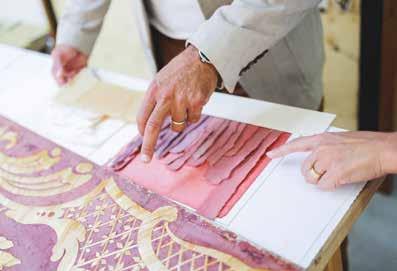
Encouragingly, this forward-thinking approach extends to his commitment to mentorship. Recalling his own challenging start with no one to guide him, Pierre is passionate about developing new talent, and Prevarti now collaborates closely with the University of Malta and MCAST, offering internships and a space for students to gain hands-on experience. “I started on my own, and it was difficult,” he says. “Now, we feel it’s our duty to help the next generation.”
This dedication ensures that the high standards and ethical principles that form the bedrock of Prevarti are passed on, safeguarding the future of the profession in Malta. And after 20 years of peering into the past, Pierre’s philosophy on the importance of art is clearer than ever. “We are part of history,” he asserts. “The work we do, the research we conduct, it becomes part of the object’s story.”
Moving forward, his vision for Prevarti goes beyond the physical act of restoration, extending to education and appreciation. Recalling a television series his team produced which documented their work and brought the intricate world of conservation into people’s homes, he says, “the response was incredible. People started to understand what restoration involves – not just the paintings themselves, but the history, the science, the story.”
This, for Pierre, is the enduring legacy of Prevarti: to preserve Malta’s priceless artistic heritage while ensuring its stories continue to be told, appreciated and understood for generations to come. “That’s our mission,” he concludes.
“I started on my own, and it was difficult. Now, we feel it’s our duty to help the next generation.”
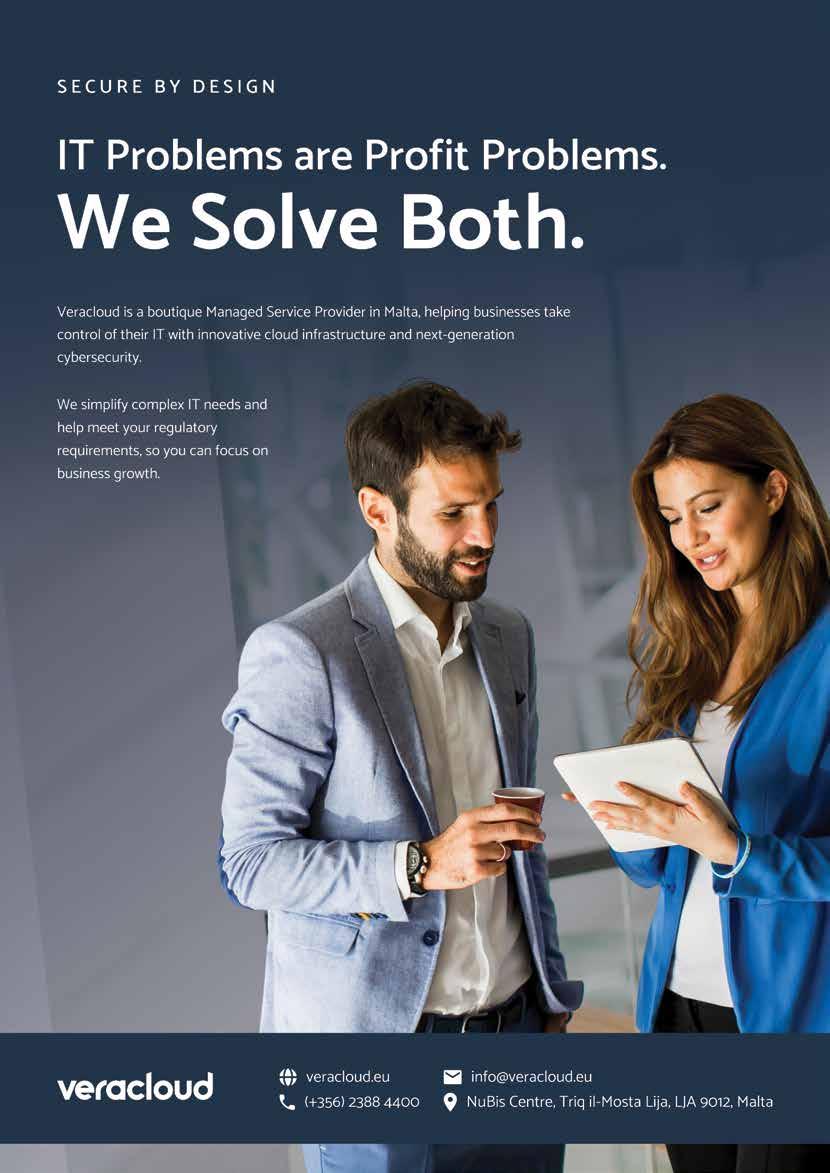
Etienne Sciberras speaks to Prabjit Chohan-Patel about how strategy, culture and social purpose are shaping both MAPFRE Middlesea and his leadership approach.
“THE INSURANCE SECTOR HAS COME A LONG WAY OVER THE PAST YEARS, DRIVEN BY REGULATION, INNOVATION AND A COMMITMENT TO MEETING CUSTOMER NEEDS MORE EFFECTIVELY,” says Etienne Sciberras, CEO of MAPFRE Middlesea, a leading insurance company in Malta –listed on the Malta Stock Exchange – and a member of MAPFRE Group. Simultaneously, the industry has upheld its role as national economic enabler, keeping pace with the strong economy’s evolving needs and supporting future development.
Yet, despite the industry’s maturity and the role of regulation and competition in raising standards, Malta’s insurance penetration remains low compared with other developed economies, he highlights. Home owners often overlook updating their sums insured as property values rise, leaving them vulnerable. Meanwhile long-term savings, particularly pension savings, via life or investment-linked products remain underdeveloped.
This under-insurance points towards a market of untapped potential, Mr Sciberras explains. Financial literacy is key here; education is high on the Government’s
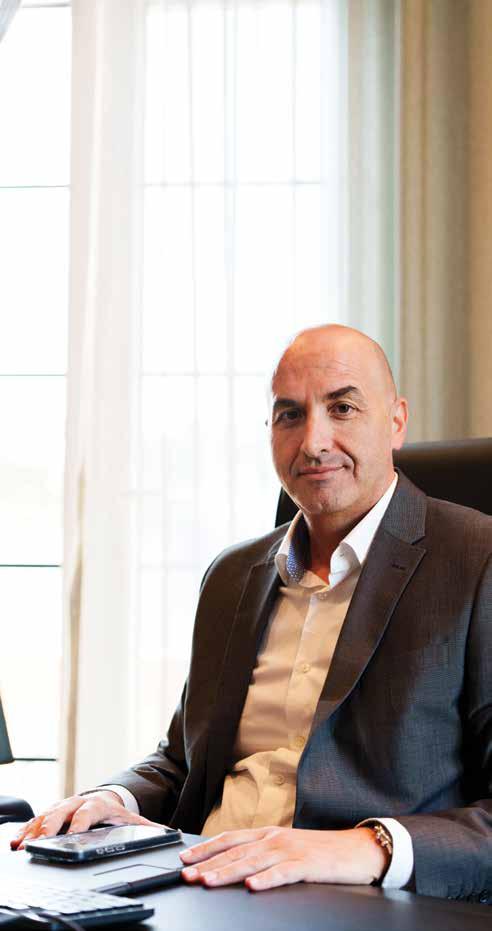

agenda and MAPFRE Middlesea itself participates in public fora. The organisation’s own awarenessraising initiatives include social media campaigns and podcasts intended to demystify insurance and explain the realities and importance of protection and savings.
Turning towards strategic direction, one of the company’s principal remits is to ensure that it maintains local relevance while fully aligning with the global MAPFRE Group’s direction. “The group roadmap for the current strategic cycle is defined by four pillars: profitability and growth, increased productivity and efficiency, digital and cultural transformation, and sustainability,” Mr Sciberras explains.
Not just wishful ideologies, these pillars are underpinned by robust mechanisms for successful delivery. Combining top-down direction with bottomup input, implementation is country-driven, reflecting local context and requirements.
Accordingly, MAPFRE Middlesea has identified several initiatives to “unlock the four pillars and their enablers,” he continues. The process has been “finetuned over the years,” with progress monitored via monthly reports to the Management Committee, quarterly meetings and centrally tracked KPIs; the board receives structured updates at least every six months. Furthermore, senior and junior staff feed into this cycle: the company’s variable remuneration scheme links to these strategic objectives, making sure that the pillars are lived, not just static on paper.
Digital transformation, one of the pillars, is inevitable and integral to the future. Here, MAPFRE Middlesea’s
major focus of investment is its core policy administration system, referred to as the “foundational layer” of the digital journey. As productivity levers, automation and process re-engineering are being used for workflow efficiency and AI’s further potential benefits are under discussion. However, the organisation’s AI approach is pragmatic and measured, with the CEO sidestepping the hype to focus on digital initiatives that promise “genuine, meaningful impact for both company and customer.”
The digital conversation also involves the shifting dynamics of customer interaction. Online channels are increasingly preferred for travel insurance purchases and claims, while younger customers are more receptive overall to digital channels. Nonetheless, “digital interaction as yet is not mainstream in the insurance industry” due to the perceived complexity and important aspect of insurance products. Cultural and generational factors can also mean that clients predominantly favour face-to-face communication with insurance advisers.
Turning to another pillar, sustainability, the insurance sector is central to the discussion of Malta’s transition to a more sustainable economy. The ESG (Environmental, Social, Governance) mindset is woven through MAPFRE Middlesea’s strategy and operations. Indeed, the organisation is keen to pursue an investment portfolio rated on ESG criteria.
On environmental footprint, the company has adopted the global group’s 2030 goal of carbon neutrality, aiming to achieve it ahead of schedule locally. Supporting that ambition, the remote working policy is designed to help reduce building emissions, while
“The insurance sector has come a long way over the past years, driven by regulation, innovation and a commitment to meeting customer needs more effectively.”
“There’s no magic formula for attracting and retaining talent, but we put the employee at the centre. The company’s philosophy, ‘we care about what matters to you’ applies as much to staff as it does to its customers and stakeholders.”
ISO 14001 certification confirms the company’s progress in energy management. In parallel, the organisation’s commitment to equality has put it on track to close the gender pay gap, with a significant percentage of senior staff now female.
Translating ESG policy into action must also involve product development. MAPFRE Middlesea adapted its motor cover to cater for the arrival of electric vehicles on the island. And Mr Sciberras’ teams are currently exploring other sustainable insurance products, further demonstrating its active role in Malta’s green transition.
ESG advancement extends to community investment. Social impact is carved into the organisation’s DNA thanks to the MAPFRE Foundation (50 years old this year) which drives initiatives to improve educational programmes, providing insurance to people with limited access and supports communities. Culture is also very important on the Fundacion Agenda. Meanwhile, MAPFRE Middlesea’s CSR (Corporate Social Responsibility) programme is part of the global volunteering scheme involving its workforce. Activities take place during office hours or in employees’ personal time and range from environmental projects to supporting victims of addiction, domestic violence or difficult family circumstances.
Beyond tracking financial or time contributions, feedback from beneficiary organisations counts most, Mr Sciberras emphasises. “Hearing the real story of someone re-entering society or turning their life around having played a small part in this is the strongest measure of impact.”
This naturally brings us onto people, the heart of MAPFRE Middlesea. Addressing the talent question, the CEO is candid: “There’s no magic
formula for attracting and retaining talent, but we put the employee at the centre. The company’s philosophy, ‘we care about what matters to you’ applies as much to staff as it does to its customers and stakeholders.” Seeking to be an employer of choice in a competitive market means “constantly investing in our people and never taking talent for granted.” Employee engagement is measured regularly through surveys and the company’s net promoter score compares favourably with industry benchmarks.
Notably, the human connection is deliberate and frequent. Mr Sciberras meets different employees monthly to hear their views on career development and suggested areas of improvement among other matters. “These touchpoints complement the HR function’s work on talent management in a holistic way.” The positive impact is evident in MAPFRE Middlesea’s average tenure rate – long in today’s climate.
Internal mobility is a priority. “We’re proud of the number of people who’ve built long careers with us. My own career shows what’s possible,” he shares. Originally joining as a trainee investment executive in 2001, the company’s CEO is a living example of its culture of growth, development and learning. Aside from local and external courses, employees have access to numerous learning opportunities at MAPFRE’s digital university, Campus MAPFRE. Specific training programmes equip new joiners from outside the industry with necessary technical, sector-specific knowledge while tailored development plans upskill existing staff for specialist roles.
“Culture is our real differentiator,” he emphasises. Internal values are not solely centred on financial KPIs. “Our people appreciate being seen as individuals, not numbers, and having purpose that

shapes their daily work.” Empathy is also crucial in this culture, while professionalism and collaboration turn this empathy into consistent service. “How we interact with our customers, how they value us, our distribution network and the whole ecosystem we represent is incredibly important. So, while our KPIs obviously matter, how we meet them is just as important.”
Depth of duty notwithstanding, Mr Sciberras points out that numerous people help drive a company forward besides the CEO and credits the experts around him for aiding his informed decision-making and constructively challenging him when needed.
An impromptu question about whether he enjoys his role draws an unequivocal “yes” as well as some insightful introspection: “I believe I am able to renew myself whenever renewal is needed. I’m definitely a different leader from the
one I was five to 10 years ago. Leadership style must evolve both with time in the role and with changing circumstances and company needs. It is a privilege to lead an organisation and contribute towards it achieving its goals. Yes, the job is heavy with responsibility towards customers, employees and shareholders. But equally, this responsibility is what energises me to give my very best.”
“We’re proud of the number of people who’ve built long careers with us. My own career shows what’s possible.”
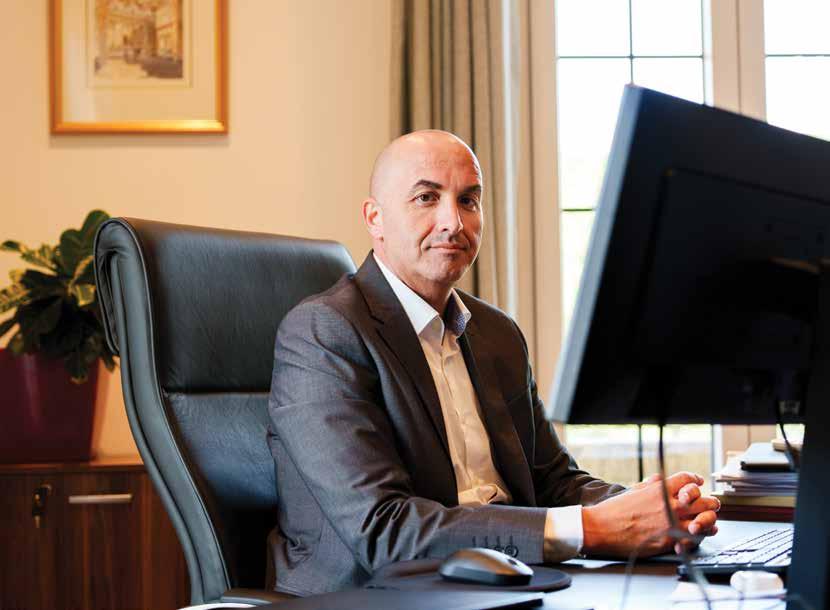
Daniela Farrugia Camoin, Unit Manager of the Employee Development and Wellbeing Department at the Planning Authority, speaks with Dean Muscat about how investing in people through initiatives like Erasmus+ is helping build a more engaged, connected and future-ready workforce.
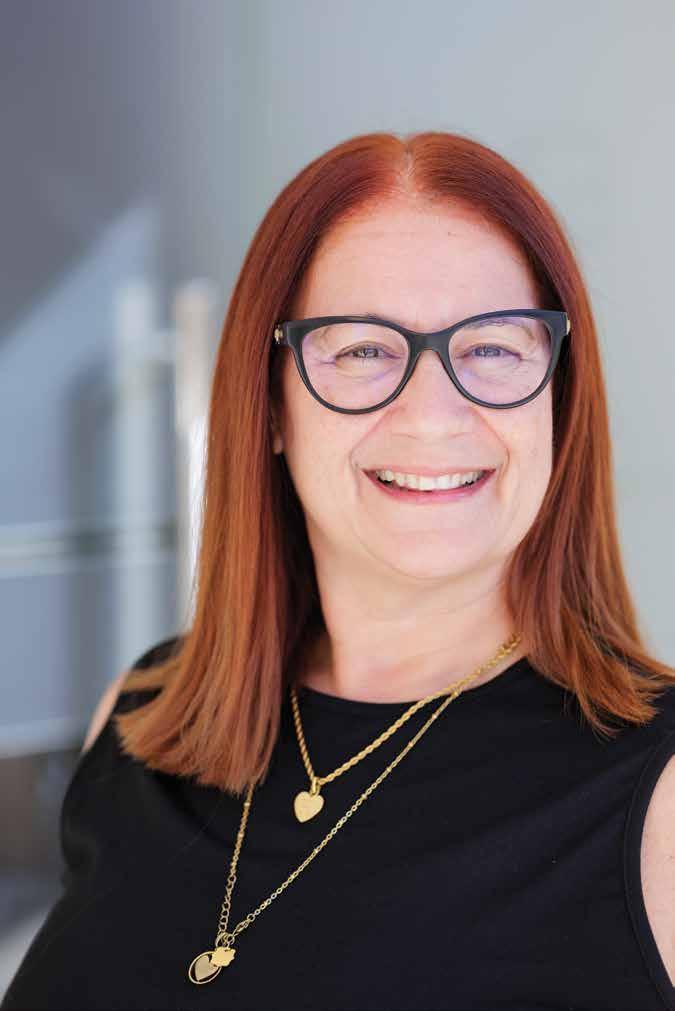
“We started off sending one or two people every couple of years. Today, we send up to 15 employees a year on job mobility placements, and another 15 on training courses.”
A
COMMON ACCUSATION THESE DAYS IS THAT GEN Z CAN’T SIT STILL IN ONE JOB FOR TOO LONG. Statistics continue to show that many graduates and professionals in their 20s tend to stay about 2.7 years before moving on. But if you consider the bigger picture, the truth is that even older employees are switching roles more frequently nowadays, especially when they feel their professional growth stalling, burnout creeping in, or a sense of meaninglessness and disconnection within the workplace culture.
In Malta, the Planning Authority has been taking this growing reality seriously. In 2021, during COVID, when work-life balance became a global talking point, the Authority launched its Employee Development and Wellbeing Unit (ED&W Unit). Led by Unit Manager Daniela Farrugia Camoin and supported by a tight-knit team of two, the unit looks after some 450 employees, focusing on their professional development, personal growth and well-being.
Daniela’s approach is intentionally broad. “We’re always trying to open up the idea of well-being as much as possible,” she says. “This is why we work closely with different associations. We’re constantly looking around for new things we can bring to our people.”
Under her leadership, well-being at the Planning Authority has been tackled from a holistic perspective, covering the mental, physical, spiritual, educational, and financial aspects of life. Recent initiatives have included PA Wellness Wednesdays, regular expert talks and collaborations with organisations like the Mental Health Association, Kellimni.com and the Department for
Health Regulation. And the ideas keep coming – from team building events, reaching out calls to staff and book swap corners. For Daniela, each of these activities is more than a perk; they’re small but meaningful ways to keep people connected, engaged and – most importantly – happy to grow within the organisation.
On the professional development side, one of the Planning Authority’s biggest success stories has been its long-running involvement in the Erasmus+ programme. This EU initiative funds learning and mobility experiences across Europe, allowing professionals to spend short periods abroad gaining new skills, knowledge and perspectives. The authority’s journey with Erasmus+ stretches back to 2011, when it was still known as Lifelong Learning Projects.
“We started off sending one or two people every couple of years,” recalls Daniela. “Today, we send up to 15 employees a year on job mobility placements, and another 15 on training courses. It’s grown a lot from when we originally started.”
Placements typically last two weeks for job mobility and one week for structured courses. Over the years, Planning Authority staff have gained experience in Norway, Denmark, Poland, Romania, Italy, Ireland, and Scotland, among others. ED&W Unit collaborate closely with the EU & Multilateral Affairs Unit. The EUMA Unit matches the area of work with different host organisations. The ED&W Unit handle the coordination of the mobility placement, including travel, ensuring a schedule packed with relevant experiences and reporting.
“It’s rewarding to know that the feedback from staff and host organisations reflects that we’re doing things right.”
The preparation itself is time consuming and carefully planned. “We plan everything,” Daniela explains. “We send CVs ahead, identify the best matches between employees and organisations, and map out a full schedule of meetings and site visits. We want to make sure it’s a rich, relevant placement for each person on the programme.”
Daniela herself took part in a mobility placement in 2019 – an experience she calls transformative. “It’s completely different when you’re actually there,” she says. “You come home with fresh ideas – sometimes small, practical things, but also bigger insights into how other organisations work, lead their teams and approach different challenges.”
Sometimes, she adds, it’s even a reminder to appreciate Malta’s own systems. “We’ve had people come back saying, ‘Actually, we’re doing this better.’ It’s motivating to see that we’re not just learning, but also teaching others. The more we expose ourselves to different ways of working and managing our staff, the more beneficial it becomes.”
When employees return from an Erasmus+ placement, they’re encouraged to share their experience in an open presentation, available to anyone curious about the project or considering applying next time. “It’s a great way to pass on what they’ve learned and inspire others to explore what Erasmus+ could offer them,” Daniela says.
Beyond that, these experiences have helped the PA’s staff build lasting professional networks, with contacts they can reach out to for further advice or collaboration. “They come back knowing they can turn to people across Europe for input,” Daniela adds. “I believe it broadens their perspective so they’re no longer just thinking locally, but as part of a wider professional community.
One unexpected takeaway from the Erasmus+ experience, Daniela says, is how deeply people are craving real, in-person connections again. During the pandemic, everyone adapted to remote work and virtual

meetings, but she feels that novelty is steadily fading. “I think people are a bit bored of online now,” she admits. “Yes, it has its benefits, but most of us end up doing more than ever – juggling emails, tasks and meetings all at once.”
That’s what makes Erasmus+ so powerful, she explains. “It gets people out of their comfort zone and into new environments. Importantly, it allows people to be fully focused and present during the learning experience, which is something of a luxury these days.”
Last year, the Authority broadened its Erasmus+ participation to include one-week training courses focused on well-being and emotional intelligence. “These courses are generally aimed at managers,” Daniela explains, “to help them develop the soft skills that make a real difference within their teams.”
She also points out that many professionals – whether architects, accountants or engineers – often find themselves leading teams without ever having been taught how to manage people. “You might be great

at your job, but that doesn’t mean you know how to handle someone who’s struggling, or when to step in versus step back,” she says. “These programmes give managers the tools to understand people better, support them through challenges and create a more positive, motivated workplace.”
The Planning Authority’s commitment to continuous growth hasn’t gone unnoticed. Its 2023 Erasmus+ Project recently earned a Best Practice Award – a recognition it has achieved more than once. “It’s rewarding to know that the feedback from staff and host organisations reflects that we’re doing things right,” Daniela explains. “Another benefit of this level of recognition is that the Planning Authority is now an accredited Erasmus+ organisation, meaning our applications on behalf of our employees are fast-tracked.”
Yet Daniela is quick to add that the team never rests on its success. “We’re always looking for ways to improve, to open up more opportunities, and make sure our initiatives reach different people across the organisation,” she says.
In this spirt, the ED&W Unit is already setting its sights on Erasmus+ Key Action 2 (KA2), a programme focused on
collaboration between organisations across Europe. Unlike individual job placements, KA2 projects are long-term partnerships built around a shared mission. As Daniela explains: “You find common goals with other partners and work together to create something tangible that benefits everyone involved.”
And for other organisations in Malta considering Erasmus+, Daniela’s advice is simple: go for it. “It’s one of the best ways to give your employees meaningful growth experiences without losing them,” she says. “You’re letting them step out, learn, and bring that knowledge back to your organisation.”
She adds that she’s seen younger generations within the PA highly motivated by such experiences. “These programmes provide engagement and opportunity,” she explains. “If people feel they’re learning and evolving, they’ll want to stay.”
“If people feel they’re learning and evolving, they’ll want to stay.”

With over a decade of success in African private equity, Mediterrania Capital Partners is now opening the doors to public market opportunities through its Africa Select Equity Fund (ASEF). Why now? “Because the moment is ripe, and the opportunity is vastly underappreciated,” says Omar Fahmy, Africa Select Equity Fund Director and Portfolio Manager, in an interview with Jake Aquilina

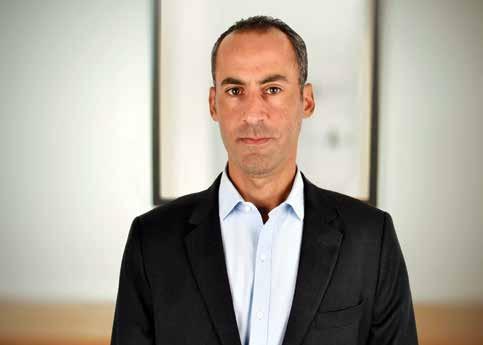
IN JULY 2024, MEDITERRANIA LAUNCHED ASEF, A BOLD YET CALCULATED MOVE INTO LISTED EQUITIES after more than 12 years of hands-on private equity investing across the African continent. The fund has already made waves. Delivering an impressive ~30 per cent gross return in its first year, ASEF is reshaping how institutional investors think about Africa’s public markets: a growth engine and a diversifier in global portfolios.
“ASEF is a natural extension of our platform,” Omar says. “We’re bringing our same rigorous, value-driven approach to public markets, just with added liquidity and accessibility.”
“We’re bringing our same rigorous, value-driven approach to public markets, just with added liquidity and accessibility.”
Mediterrania’s investment thesis has always centred on deep research, long-term thinking and engaged ownership. Historically, this played out in the private sphere: supporting African businesses through growth capital and strategic involvement. Now, ASEF takes that DNA and applies it to listed equities. The fund invests in 20-25 companies that meet the same strict standards Mediterrania has always applied.
The transition wasn’t rushed. Omar explains that Mediterrania has tracked African capital markets closely since its inception, observing a gradual maturation in local exchanges, governance and institutional frameworks. “Listed equities are simply a different format. Our philosophy hasn’t changed. We still look for undervalued companies with strong fundamentals and long-term growth potential.”
ASEF’s early success, marked by a ~30 per cent gross return, reflects a combination of disciplined stock selection and favourable market tailwinds. As capital flows returned to emerging markets in early 2025, ASEF’s portfolio, with a forward P/E of 5.8x and a dividend yield of 6.2 per cent, stood out for its relative value. But Omar doesn’t credit macro conditions
“Africa is young, urbanising and increasingly connected. Meanwhile, listed valuations remain deeply discounted. That’s a mismatch and an opportunity.”
alone. “The performance is driven by deep bottom-up research. We select businesses with robust cash flow, strong management and a local or regional moat. Our goal isn’t just to ride waves; it’s to identify and create value over the long term,” he maintains.
The team attributes its momentum to careful exposure, a benchmark-agnostic strategy and continuous dialogue with investee companies – a hallmark of its private equity heritage. While many Africa-focused equity funds diversify broadly across the continent or mirror index weightings, ASEF is more focused in its approach. By capping the fund at €150 million, Mediterrania preserves return potential and ensures it can move nimbly even in less liquid markets. “Our edge is in stock selection,” Omar notes. “We don’t aim to own the whole index. We want to own the 20 or so
best ideas we can find, and to hold them with conviction.”
ASEF also stands out for its active engagement with listed companies, an approach more commonly seen in private equity. Mediterrania brings in operational and governance insights, encouraging companies to improve transparency, capital allocation and long-term strategy.
From an investor perspective, ASEF offers compelling diversification benefits. Africa’s public markets, historically underfollowed, show low correlation to developed markets, roughly 0.70, but ASEF’s idiosyncratic strategy brings that figure even lower, to 0.50. “For global portfolios, ASEF offers true alpha: returns based on local fundamentals, not global macro cycles,” Omar says.



But Mediterrania’s ambitions go beyond portfolio returns. The firm sees itself playing a catalytic role in capital markets development across Africa. By engaging with companies on disclosure and governance, the fund contributes to the institutional strengthening of the ecosystem.
Why now? Omar points to Africa’s young and growing population, rapid digital adoption, abundant natural resources, and compelling valuations. “Africa is young, urbanising and increasingly connected. Meanwhile, listed valuations remain deeply discounted. That’s a mismatch and an opportunity.”
Markets like Egypt, Morocco, Kenya, and Nigeria are home to regional champions in sectors like banking, telecoms, fastmoving consumer goods, and infrastructure, he continues, noting that these are businesses with scale, resilience, and, crucially, a long runway for growth. Additionally, liquidity conditions are improving, helped by stronger local pension funds and rising domestic investor participation.
Naturally, any discussion about African markets invites questions around currency risk and liquidity. Mediterrania has structured ASEF to address both. The fund offers bi-monthly redemptions, providing more flexibility than traditional vehicles. Its €150 million cap allows for targeted positions in smaller or mid-cap stocks, which might be overlooked by larger funds.
On the FX front, risk is managed bottom-up by prioritising companies with local cost bases and pricing power, export revenue or foreign-denominated income streams, and offshore
listings when appropriate. “We don’t take currency views. We manage for resilience at the company level,” Omar says.
As global investors seek growth beyond saturated markets, Mediterrania believes that Africa’s capital markets deserve more attention. Through ASEF, it offers a research-driven path to those markets, balancing downside protection with the potential for high returns. “Our goal isn’t just to outperform. It’s to help build confidence in African equities as a serious, investable asset class.”
Looking ahead, Mediterrania sees ASEF and its broader platform playing an important role in shaping transparent, wellgoverned and liquid capital markets across Africa. “Africa is too big to ignore and too fragmented to approach passively. That’s where we come in.”
“Our goal isn’t just to outperform It’s to help build confidence in African equities as a serious, investable asset class.”

A relentless drive for efficiency, sustainability and excellence

Wolfgang Tweraser brings 40 years of international business experience into his most recent endeavour, TW Consulting & Trade Ltd – drawing from a career built on an unwavering commitment to integrity, innovation and solving real-world problems. Sarah Muscat Azzopardi delves into the strategic thinking behind his multifaceted enterprise, as well as the CEO’s vision for the future of global commerce.
EXPLAINS, is to provide a unique bridge between pioneering global brands and markets ripe for transformation, curating a portfolio that is as diverse as it is revolutionary. From electric hydro-foiling ferries to the next generation of dental care, the common thread is a relentless drive for efficiency, sustainability and excellence.
With a portfolio that includes everything from smart solar energy systems to advanced beer dispensing technology, one might wonder about the strategy connecting such disparate industries. For Mr Tweraser, however, the approach is refreshingly simple: identify a problem, then find the best possible solution.
“There are two kinds of consultants,” he explains, reflecting on an approach honed over decades in business, including 27 years building a suite of companies in the US. “One will tell you what’s wrong, and that’s where it
ends. What we do is the other: that is, tell you what the problem is and then find the solution.”
This problem-solving ethos is the guiding principle for every brand TW Consulting & Trade represents. Describing Malta, the company’s current base, as a microcosm of global challenges, the CEO asks, “What is needed in Malta, for example? Among the problems are parking and the environment.” In response, his portfolio offers tangible answers: robotic parking to solve land scarcity, and a revolutionary electric ferry service to tackle marine pollution.
Elaborating, Mr Tweraser describes robotic parking systems as fully automated car parks that safely store and retrieve vehicles without the need for drivers to search for spaces. “In Malta, where land is scarce and urban areas are under constant pressure, this technology could significantly increase parking capacity while reducing traffic congestion and emissions from circling cars,” he maintains.
“Sustainability and going green is a fantastic slogan that’s been used now for years. But what is really done? Not too much. I see this not just as a business, but as a way to really change things.”
“Find a solution, present the product and you will see that success comes automatically. And so does the money. Greed kills so much business.”
Meanwhile, Candela Electric Ferries, which also feature in his company’s portfolio, use hydrofoil technology to lift above the water’s surface, cutting energy consumption by up to 80 per cent when compared to traditional vessels. “With no noise, no exhaust fumes and minimal wake, they are perfectly suited to Malta’s coastal environment and short-distance maritime routes, providing a fast, comfortable and sustainable way to travel between Valletta, Sliema, Bugibba, Birgu, Marsascala, and Gozo – reducing road congestion while supporting Malta’s shift toward cleaner transport,” he notes, adding, “they also have the potential to transform the Malta-Gozo and Malta-Comino connections, offering a greener and more efficient alternative to today’s conventional ferries.”
Moreover, in today’s business climate, ‘sustainability’ can often feel like a box-ticking exercise. Going beyond the slogan, however, Mr Tweraser views it as the fundamental core of his strategy, voicing his frustration with the gap between rhetoric and action on a global scale. “Sustainability and going green is a fantastic slogan that’s been used now for years. But what is really done? Not too much,” he states with conviction. “I see this not just as a business, but as a way to really change things.”
This commitment is evident across the company’s portfolio, he maintains, highlighting one such example they represent: Papoutsanis, a Greek company with a 150-year history in eco-friendly hotel amenities, personal care and household products. These premium items are vegan, chemical-free, and also include a baby line. Another example is Purlife, a partner company which offers a product line with what are considered the world’s best dental tabs, combining sustainability with everyday personal
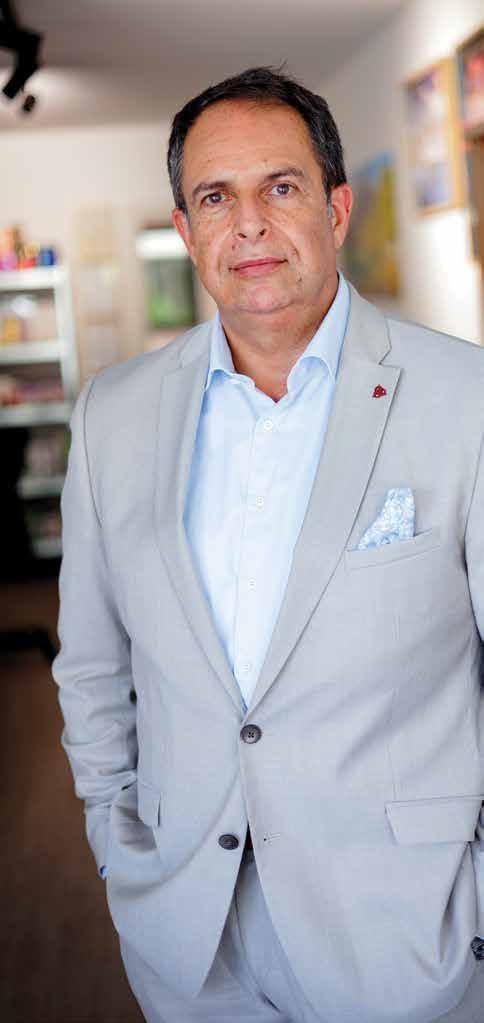

care. Beyond dental tabs, Purlife also offers a second product line, comprising eco-friendly serveware made from biodegradable rice husk or natural bagasse, the latter ideal for takeaway containers. But the most fun are their revolutionary edible rice straws, made from tapioca and rice starch. “They don’t dissolve in your drink, and if you want, you can eat them when you’re done,” he says with a smile, outlining his mission to prove that sustainable choices can be both superior in quality and commercially viable.
Certainly, the CEO continues, operating as the sole representative for globally recognised brands requires an immense level of trust – a quality Mr Tweraser has cultivated over his long career through a decidedly hands-on, ‘old-style’ approach. “I conduct business the way I did it 40 years ago: face-to-face,” he asserts. “I travel all the time. It’s the only way.”
This relentless, in-person engagement builds relationships that transcend contracts, he affirms, recounting his experience in the Middle East: “when they say ‘you’re part of the family,’ that shows the highest trust you can gain.”
That trust is fortified by a reputation for unshakable honesty and directness, he adds, noting that he learned early in his career, particularly during his time as an advisor to former US President George W. Bush, the value of staying apolitical and speaking frankly. “I’m too old and don’t have the time for sugar-coating anything,” he affirms, crediting his transparency, combined with a proven track record, with maintaining exclusive, long-standing partnerships.
Still, introducing revolutionary technology to new or traditional markets is fraught with challenges. The CEO’s strategy for overcoming resistance is a blend of persistence and proof. His company motto is simple: “Don’t accept ‘no’.”
He shares a recent example with the beer-dispensing system, QuickTap, and its introduction to Red Bull’s event circuit. “First they were hesitant,” he recalls, “but I insisted, ‘Give me 10 minutes and you will change your mind’. Those 10 minutes became an hour and a half, and a ‘thank you’ that I never gave up.” In this case, by demonstrating that the system could pour a beer in under five seconds and handle 20 times the volume of competitors, he solved a major logistical bottleneck for large-scale events rather than simply selling a product, he explains with a smile.
This principle is also key to justifying the premium position of his brands in an increasingly priceconscious world. It’s not about being the cheapest; it’s about delivering value. “Find a solution, present the product and you will see that success comes automatically. And so does the money,” he advises. “Greed kills so much business.”
Having witnessed massive shifts in global trade, Mr Tweraser identifies one attribute as paramount for the future: flexibility. “Flexibility, I think, is the new magic word in business,” he states, recalling the 2008 financial crash. Overnight, his thriving mortgage business in the US evaporated, but instead of folding, he pivoted. “We turned things around and became a financial consulting company,” the CEO says, using his team’s expertise to help others restructure and survive.
Looking ahead, he plans to continue this model of agile, responsive growth. The focus, Mr Tweraser maintains, is on deepening the solutions offered to existing and new clients rather than accumulating brands, expanding organically where a need is identified – and as ever, continuing to build his enterprise on the foundations of honour and vision.
For more information, visit www.twctproducts.com
“Flexibility, I think, is the new magic word in business.”

With digital assets becoming some of the most valuable possessions for any business, failure to protect is no longer an option. George Christou, Costas Georgiades and Christos Tsoulfas from ESET speak to Edward Bonello about how the stalwart cybersecurity giant is positioned to assist businesses of all sizes across sectors.
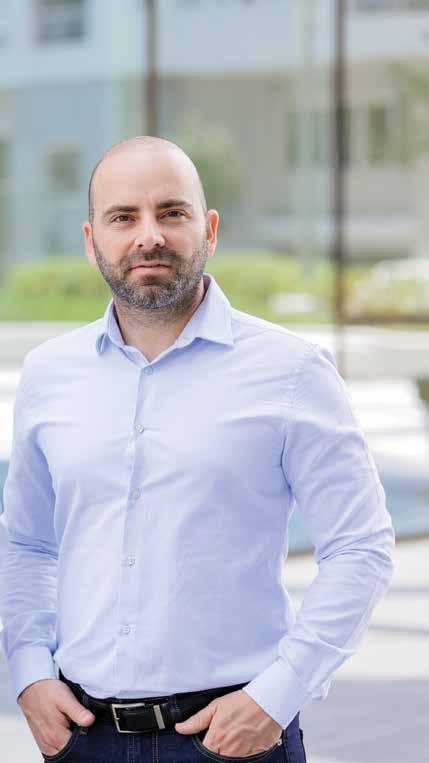
IT IS NOT TOO FAR-FETCHED TO ARGUE THAT IN THE LAST DECADE OR SO, a great deal of our lives, both personal and professional, has somehow transferred or is intimately intertwined with the digital realm. From banking to data, personal records and all sorts of other business-sensitive information today lives in digital banks, wallets, servers, and drives, with the hope that they are kept safe, and away from nefarious intentions.
But unfortunately, this isn’t always the case. Chilling stories of data theft are not rare, as cybercriminals grow savvier, and willing to go to extra lengths to breach businesses and access their sensitive data, sometimes with crippling effect. It stands to reason, then, that cybersecurity has never been more crucial for businesses than it is today.
“What makes ESET stand out is its multi-layered defence system, which not only prevents threats before they strike but also responds effectively when malicious activity is detected.”
Costas Georgiades
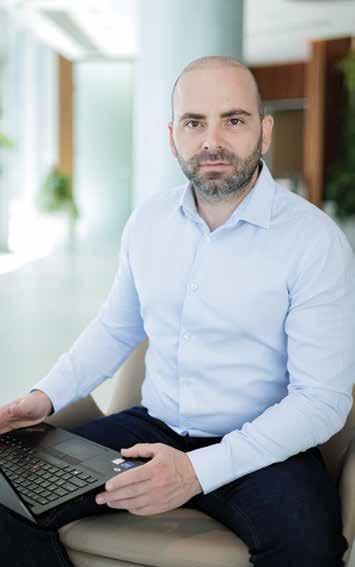
“ESET is renowned worldwide for its cutting-edge threat detection, prevention and response technologies.”
Christos Tsoulfas
“Would you leave your front door unlocked, and unsupervised?” asks George Christou from ESET, one of the world’s leading cybersecurity giants. “Leaving your business unprotected against cyber-attacks and hoping for the best is akin to leaving your warehouse’s doors wide open, in the hope that no one will stroll in to help themselves to your stock,” he qualifies.
Together with Costas Georgiades and Christos Tsoulfas, George represents ESET in the Maltese market, one of the longest-standing digital security brands which has been in operation since 1992.
“ESET is renowned worldwide for its cutting-edge threat detection, prevention and response technologies. With a track record spanning three decades, the company has grown into one of the most trusted names in cybersecurity, with over one billion devices across the globe benefiting from its threat intelligence feeds,” Christos explains.
ESET’s success is built on a foundation of accessibility, efficiency and resilience. Its solutions are designed to be easyto-use, lightweight enough to leave minimal impact on one’s system performance, and powerful enough to deliver detection rates close to 100 per cent accuracy every time.
“What makes ESET stand out is its multi-layered defence system, which not only prevents threats before they strike but also responds effectively when malicious activity is detected. To expand the property security analogy further, it’s not just about locking the door, but also about installing alarms, cameras and multiple gates to make it harder for cybercriminals to break through. Effectively, the system is capable of learning and anticipating how they behave, and ensures that protection is provided at every stage,” Costas adds.
At the heart of ESET’s effectiveness is a global network of threat intelligence feeds, sourced from every corner of the world.

This comprehensive bank of data-driven intelligence provides unmatched visibility into new and emerging threats, giving ESET the ability to protect both businesses and consumers against the constantly changing cyber landscape. While traditional detection methods are enhanced by machine learning and artificial intelligence, ESET’s philosophy avoids over-reliance on heavy AI processes, keeping its solutions lightweight while still extremely effective.
ESET caters to both businesses and private consumers, with solutions that span from individual users to global enterprises. Malta’s economic landscape, like the rest of the EU, is dominated by small- and medium-sized enterprises, making up around 90 per cent of the business community, and ESET makes it a point to tailor its offerings accordingly.
“While ESET is proud to count large-scale multinational corporations among its clients, we also want to be the go-to solution for smaller businesses, down to microenterprises that require ESET’s assistance, to a different degree, but just as much,” George declares.
But SMEs are not the only ones on ESET’s radar. Sectors like iGaming, financial services, fintech, banking, accountancy, healthcare, hospitality, and maritime industries are increasingly looking to ESET to beef up their cybersecurity efforts.
Malta already forms part of ESET’s regional network, which is managed from the fellow Mediterranean island of Cyprus, and the company is determined to deepen its presence locally.
“We want to continue building on our excellent relationship with our existing clients while reaching out to new ones,” George continues. “To this end, ESET has engaged in a range of local initiatives, including hosting high-profile events such as the ESET Cybersecurity Day in Malta, providing an opportunity for industry leaders, regulators and business stakeholders to meet and discuss best practices and share knowledge on the subject.”
Behind ESET’s technology lies a strong network of experts. The company employs over 2,300 professionals worldwide, covering every time-zone to ensure seamless support at any time of the day. Perhaps it is this dedication to service that sets ESET apart.

“Leaving your business unprotected against cyberattacks and hoping for the best is akin to leaving your warehouse’s doors wide open, in the hope that no one will stroll in to help themselves to your stock.”
George Christou
“We combine our excellent product offering with many decades of experience and expertise. Then, it is all supplemented by an unwavering commitment to aftersales care, ensuring our clients are never left unprotected,” the team concludes.

From its roots as a pioneering joint venture to its role today as a trusted partner for individuals and businesses alike, Citadel continues to shape the future of insurance through expertise and purpose-driven progress.
IN TODAY’S UNCERTAIN ECONOMY, INSURANCE FIRMS ARE THE GLUE THAT HELPS INDIVIDUALS AND COMPANIES MANAGE RISK. Among Malta’s traditional financial players, one is a prime example of resilience and adaptability: Citadel Insurance p.l.c.
With nearly three decades of solid reputation and track record for reliability, Citadel has become Malta’s only indigenous composite insurer: a company that provides comprehensive coverage for general, health and life insurance under the same roof.
Founded in 1997 as a joint venture between Assitalia (now Generali S.p.A.) and its former agent Citadel Insurance Services, the company made a lasting mark on the history of Malta’s insurance scene by being the very first to upgrade into a full-scale insurance company.
Just a year later, Citadel obtained a composite insurance licence, empowering it to offer both long-term life and general business products, and by 2016, it had strengthened its insurance offering to include private medical insurance as part of its portfolio. Indeed, over time, the company expanded its range to include a full

suite of insurance products – from protection and savings plans to motor, home and health insurance – designed to meet the needs of people, families and businesses at all stages of life.
The purpose and values powering Citadel’s culture
At the heart of Citadel’s long-term success is a simple but strong philosophy: customers come first. Every product, process and policy is based on this goal. The values, trust, integrity, and sustainability that form the backbone of the company are the building blocks of its culture, and guide its approach to customers, employees and society at large.
Citadel looks at diversity as a strength and places great emphasis on fairness and inclusion. While this approach strengthens internal collaboration, it also translates into better outcomes for customers, who benefit from the company’s tailored and forward-looking service.
Citadel’s business model also involves environmental responsibility – an awareness that long-term success is interconnected with the health of the planet. The company’s investment in green insurance products, like its Eco-Home, Eco-Car and Solar Panel products, reflects its commitment to promoting eco-friendly lifestyles while rewarding customers who take steps to reduce their footprint on the environment.
The company’s investment in green insurance products, like its Eco-Home, Eco-Car and Solar Panel products, reflects its commitment to promoting ecofriendly lifestyles while rewarding customers who take steps to reduce their footprint on the environment.
By integrating health, life and accident insurance under one composite licence, Citadel empowers employers to deliver cohesive, cost-effective benefits that elevate employee well-being and organisational loyalty.
Leadership with integrity at the core
Underpinning Citadel’s operational excellence is a robust governance framework that promotes accountability, transparency and long-term sustainability.
The Board of Directors consists of experienced professionals from different fields, including finance, banking, law, business management, and risk governance. The board offers strategic oversight and keeps the company responsive in a fastchanging regulatory and economic environment.
Complementing the board is a seasoned senior management team, led by Angela Tabone as Managing Director and CEO, with strong expertise in insurance, operations, digital transformation, compliance, and investments. They work together to maintain Citadel’s reputation for professionalism and reliability, making sure that every decision matches the company’s purpose and values.
A trusted partner in Malta’s business growth
Every enterprise requires good security to protect its assets and liability risks, and more. Citadel’s commercial insurance products cover a diverse range of risks including life and nonlife for directors as well as employees.
The company’s offerings include protection against material damage, business interruption, electronic equipment breakdown, goods in transit, and marine cargo, among others. Citadel also provides a suite of liability covers, including Employers’ Liability, Public Liability, Personal Accident and Product Liability, as well as professional indemnity solutions for directors, officers and professionals across various sectors.
Citadel distinguishes itself through its co-operative approach. Rather than simply selling policies, Citadel’s experts work closely with clients to assess risks, identify vulnerabilities and develop unique solutions that safeguard short-term operations and long-term ambitions. This proactive partnership model has become one of Citadel’s defining strengths.
Knowing that talent is the foundation of any successful business, Citadel created a portfolio of employee benefit solutions to draw, hold on to, and safeguard talent. These plans go beyond traditional offerings, combining flexibility with comprehensive coverage to meet the evolving needs of today’s workforce.

Citadel’s group health insurance options, ranging from Core and Comfort Plans to Complete and Child Plans, offer worldwide protection with tiered benefits to suit organisations of all sizes. Meanwhile, its Group Life Insurance packages provide a range of optional riders, including Accidental Death Benefit, Permanent and Partial Disability coverage, and Critical Illness protection.
By integrating health, life and accident insurance under one composite licence, Citadel empowers employers to deliver cohesive, cost-effective benefits that elevate employee wellbeing and organisational loyalty.
Life, lifestyle, and legacy protection
For individuals, Citadel’s lifestyle and life products provide protection, flexibility and assurance. From home and motor protection to travel, yacht and health insurance, the company’s offering provides extensive protection that adapts to evolving lifestyles.
In addition, Citadel’s life insurance solutions, such as Keyman Life, Group Life, Level Life, and Shareholder Protection, address both individual and business customers’ requirements, guaranteeing security in times of uncertainty. Citadel was the pioneer insurer in Malta to introduce family and individual savings products and is now working towards creating a new family of pension plans that will further complement its wide range of financial products.
Sustainability at the core
While the world focuses on sustainable development, Citadel is leading the charge. The company integrates environmental, social, and governance (ESG) principles across its operations and product design. Its Eco
insurance line reflects a strong commitment to positive environmental impact, rewarding customers who adopt energy-efficient homes, electric vehicles or renewable technologies.
This initiative of being green carries over to the company’s internal operations as well, ranging from reducing its carbon footprint to supporting local community initiatives.
As Citadel Insurance heads into its third decade of operation, the firm’s continued focus on digital evolution, employee development and expansion, and enduring growth ensures that it is ideally positioned to remain responsive to the evolving needs of its customers. For individuals, businesses and families, Citadel is a dependable partner, insuring what’s most important and building a safer, more sustainable future for all.

Citadel Insurance p.l.c. is authorised under the Insurance Business Act, Cap. 403, to carry on general and long term business of insurance, and is regulated by the MFSA.
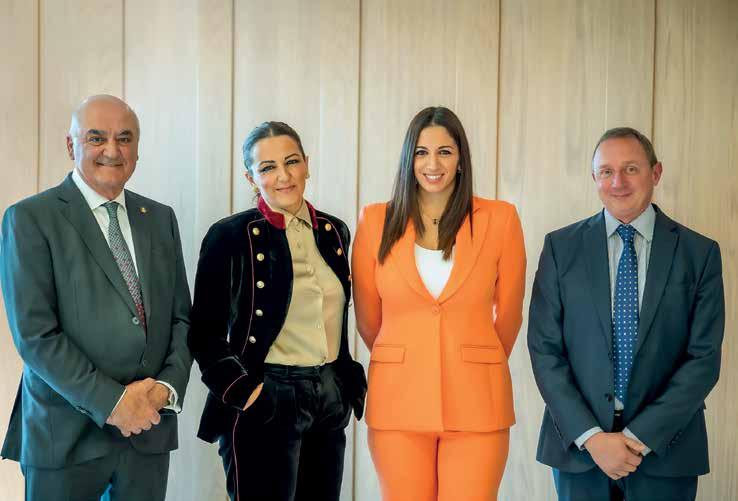
As AX Group marks its 50th anniversary, this important milestone reflects more than longevity. It represents a disciplined commitment to quality, an ability to adapt and a culture defined by creativity, determination and integrity.
THE GROUP’S TRAJECTORY TELLS A BROADER STORY OF HOW MEASURED AMBITION, EXECUTED WITH DISCIPLINE, CAN OUTLAST THE VOLATILITY OF GROWTH ITSELF. Over five decades, the Group has evolved from a construction company into one of Malta’s most respected diversified organisations, with established operations in hospitality, development, real estate, care, and renewable energy.
When Angelo Xuereb established the company in 1975, Malta’s economic framework was still taking shape. Construction was both an opportunity and a challenge, demanding technical skill and trust at a time when few firms could offer both. What began as a single discipline became the foundation of a corporate philosophy: that progress must be deliberate, standards uncompromising and reputation earned over time.
That discipline would carry AX beyond its origins. As Malta opened to tourism and foreign investment, the Group’s decision to diversify into hospitality was initially met with hesitation. Few believed a construction company could operate hotels, but Mr Xuereb’s vision proved transformative. The first venture was
the Sunny Coast, followed by the Suncrest Hotel, a landmark development of the 1980s and the largest four-star hotel in Malta at the time. It quickly became a destination of choice for tens of thousands of tourists visiting the islands.
This momentum continued with the launch of The Victoria and The Palace in Sliema, two distinct properties that broadened the Group’s hospitality portfolio while reinforcing its commitment to quality, location and guest experience.
The Group later extended its service ethos to the care sector, with Hilltop Retirement Village and Simblija Care Home, introducing a business model, the first and only of its kind in Malta , built on the principle of treating every resident with dignity and independence. Here, AX applied the same operational discipline it had refined in hospitality, demonstrating that the standards that sustain a hotel can also sustain a community.
In Valletta, AX Hotels introduced new concepts in hospitality driven by a broader vision for regeneration within the capital. The Saint John, a fully restored 17th-century building, brought contemporary style and energy to the city, while Rosselli AX
Privilege elevated the offering further, transforming a historic palazzo into a luxury destination, now the only property in Malta with three Michelin awards under one roof.
Over the past decade, AX Construction has expanded its capabilities beyond large-scale civil engineering to include the restoration and regeneration of heritage properties, undertaking projects that demand technical expertise, experience and cultural sensitivity.
Alongside third-party assignments of national importance such as the Parliament House superstructure, the Senglea Bastions, the Maritime Museum, St John’s Co-Cathedral, the Jesuits Church and Palazzo Lucia, AX Construction was also entrusted with the restoration of the Valletta Waterfront and Valletta Cruise Port, a landmark project for which the Group served as both promoter and shareholder. The project transformed a 200-yearold building into a landmark destination, which today welcomes close to a million passengers each year. AX Construction has also served as the enabler for many of the Group’s own developments, translating concepts into destinations.
During the pandemic, with hotel doors closed, the Group used the time strategically, initiating centralisation efforts and advancing projects that had long been in planning. Through its development arm, the Group delivered AX ODYCY in Qawra, a destination that has since received multiple local and international awards. Its recent flagship development, the Verdala Wellness Hotel and Verdala Terraces in Rabat, mark a new chapter for the Group, bringing together Malta’s first holistic wellness hotel and its most exclusive residential address.
The Group’s governance framework has matured alongside its business. Under the leadership of Michael Warrington, Chief Executive Officer and Deputy Chairman, AX operates through clear lines of accountability, balancing operational autonomy within each division with strategic oversight at Group level. This structure has supported both business transformation and family succession, ensuring continuity of purpose while adapting to the demands of a more complex economy.
Today, succession at AX represents more than generational change; it reflects a structured approach to leadership continuity.

Claire Xuereb, Director of Hospitality and Care, has been instrumental in innovating and growing the hospitality division, and leading the growth of AX Care, aligning both divisions with evolving market expectations.
Denise Xuereb, Director of Construction and Development, has broadened the Group’s development and construction portfolio, extending its capabilities across restoration, regeneration and complex mixed-use projects. She also serves as Chief Executive Officer at AX Real Estate plc, which manages a diverse property portfolio spanning hospitality, residential and commercial assets.
As AX Group moves forward, it does so with confidence grounded in realism, the same pragmatism that has defined its progress for half a century. The business environment is faster, expectations higher and competition sharper, yet the Group remains guided by the principles that have sustained its success. Its strategy remains focused on long-term value creation through disciplined investment, the development of new concepts and the continued evolution of its core sectors.
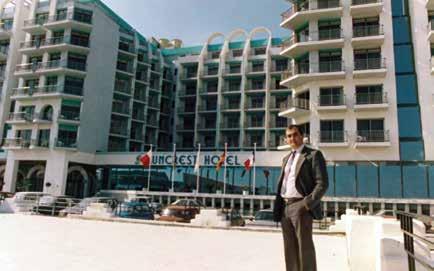
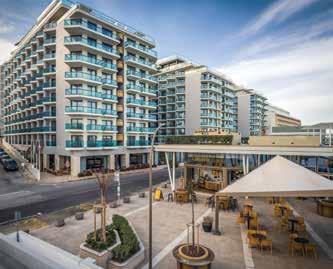

Architect and structural engineer
Dr Konrad Xuereb believes the answer to Malta’s worsening traffic crisis lies in a nationally backed underground metro system that could transform how the island moves, works and breathes. Dean Muscat speaks with Dr Xuereb about the vision, the research and the roadblocks standing in the way of Malta’s metro future.

MALTA’S TRAFFIC PROBLEM HAS BEEN ONE OF THOSE TOPICS THAT’S REFUSED TO LEAVE THE NATIONAL CONVERSATION. For years, we’ve widened roads, built new flyovers and rerouted lanes, yet somehow, the jams keep growing. What used to be a quick ten-minute drive has morphed into a never-ending daily crawl. In many localities, parking feels like winning a golden ticket. Grimmer still are the rising tempers on the road and fatalities which have become almost monthly occurrences.
For all the plans and promises, real progress has been limited. And the hard truth is there is only so much that can be done when Malta lacks a reliable, large-scale alternative to cars. Without it, the island’s roads will keep bearing the brunt of a growing population and increasing vehicle numbers.
It’s this growing reality that has prompted architect and structural engineer Dr Konrad Xuereb to think outside (or, perhaps more accurately, beneath) the box. After spending more than two decades
“If we build underground and reduce car use, you can start pedestrianising places like Mosta, Zejtun and Tarxien, returning these areas to the people.”

in the UK working on major infrastructure and transport projects, he returned to Malta to find congestion at an all-time high. But what puzzled him most was that other countries had tackled similar problems decades ago – so why not Malta?
“Malta is jammed,” Dr Xuereb begins, unequivocally. “A typical eight-kilometre commute can take nearly an hour. Every day, around 40 new cars are added to our roads. It’s mind-boggling that we still have no mass transport system.”
Reflecting on Malta’s recent transport initiatives, Dr Xuereb is quick to acknowledge the efforts made, but just as quick to point out their limits. Widening roads, he argues, is a temporary fix that gives the illusion of progress. “It just lets cars go faster for a short stretch,” he explains, “only to get stuck again further down the route.”
And while Government’s recent scheme, which offers money to people willing to give up their driving licence, is another well-intentioned measure, he says, it’s still another half-step. Without a proper, efficient alternative to cars in place, people are left with little choice but to rely on ridehailing services and taxis.
“Without a macro solution, such measures can actually backfire,” he cautions, “because people will start to doubt the motive behind them.”
It’s this short-term mindset that Dr Xuereb hopes to challenge with something far more transformative. He and his team are proposing an underground metro system designed to serve Malta’s busiest urban centres, covering around 70 to 80 per cent of the population and main tourist areas. And when he talks about large-scale infrastructure, Dr Xuereb knows what he’s talking about – given his


career includes infrastructure projects which create urban links and regenerate communities, including several award-winning pedestrian bridges across the UK and Italy.
“Setting up a metro system in Malta seems like such a clear solution that I assumed there must be a good reason why we haven’t started work on it yet. And the more my team and I researched it, the more we found this project to be feasible. It’s doable, with quite conservative figures of population and tourists.”
The metro system that Dr Xuereb and his team are proposing is designed to carry a ridership of about 60 million passengers per year, assuming only one in four residents and tourists use it. Financially, the proposal is self-sustaining, with fares averaging €2 per trip, capped at €5 per day, while additional revenue from retail and commercial leasing within stations would bring total annual income to roughly €300 million. Dr Xuereb also estimates that once operational, the metro would cut the number of cars on the road by at least one-third, easing congestion and reducing emissions.
What’s striking about Dr Xuereb’s proposal is that it’s not some distant dream or futuristic concept. With the right backing, the first phase could be up and running within five years, once all the necessary studies are completed. “It’s not blue-sky thinking,” he says. “Our figures are based on actual tunnelling rates using twinbore tunnel machines used worldwide.”
The construction method he describes is both tried and tested. The process involves two tunnel-boring machines that dig
“The main stumbling block is political will. With governments changing every few years, there’s always the fear that a project of this scale would go beyond a single term.”
underground while simultaneously lining the tunnel walls with reinforced concrete rings. This approach, he explains, doesn’t disturb the water table or create structural risks for buildings above ground. “It’s what’s done in London,” he adds. “And their ground conditions are far more complex than ours, yet it works beautifully there.”
The first phase, which Dr Xuereb denotes as the Red Line in his proposals, would form the backbone of the network. It would stretch 25 kilometres, covering 13 stations from Mellieha to the airport, passing through key towns including St Paul’s Bay, St Julian’s, Sliema, the University, Valletta, and Paola. For the average commuter, this would mean a ten-minute journey from Sliema to the airport – a fraction of the time it currently takes by car.
Once complete, Phase Two (the Blue Line) would add a circular route linking Malta’s other main residential and commercial hubs, from the airport to Mriehel, Birkirkara, Mosta, and back to St Paul’s Bay, ensuring better connectivity across the island. Finally, Phase Three (the Green Line) could potentially see the system extend to Gozo. In that scenario, the full route from Malta’s airport to Victoria would take just 32 minutes, with trains running every five minutes.
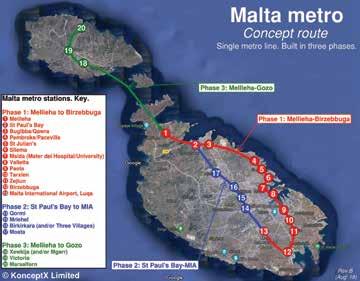
“Malta’s
underground metro will happen, 100 per cent The only question is when, and who will be the statesman or stateswoman with the vision to push it through.”
Beyond easing congestion, Dr Xuereb believes the metro would mark a transformative shift toward a cleaner, more connected Malta – one where perceived challenges can become genuine opportunities with the right planning and foresight.
Take the excavation waste created during construction, as one example. “The excavation waste from tunnel boring will be significant, but it is mostly inert, meaning it is not contaminated,” he explains. “That means we could use that waste for land reclamation, creating a new nature reserve near Hal Far, for example, complemented by solar panels feeding energy back into the metro system.”

Furthermore, by reducing car dependency, Malta could finally reclaim its streets. “If we build underground and reduce car use, you can start pedestrianising places like Mosta, Zejtun and Tarxien, returning these areas to people through spaces where children can walk safely, families can stroll without traffic noise and pollution, and tourists can truly appreciate Malta’s architecture and heritage,” Dr Xuereb adds.
And for anyone sceptical about whether such a system could work on an island as small as Malta, he points to several small European cities with metro systems as proof.
“Lausanne in Switzerland has a population of only 150,000, but one metro line with 14 kilometres and 28 stations serves 41 million riders a year. While the city of Rennes in France, with about 230,000 residents, has 15 stations and 51 million annual riders.” He puts it simply: “If these smaller cities can do it, surely Malta can too.”
So, given that this metro proposal feels like such a nobrainer, what’s keeping it stuck in a national gridlock? According to Dr Xuereb, the answer lies less in engineering and more in partisan politics.
“The main stumbling block is political will,” he admits. “With governments changing every few years, there’s always the fear that a project of this scale would go beyond a single term. That’s why it needs to become a national bill, something above politics. Once it’s a bill, it becomes a national commitment. That’s how major infrastructure projects succeed elsewhere.”
Still, he’s far from cynical. “Malta’s underground metro will happen, 100 per cent,” he says with conviction. “The only question is when, and who will be the statesman or stateswoman with the vision to push it through. Young people are always the catalysts for change. I believe that once they see real vision and real commitment, they’ll get behind this project and help propel Malta toward a quality-driven, sustainable future.”
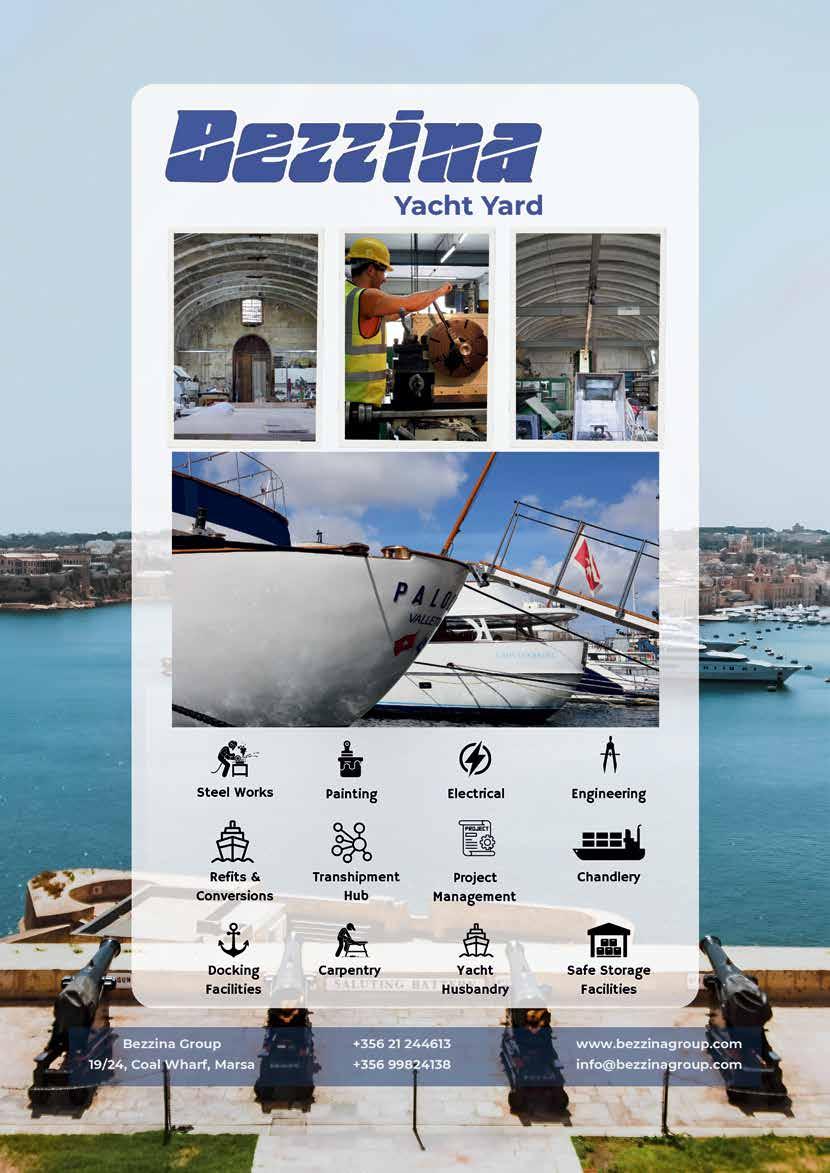
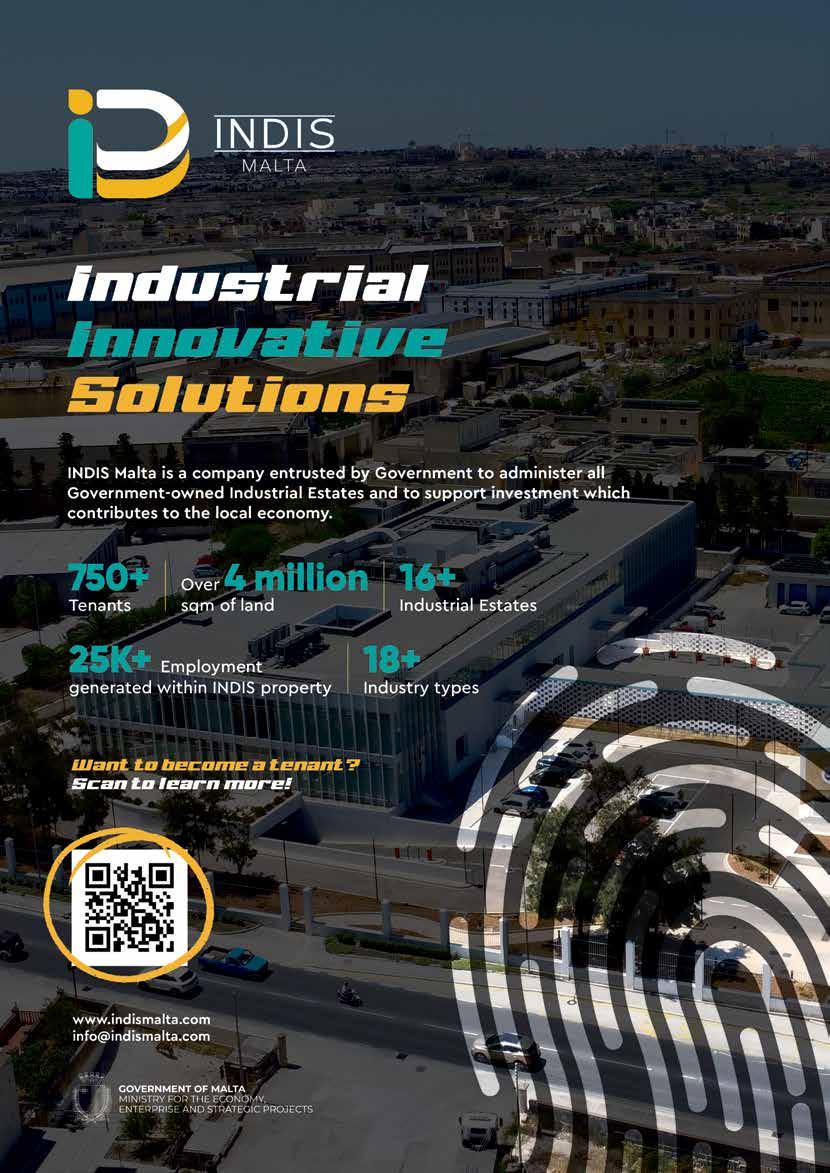
Located within The Brewhouse, the restored former Farsons Brewery, The Grist and Redler Room offer two unique spaces for all types of events. Both venues are fully accessible and supported by The Brewhouse’s in-house catering and events team, providing seamless experiences for corporate and private events.

The Grist – Flexible and spacious for a variety of events
The Grist is a 300sqm space that can be adapted for workshops, seminars, private parties or cultural events. Featuring restored original equipment with vibrant touches of red, The Grist offers a distinctive setting that adds character to every event.
Capacity:
• Theatre style: up to 120
• Cabaret: 70
• Standing: over 150
Highlights:
• The open layout makes it easy to adjust seating and arrangements for different event types
• Full AV equipment for presentations
• Flexible F&B packages available at different price ranges
Recently, The Grist hosted an art exhibition, showing how well the space can accommodate creative events.
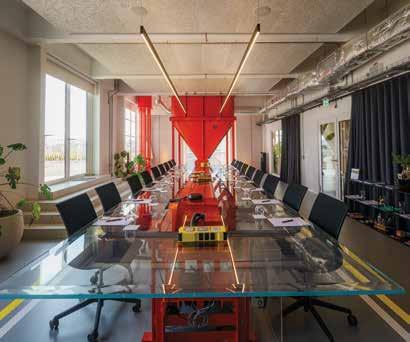
Redler Room – Intimate meetings with a touch of history
The Redler Room is ideal for smaller gatherings, such as board meetings, presentations or conferences. The room features original restored brewery equipment as part of the table, giving the space a distinctive character.
Capacity:
• Seats 20 comfortably
• Standing: 60
Highlights:
• Free refreshments included
• Open terrace with optional bar set-up for networking or breaks
• Full AV equipment for presentations
• Flexible F&B packages available at different price ranges
The Redler Room combines a professional setting with a unique atmosphere, and the terrace adds extra space for informal conversations.
For events that leave a lasting impression, both The Grist and Redler Room offer flexible layouts, modern facilities and a setting that reflects The Brewhouse’s rich history.
The Cini family, much loved guardians of Gozo’s white gold, have been tending to their salt pans for at least five generations, as visitors flock to their iconic cave shop overlooking the vast Mediterranean, to buy their uniquely authentic sea salt. Edward Bonello pays them a visit.
ON A SUN-DRENCHED STRETCH OF GOZITAN COAST, WHERE THE ROCK SHELVES OUT INTO HONEYCOMB-LIKE POOLS, THE SEA LEAVES BEHIND ONE OF MALTA’S OLDEST TREASURES, SEA SALT. At Xwejni, further in from Marsalforn, the Cini family has been coaxing the white gold from the Mediterranean for at least five generations, with a passion that brings heritage and business acumen together in a rare balance.
Josephine Xuereb, née Cini, 55, who currently manages the salt pans, explains the ancient trade, and how it has obtained new relevance in today’s unlikely landscape.
“The smell of the sea keeps me young,” smiles Josephine, as she reflects on how the salt pans have grown to define her. “Together with the rest of my family, we are referred to
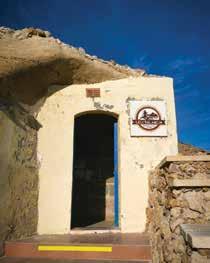
as ‘tal-melħ’, which pretty much sums up how this coast and our trade have become our identity,” she explains. Same with her father Leli, 82, who is officially retired, yet his passion for the salt pans scarcely allows him to venture too far, as his watchful eye still lingers over the craft he inherited from his own ancestors.
In the cool shade of the family’s stone-carved cave – part store, part workshop, part living archive – Josephine explains how this tiny, fiercely artisanal operation has resisted the tides of mass commercialisation.
“We can trace our salt-making history at least as far back as 1848, the year engraved on one of the walls of the cave. Next to the numerals is a tally, lines scratched into the rock, marking how many mounds of salt our forefathers would have collected that summer.”
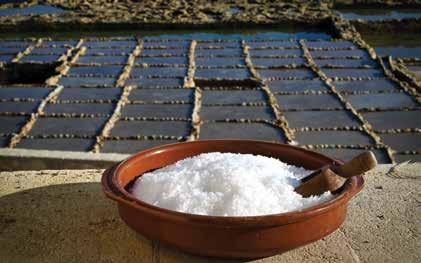


Beyond the chisel marks lie untold decades, however. Local lore says the family was already tending the pans long before those primitive records began, as proof of the importance of salt in everyday lives goes back to ancient times. “At least five generations. My great-grandfather was definitely here. It’s possible we go back further still,” Josephine smiles.
Salt harvesting here remains strikingly manual. Each summer, as soon as the UV readings start to rise in June, the Cinis begin a seven-day cycle that runs until September. Sea water is pumped into an ancient network of channels carved into the coastal rock. In turn, these channels feed shallow basins, where the intense Mediterranean sun evaporates all the water in under a week, leaving pure, glistening salt behind.
“Before electricity, everything was done by hand. Filling the pans would take hundreds of buckets which would have to be filled from the larger feeder cisterns, every week for the whole duration of summer,” Josephine notes.
When the water finally evaporates, leaving the salt behind, the family rakes the crystals into small mounds, later combined into larger ones before being carted into the cave for drying and storage.
Every grain is inspected by Josephine herself, she notes with pride. “I check every last granule of salt manually, to make sure that our product is free from any particles of seaweed, or dust, or any other flying debris from the nearby agricultural lands. It is a great passion, but it is also an art. You need the right technique when scraping the salt from the pans, and when collecting it. So far, we have managed to retain all labour in house, and we intend to keep it that way.”
A good summer can yield anywhere between seven to 12 tonnes of salt. Winter, by contrast, is when the pans rest, in preparation for next season.
Combined with the minerals absorbed from Gozo’s limestone rock, the salt found here is prized for its clean, mineral-bright flavour.
“Our customers love that it’s literally zero-kilometre. When you hold a bag of our salt in your hand, you know exactly where that salt came from. It’s right there, 30 metres away,” Josephine quips.
“Together with the rest of my family, we are referred to as ‘tal-melħ’, which pretty much sums up how this coast and our trade have become our identity.”

Over time, the family have developed and built a premium brand around their esteemed fare. The salt is entirely additivefree and certified organic since 2025; a milestone Josephine is proud to point out. Its crisp branded packaging has also become a guarantee of quality. The rustic sack packaging is more popular with tourists seeking to take home with them something authentically Maltese.
This sense of branding owes much to Josephine’s father, who in the 1970s, when Maltese families still bought most groceries by weight, had a visionary idea. In fact, Leli decided to start selling pre-packaged, branded salt in plastic bags from the back of his now-legendary Land Rover. “He was the first to do it in Gozo,” Josephine explains. “Thanks to him, ours became the only salt you could buy in shops back then – the beginning of a recognisable and trusted brand.”
Life beside the sea brings both serenity and unpredictability. Josephine recalls one devastating day when a sudden squall swept an entire week’s harvest away. “We had been working all week, and the salt was collected in one big mound ready for storage. Suddenly, black clouds started to gather over the horizon, and the sea grew rougher and rougher by the minute. In a blink, a huge wave leapt over the rocks and stole our week’s work from under our eyes, leaving us aghast and speechless. We stood there, helpless and amazed. Heartbreaking, but it was a great reminder that nature is always boss. The sea gives, and the sea takes,” Josephine reflects philosophically.

During the COVID-19 lockdowns, on the other hand, while the rest of the world was struggling with all sorts of issues, the Ta’ Xwejni salt pans where an unexpected slice of heaven. “While everyone was stuck indoors, we were out here in the sun, collecting salt – hardly affected at all. It did, however, teach us to appreciate the important things in life, and we felt very blessed.”
“Melħfil-għar,flusid-dar,(salt in the cave is money at home), the old adage goes,” Josephine adds. “For many generations, salt was not just a flavouring but a highly precious commodity, even a form of currency. The Romans paid their legionaries in salt. That’s where the word salary comes from.”
Interestingly, Josephine didn’t always plan to follow the family’s path to the pans. She studied languages – French and German – imagining a different future.
“I had completely different plans,” she admits, “but the sea has a way of calling you back. One summer I helped my parents, and I was hooked. The beauty, the purpose and the interested visitors who are so enthused by the entire operation, were incredibly engaging for me. Today, it is who I am.”
Her language skills help her welcome a cosmopolitan mix of visitors as she increasingly collaborates with DMCs and other tourism operators to create authentic, high-quality experiences for visitors. She’s also part of Sea Salt Europe, a network connecting traditional salt makers across the continent.
“Before electricity, everything was done by hand. Filling the pans would take hundreds of buckets which would have to be filled from the larger feeder cisterns, every week for the whole duration of summer.”


Still, Josephine wishes more Maltese understood the labour and artistry behind each bag. “If people knew how much hard work and care goes into each bag of salt, I think they’d value it even more.”
The Cinis walk a careful line between heritage and keeping the craft sustainable. Organic certification, sleek understated packaging and a curated visitor experience help secure the pans’ future without sacrificing authenticity. They sell mostly directly to customers from their iconic sea-view cave shop perched above the Xwejni coastline. But their salt also reaches select shops and restaurants that prize its unique provenance.
Despite the modest scale, demand is strong. Chefs seek its natural texture and depth of flavour, while travellers carry it home as a sense-of-place souvenir. For Josephine, however, it’s less about chasing volume than preserving meaning. “We’re not interested in industrialising,” she says firmly. “This is family work, done with pride.”
In a landscape where businesses tend to be increasingly interested in growth through automation and other efficiency-driven strategies, it is natural for production to overshadow craft. The Cinis’ salt pans, on the other hand, remain a rare counter current.
“Our product may seem a simple condiment, but it carries untold heritage, hard work and passion. Every summer we start again, trusting the sea, the sun and our hands,” Josephine concludes.
“For many generations, salt was not just a flavouring but a highly precious commodity, even a form of currency The Romans paid their legionaries in salt. That’s where the word salary comes from.”
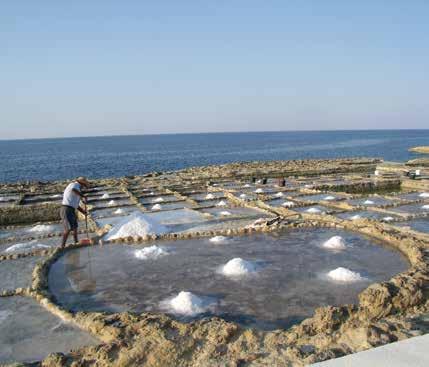
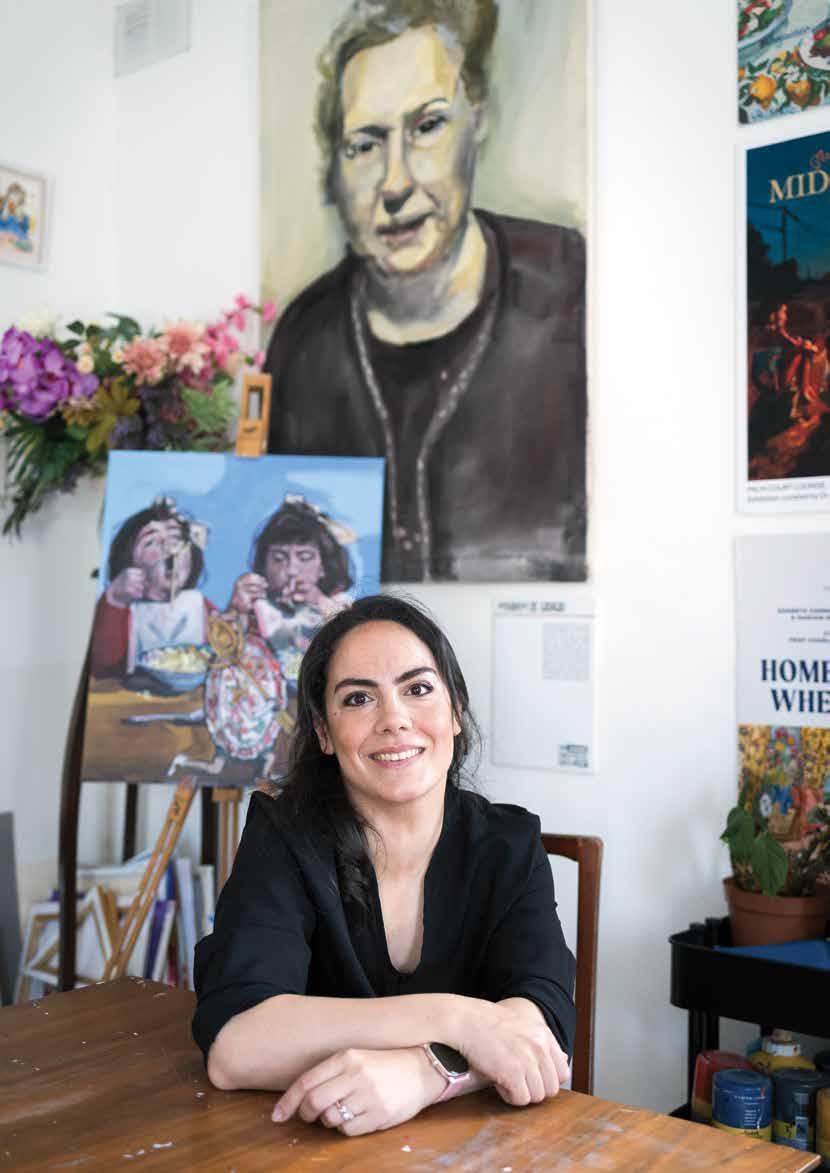
In her Birkirkara studio, Maltese artist Mariam de Giorgio is documenting the quiet drama of family life, transforming fleeting domestic moments into profound meditations on time and memory. Here, she speaks to Sam Vassallo about her thriving professional practice, built on the philosophy that the most resonant stories are found in the everyday.
AS I STEP INTO MARIAM DE GIORGIO’S STUDIO IN BIRKIRKARA, WHAT STRIKES ME FIRST IS THE SENSE THAT HER WORK CONTAINS AS MANY LAYERS OF MEANING AS PAINT. The air smells of linseed oil and beeswax, with shafts of Maltese sunlight cutting through the dust motes to land on canvases propped against the walls – some finished, others half-born, their surfaces alive with the quiet drama of domestic life. A child’s foot dangling off a sofa. A kitchen counter cluttered with flourdusted fish and cherry tomatoes. A sun-bleached rooftop where the family gathered on one particular Easter Sunday, the world still blissfully unaware of the pandemic looming on the horizon. Her palette is striking yet muted, colours softened as if by memory: the faded blue of a school uniform, the warm ochre of an old house’s walls, the blushpink of a seashell cradled in a child’s palm.
Mariam greets me with the warmth of someone who has learned to balance the demands of art and motherhood – five children, a husband deep in his PhD studies and a home that hums with creative entropy. Her studio, a converted room upstairs, is a sanctuary of controlled chaos. Sketches spill from drawers, tubes of paint huddle like soldiers on a windowsill, and a large
wooden desk bears the scars of a thousand brushstrokes. “This is where the magic happens,” she says with a laugh, nudging aside a stack of illustrated children’s books – a nod to her academic focus on Fine Arts. As we settle in, I understand quickly that her art is more than a surface-level depiction of domesticity. It is a meditation on time, memory and the fleeting innocence of childhood – a theme that pulses through our conversation like a second heartbeat.
“I’m inspired by the mundane,” Mariam admits, cradling a cup of coffee in her hands. The steam curls around her fingers, dotted with flecks of dried paint – tiny badges of her trade. “The daily things we overlook like brushing teeth before bed, a child collapsing onto the sofa after school, spaghetti stains on a dinner plate.” She gestures to a nearby painting, a snapshot of her daughter asleep mid-afternoon, socks discarded, backpack abandoned in a heap. The composition is effortless, the light catching the curve of the girl’s cheek, the rumpled fabric of her school dress. “That was the perfect shot. It’s not posed. It’s life, stolen before it slips away.”

Her process is organic, almost accidental. She documents moments with her phone, a tool as vital
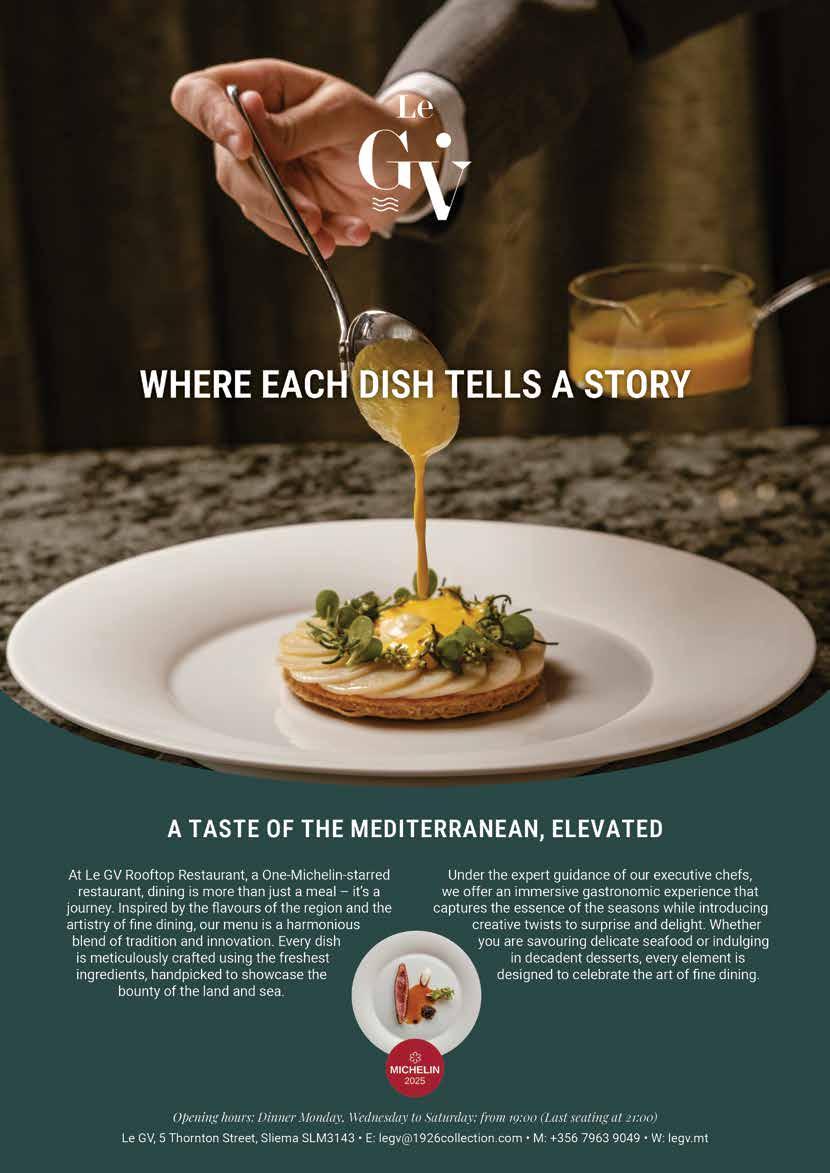

as her brushes. “I don’t always intend to paint what I capture,” she explains. “But when I look back, I see a story waiting to be told.” The stories are intimate: a family’s move from their grandmother’s house to their own, the evolution of a living room sofa over a decade, the quiet rituals of bedtime that frayed at the edges as the children grew. Her work feels like flipping through a diary, one where the entries were painted in strokes that blurred the line between realism and dream. A still life of a lampuka fish (a local delicacy) mid-preparation, dusted with flour and surrounded by capers, became a portrait of familial love. “The viewer can imagine the hands that cooked it, the voices around the table,” she says. “That’s what I want – to pull people into the life of the painting.”
Mariam’s fascination with childhood is palpable. “My work portrays the child in me,” she says, her voice softening. “I crave that innocence, that joy in discovery.” Her own childhood was


unconventional. Raised in a devout Catholic family, she spent her early years in the Philippines as part of her parents’ missionary work. “It was a world of seashells and unfamiliar skies,” she recalls. “I remember the heat, the colours, the way the light hit the water differently there. I think that’s why I’m drawn to the extraordinary in the ordinary now.”
Now, as a mother, she revisits that wonder through her children. “They’re my vessel,” she muses, pulling out a sketchbook filled with quick studies of her kids drawing, eating, sleeping, their limbs tangled in unselfconscious grace. “They do things like play with their fingers, laugh at nothing and I think, ‘I used to do that’. But now I see it differently. They’re teaching me to appreciate moments I once took for granted.” Her paintings capture this duality: the child’s unselfconscious joy and the adult’s nostalgic lens. A portrait of her son eating spaghetti, his face smeared with sauce, is more than a cute scene; it’s a meditation on time’s passage. “One day, he’ll be grown, and I’ll have this,” she says, touching the canvas lightly. “That’s the gift of painting – it’s a way to hold onto what refuses to stay still.”
“I’m inspired by the mundane. The daily things we overlook like brushing teeth before bed, a child collapsing onto the sofa after school, spaghetti stains on a dinner plate.”

“It’s not posed. It’s life, stolen before it slips away.”
Though her work is rooted in realism, whimsy seeps in at the edges. A teacup might float mid-air; a family barbecue in Comino, the sea glittering behind them, bent into a dreamlike haze as if viewed through heatwaves. She cites influences like René Cloque, the illustrator of Enid Blyton’s stories, and Matisse, whose playful interiors resonate with her. “I love surrealism,” she admits, pulling out an older piece – a chaotic, collage-like scene of her younger self, overwhelmed by motherhood. The figure (herself, rounder and frazzled) stood in a kitchen drowning in clutter, trying to feed children while pots boiled over. “This was unorthodox for me. I started painting, hated the proportions, cut it up, and glued it to a larger paper. Then I added pencil, ink, even my kids’ crayons.” She grins. “I wasn’t afraid to mix mediums. Art shouldn’t be polite.”
The result is tactile, alive. Her signature – a bold, calligraphic flourish – often appears in contrasting colours, a nod to her love of typography. “I mimicked typewriter fonts as a girl,” she laughs, showing me a wedding invitation she’d designed with looping, vintage-inspired script. “Now my handwriting looks like one. Funny how these things stick.”
Mariam’s creative process is anything but rigid. “I’m my own boss,” she says with a shrug. “Some days, I’m too tired to paint. Other days, I work until 2am.” She thrives under pressure, recalling a recent solo exhibition Midsummer, where she produced 30 works in a month. “Four paintings in a day!” she exclaims, shaking her head. “It was like a factory. But deadlines force me to focus.” She describes the adrenaline of last-minute commissions – like the time a client begged for a gift portrait in four days. “I said yes, even though I knew I’d be sleepless. There’s something about the panic that sharpens me.”

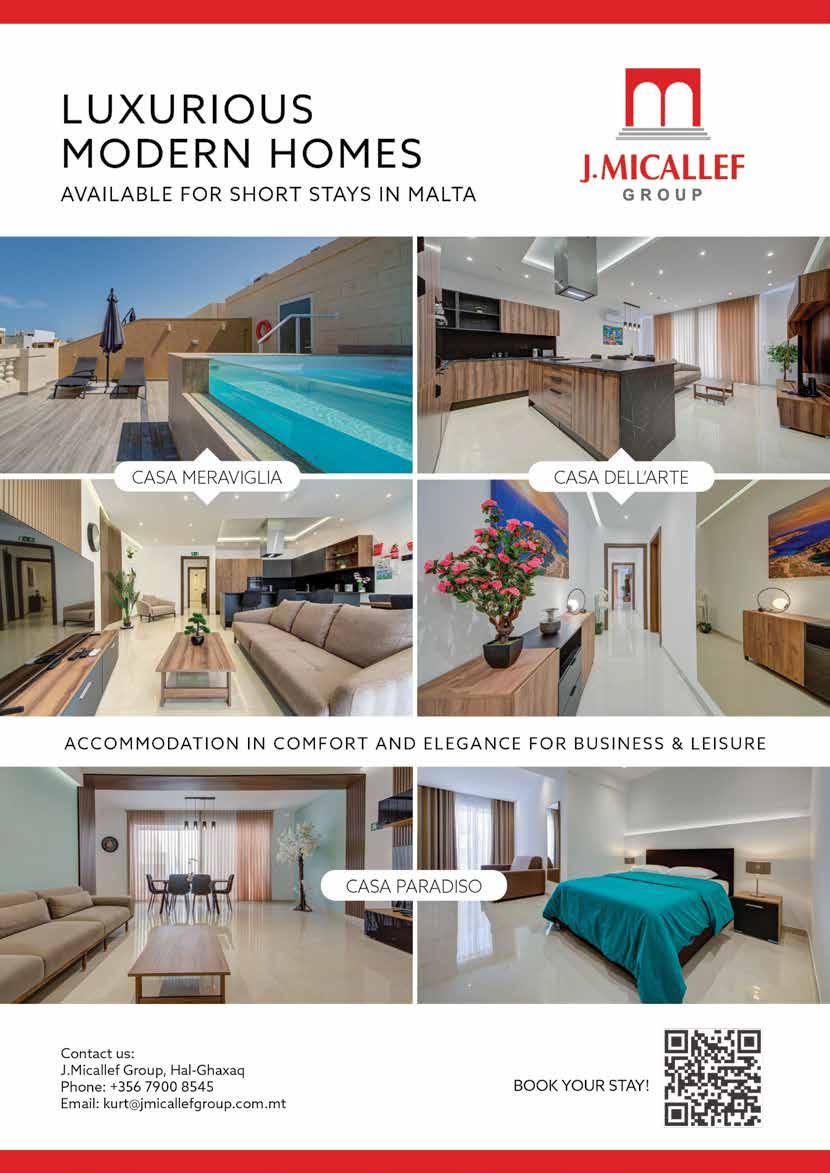

Commissions, however, are a double-edged sword. “People want portraits – children, usually. But I refuse flat, posed things.” She prefers candid scenes: kids from the back, watching the sea; a messy kitchen alive with movement. “I need to feel a connection. Otherwise, it’s just… depressing.” She pauses, then adds with a wry smile, “though I’ll admit, I sneak in my own style. A pop of unexpected colour, a hidden detail. It’s my little rebellion.”
As we wander through her home – past her sunlit studio where her bird chirps in its cage, a cluttered “mess-allowed” room for the kids (“They’re banned from paints, though – too stressful!”), and a hallway lined with exhibition posters – reveals how deeply her art and life intertwine. Her paintings are not just observations; they are conversations with time. A hotel in Comino stood untouched in one painting, then vanished in the next, replaced by construction cranes. “It’s all about life-changing situations,” she says. Even her thesis work – a study of Alice in Wonderland’s Mad Hatter’s tea party reimagined across artistic eras – speaks to her fascination with shifting perspectives.
Before I leave, Mariam shows me one last piece: an illustration for a recent exhibition, a whimsical nod to parenthood’s chaos. “This was me years ago,” she says, pointing to a frazzled figure in a cluttered kitchen. “Overweight, overwhelmed. But look – here’s beauty in the mess.” And that, perhaps, is the heart of her work. In Mariam de Giorgio’s world, the mundane is monumental, childhood is a language, and every brushstroke is a whisper: Look closer. This is life.

“I wasn’t afraid to mix mediums Art shouldn’t be polite.”


